#MPW subtitle corrections
Text
The Importance of Amae in My Personal Weatherman
Masterlist || Language Analysis Part 1
I have seen a lot of discourse in the English-speaking fandom surrounding Segasaki's apparent dismissal or trivializing of Yoh's desire to pursue his manga, and most of it is negative. His comments about wanting Yoh to remain dependent on him, or that Yoh does not need to earn money are seen as patronizing or controlling at best and oppressive at worst. It appears that Segasaki does not understand nor respect Yoh's need for independence, and that is what strains their relationship.
But what if I asked you to consider that Segasaki's behaviour is actually an invitation to Yoh to reinforce their relationship? And what if I told you that Yoh's withdrawal from Segasaki constitutes a rejection of that invitation, and it is that rejection that strains their relationship instead?
Of course, the end result is the same - a strained relationship - and in reality there is never one side wholly responsible for this. The point of this is to simply challenge the cultural notion that a successful relationship is the coming together of two equally independent individuals, as opposed to the co-creation of a relationship formed by two interdependent individuals.
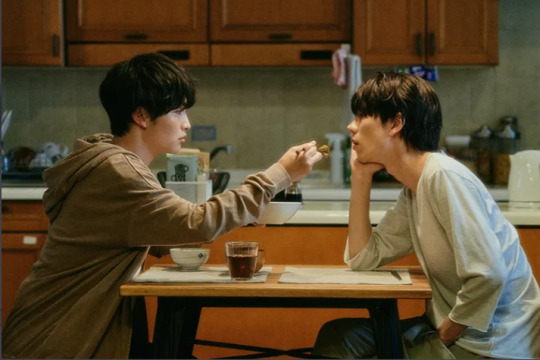
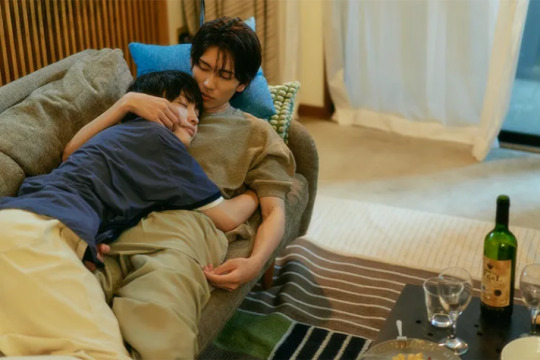
"If only you could stay drunk forever..."
"It's okay to feel down again for me too you know"
- Segasaki, Ep 4, Ep 5
This isn't about Segasaki wanting to keep Yoh is helpless and dependent on him, but about wanting Yoh to be able to be true to his feelings and express his own desire for affection honestly, without having to hide behind "I hate you" or rejection.
Or, let's try and talk about how Segasaki and Yoh reinforce their relationship through the use of amae (featuring a brief mention of tatemae/honne) who am I kidding this is not brief at all
First: Cultural Context
The way people conceptualize and make meaning of the Self differs between Western and East Asian cultures, and this plays into the differences we see in the basis for our self-esteem, the personal attributes that we value, and even what constitutes the behavior of a mature individual. Broadly speaking, Western cultures tend towards the Independent Self Construal (whereby the Self is a distinct entity separate from others) whereas East Asian cultures tend towards Interdependent Self-Construal (whereby the Self is connected to and defined by relationships with others). Thus, in the West, expressing one's individuality is very important for one's self-esteem, and being able to communicate clearly and confidently is valued and a sign of maturity. Conversely, in the East, one's ability to integrate and become a member of the group is prized, and contributes significantly to one's self esteem. In order to be seen as a mature individual, one must learn not only to read a social situation but also how to modify one's behavior in order to respond to the changing demands of that situation, with the ultimate goal being to maintain group harmony.
tl;dr - In East Asian culture, behaviors and attitudes that emphasize interdependence and promote group harmony actually play a big role in reinforcing relationships and one's membership towards the group.
Segasaki is an expert at this - his "public mode" that Yoh refers to actually shows us how good he is at social interactions. This is the Japanese concept of tatemae/honne (crudely translated as public self/private feelings) - which I could link to a bunch of articles for you, but I'm going to suggest you check out this 9 min street interview instead. At 6:41, one of the interviewees comments that another is sunao, or "honest" (we'll cover this later too) and at 6:49 specifically talks about how reading situations is important as an adult. Segasaki reads the room well, but most importantly, he reads Yoh well.
Yoh is not good at this, at all. In Ep 6, we see that he does not integrate well with the group, and he doesn't realize how he might appear to others when he stares and sketches from afar. Yoh does not read the room well because he doesn't pick up on social cues and does not adhere to social norms (I'll point these out in Ep 6's corrections). He cannot read Segasaki, and especially cannot read Segasaki's amae, or his attempts at reinforcing their relationship. Part of this is because his low self-esteem causes him to withdraw from Segasaki's affection as a means of self-protection, and so he valiantly tries to deny his feelings for Segasaki. As Man-san commented in Ep 4, Yoh is not sunao - he has difficulty with being true/honest about his feelings, even to himself.
Sunao is another term that usually pops up when talking about feelings/relationships. It can be used to describe one's relationship with oneself, as well as the relationship with another/group. With oneself, it is usually used to mean "being honest/truthful/straightforward/frank/open-minded about one's feelings". With another person/group, it is usually used to mean "to cooperate/listen/be obedient, or "to be humble/open-minded". In essence, the word encompasses an ideal virtue that is often taught from early childhood - that we should treat both ourselves and others with humility and honesty, because that is how we accept ourselves and stay in harmony with other. This is what becoming an adult, or gaining maturity, means (not gaining independence, as adulthood is often equated to in the West - do you see a running theme here 😂). Of course, that's actually really hard to do, so you'll often hear children (and immature adults too) chided for "not being sunao" (this can therefore sound patronizing if you're not careful). We'll revisit this in a little bit.
Second: What is Amae?
Amae is a key component in Japanese relationships, both intimate and non-intimate. It happens every day, in a variety of different interactions, between a variety of different people. But it is often seen as strange or weird, and those unfamiliar with the concept can feel uncomfortable with it. This stems from the difference in self-construal - because independence is tied so strongly to an individual's self-image in the West, it is very hard to fathom why behavior that emphasizes interdependence could be looked upon favorably. It is telling that every possible English translation of the word "amae" carries a negative connotation, when in Japanese it can be both negative or positive. The original subtitles translated it as "clingy", for example. Other common translations include "dependence", "to act like a child/infant", "to act helpless", "to act spoiled", "coquettish", "seeking indulgence", "being naive" etc.
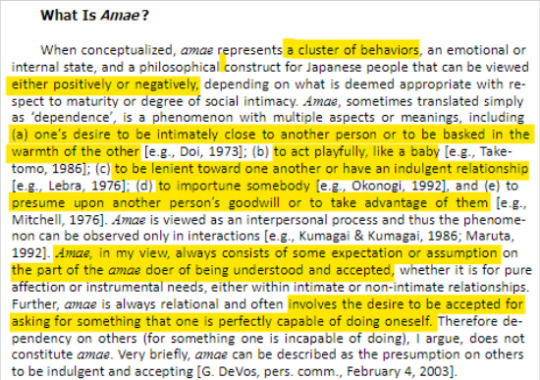
From A Multifaceted View of the Concept of Amae: Reconsidering the Indigenous Japanese Concept of Relatedness by Kazuko Y Behrens
*Note - the word "presumed" or "presumption" or "expectation" or "assumption" used in the above definition and in the rest of this post, can give the impression that all of amae is premeditated, which adds a calculative component to this concept. Whilst amae can indeed be used in a manipulative manner (benign or otherwise), it is not the case for every single situation, and often amae that seeks affection is often spontaneous and without thought, precisely because the situation allows for it to appear organically. This is the amae that Segasaki and Yoh most often exchange - so think of these assumptions and expectations as "unconscious/subconscious" thought processes.
Third: Amae Between Segasaki and Yoh
Yoh shows a lot of amae when he is drunk:


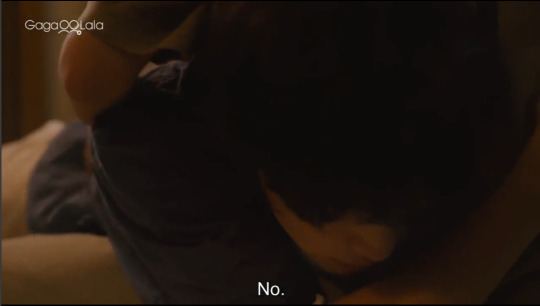
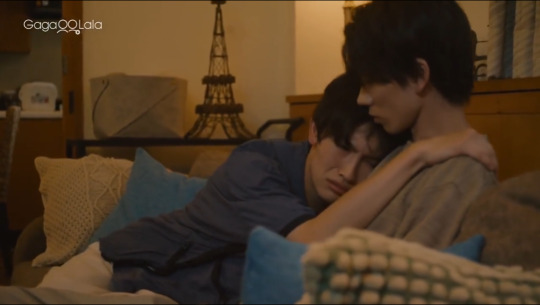
He whines, buries himself into Segasaki's embrace, refuses to move or let go of him, and keeps repeating "no". In these interactions, Yoh wants Segasaki's affection, but instead of asking, he does, well, this, and he presumes that Segasaki will indulge his behavior. Leaving to get some fresh air might not be as obvious - but it is a form of amae as well, because Man-san is his guest, not Segasaki's, and he shouldn't be leaving Segasaki to entertain her. The expectation that this is okay, and that neither of them will fault him for it, is what makes it amae.
Segasaki obviously enjoys indulging Yoh when Yoh does amae, because he recognises this as Yoh's request for affection from him. It's not that Segasaki enjoys Yoh in this drunk, helpless state; it's not even that Segasaki feels reassured by Yoh's requests for affection. Segasaki knows Yoh likes him, and recognizes that Yoh is struggling with those feelings. That Yoh is actually able to do amae to Segasaki is what delights him the most, because it is something that requires a lot of trust in Segasaki and a willingness to be vulnerable in front of him. This is how amae reinforces relationships - when a request for amae is granted, both the giver and the receiver experience pleasant feelings.
That said, an amae request can also be perceived negatively - if amae is excessive, or if the person responding feels they are obligated to do so. In Ep 5, Man-san chides Yoh for his amae - the fact that he expected to do well from the beginning, and became upset when he failed. He told her about his unemployment, presuming that she would comfort him, but alas.
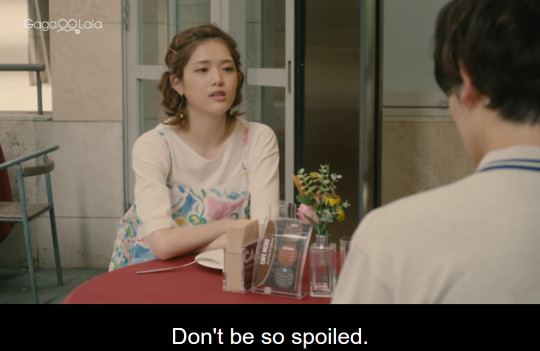
Segasaki also does amae - but unfortunately Yoh misses many of his cues, and so neither of them really gain pleasant feelings from the interaction (ok so maybe Segasaki does, but I will argue that is more because Segasaki also enjoys it when Yoh obeys him - see @lutawolf's posts for the D/s perspective on this!).
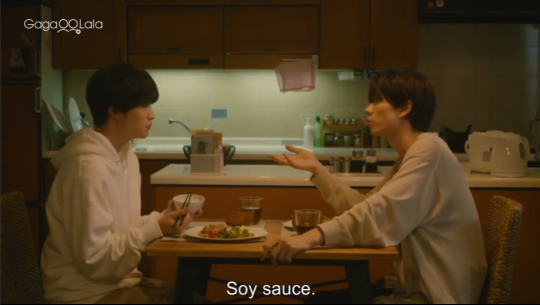


Did you catch it? Segasaki wants Yoh to pass him the Soy Sauce, which, clearly, he is capable of getting himself. He tells Yoh to feed him, because he wants Yoh's affection. And the real kicker - he asked for curry, and expected Yoh to know he wanted pork. In all these interactions, Segasaki presumes that Yoh will indulge him and do for him things he can do himself perfectly well (and even better at that) - this is what makes this amae. But look at Yoh's reactions:

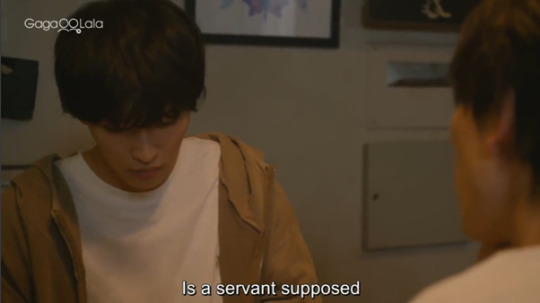
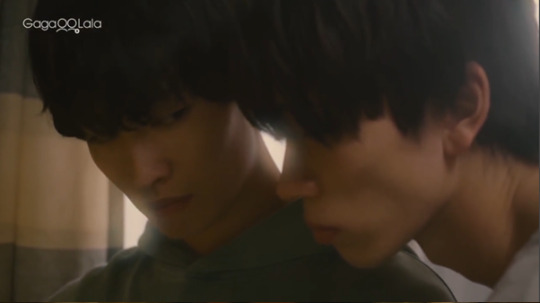
Yoh just stares between the Soy Sauce and Segasaki, between Segasaki and his food, and then just at Segasaki himself. He doesn't recognise any of this as amae, and in the case of feeding Segasaki makes the conclusion that this is somehow a new slave duty he's acquired. And therefore, he does not gain pleasant feelings from it.
In Ep 3 we see a turning point in Yoh's behaviour - his first (sober) attempt at amae (the argument in Ep 2 is debatable - it's not amae from Yoh's POV, but Segasaki responds as if it were, with a head pat and a "when you get drunk, you talk a lot don't you?").
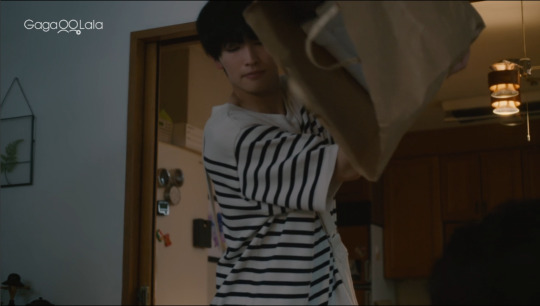
Here, Yoh wants to express his desire for Segasaki's affection, but he can't bring himself to say it aloud. Instead, he dumps bedsheets on Segasaki's lap, as if the bigger the scene he makes the greater the intensity of his desire he can convey. It is the presumption that Segasaki will understand him that makes this amae. And then, we get this:

Not only a happy Segasaki and a sweetly shy Yoh, but also a Yoh who's emboldened by Segasaki's response, and who finally, for the first time, reciprocates touch, and considers the possibility that Segasaki might actually like him.
With every episode, Yoh gets more and more comfortable with doing amae towards Segasaki, because Segasaki picks up on his cues and always responds to them. In Ep 5, Yoh's amae comes out naturally, triggered by the stress of his unemployment, and we see it in all those moments he sounds and acts like a child, and as I mentioned, Segasaki spends the whole episode reassuring Yoh that his amae is welcomed, and that Segasaki likes responding to it. If you've been wondering why the relationship between Segasaki and Yoh can, at times, feel somewhat parental in nature - this is it. It's because Segasaki sees the contradiction between Yoh's childlike insistence that he does not like Segasaki and his desire for Segasaki's attention and affection, for what it really is - Yoh's struggle with accepting himself. When Yoh is able to be sunao, he does amae naturally, and Segasaki responds to him in kind.
Now, all we need is for Yoh to recognize when Segasaki does amae, which will likely happen soon, given that Yoh has grown with every episode.
As always, thank you for reading :))
#my personal weatherman#taikan yohou#体感予報#segasaki x yoh#MPW language analysis#sociolinguistics#japanese language#japanese cultural tidbits#mytranslations#MPW subtitle corrections#my meta is creeping into my sub corrections#need to get it out here instead#sorry for the length#tbh posting such crazy long posts and expecting that people will actually read it#can be considered amae too 🤣🤣#Ep 6 corrections will be out next#I just needed to get this out before 7#and i sorta made it
433 notes
·
View notes
Text
My Personal Weatherman Ep 1 Subtitle Corrections
So I've been analysing the way MPW uses language to showcase the dynamic between Segasaki and Yoh - something that I suspect is not quite coming through with the English subs - and decided to watch Ep 1-3 again, with Eng subs this time. I am now going to complain about some of the subtitle and translation choices and edit them way too literally because I'm nerdy like that.
Disclaimer: Everyone translates differently for different audiences. This is not meant to disrespect the official translation team in any way because they are subbing for a more general audience and have different pressures, so don't come at me or them for our different priorities. I'm talking to the particular group of viewers who like this show and/or like Japanese and want to go a step further in interacting with the characters. That said, I'm happy to discuss MY translation choices so please feel free to drop in about any line.
Under cut because this GOT REALLY LONG.
I'm translating directly from the Jp, so sometimes my subs differ only slightly - I will lean towards a more literal translation here because that will allow me to explain my language analysis better in a follow up post so some phrasing may be awkward. Big changes/missing info have been italicised and bolded. Explanations of nuances/connotations have been added where I feel they add to the understanding of the character/scene, and the relevant phrase is marked with * in my translation and the Jp.
Ep 1

[S: だから、漫画つずけりゃいいじゃんって 衣食住の金は保証してやるから おれんとこに来い。んで、その代わり *俺の言うこと全部聞け]
Original: I said, just keep drawing manga. I’ll take care of your food and lodging *expenses, so come to my place. And in return, you’ll do everything I say.
Mine: I said, *it's fine (for you) to continue (being a) manga (artist). I'll take care of the expenses for your *food, clothing and lodging so, come (live) at my place. And, in exchange for that, (you must) *listen to everything I say.
*This whole paragraph is extremely blunt and direct. Every sentence is worded as an order, and this last line especially - the word "listen" is used here to mean "obey" - so this line really translates to, "in exchange for that, (I want you) to obey my every word". The reason it's not been translated this way is that it sounds so strong it borders on corny in English. In Jp though, the connotation of "obey" comes across not in the words but in the extremely strong/direct delivery of the line (contrasted with the extremely nonchalent tone), so it sounds more shocking/overbearing than it does corny. The original translation here works very well actually.
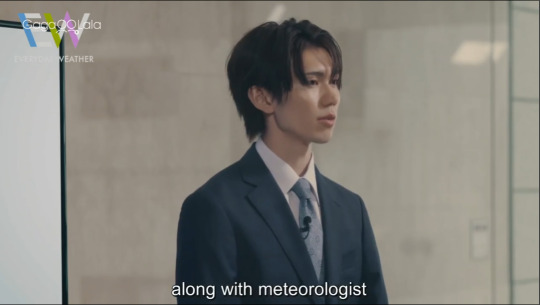
Technically Segasaki introduces himself here as 気象解説員 (weather forecaster) as opposed to 気象予報士 (meteorologist), but in the show's character bios, and when Man-san talks about him later, he's called a meteorologist anyway, so this difference is of absolutely no importance (I'm just anal like that). FYI, in Japan, all qualified meteorologists (who must pass a national exam) can be forecasters, but not all forecasters have this qualification.
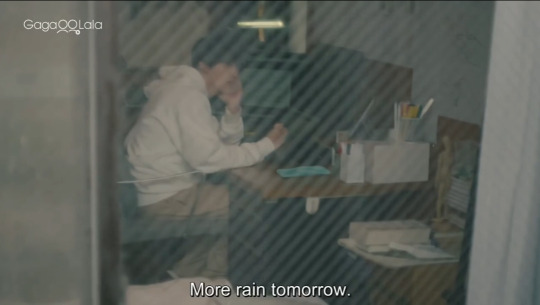
[Y: 明日も雨…か*]
Original: More rain tomorrow
Mine: There'll be rain again tomorrow, huh?
*Said with a falling tone, the "huh" here hints that Yoh is likely a little down/disappointed about the rain continuing, and lays the ground for his reaction later about the rainy season.

[M: 人を沼に召喚しといて 何なの?その態度
S: いや むしろ 万さんがかなり能動的に突っ込んできた印象しかないんだけど
M: ごちゃごちゃうるさい ややこしいオタクめ
S: ごめん ややこしくて]
Original:
M: Why summon someone into your otaku pit and act like that?
Y: No, it’s more like you actively intrude into my life
M: You’re being noisy and complicated, you complicated otaku
Y: Sorry for being complicated…
Mine:
M: (You’re the one who) dragged me into this fandom, (so) what’s with that attitude?
Y: No, on the contrary, I have the distinct impression that it was you, Man-san, who pretty much jumped right in of your own volition
M: (You’re) babbling nonsense (you) troublesome otaku
Y: Sorry for being troublesome

[S: めし なに?
Y: あ、しょーしょうがやき]
Original:
S: What do you want for dinner?
Y: Stir-fried ginger
Mine:
S: What's for dinner?
Y: Sho-shogayaki
Shogayaki is a style of cooking meat, usually pork, where you stir fry the meat with ginger. Unless the type of meat is specified, it refers to Pork Stir Fried with Ginger, or Ginger Pork Stir Fry. Very common home cooked dish.

[S: あ、そ] (A, so?)
S: Oh, is that so?
"I see" is a totally ok translation too. "A, so" can mean "Oh I see" or "Oh is that right" or "Oh is that so" etcetc but it has the air of a really bored "Oh, really?/Sure/If you say so" This is why Yoh's reaction after this is "if you aren't interested then don't ask!". This is the first of many times that Segasaki will use this phrase, as we will see in the following episodes, so I'm highlighting it here for now.
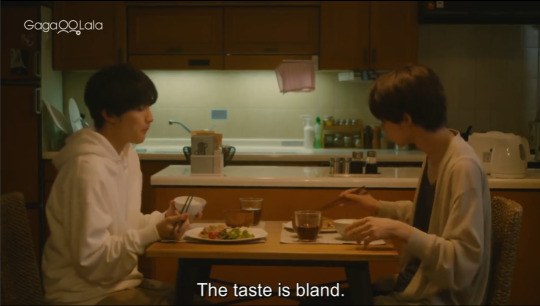
No translation issues here - but I just want to point out that it's reeaaally difficult to make tasteless shogayaki hahaha If you've had ginger stir fried in anything you'll know - it's not a meek herb at all. Canonically, Yoh is apparently a really bad cook. This will be pointed out again later, when he makes curry, because again, it's gotta be some kind of talent to make bland japanese curry; it's r*eeeeaally *easy. Anyway, the sauce that Segasaki asks for here is Soy Sauce, which is different from the sauce that he asks for later! Seems like a few people think they're the same thing (also pay attention to the sauce rack position here - Yoh'll will move it closer to himself by their next dinner hahaha)
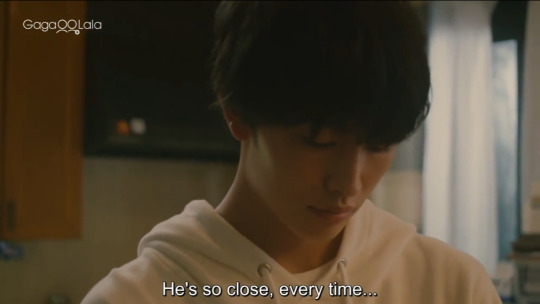
[Y: ちかいんだよ、いちいち*]
Y: He (leans in) so close, every (damn) time*!
*Not sure if this comes across, but the word for "every time" here is usually associated with slight annoyance, but the way "close" is said here implies Yoh's a little bashful about it.
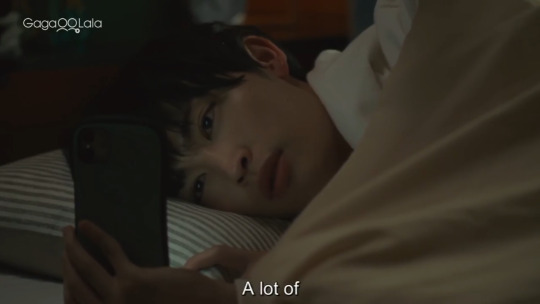
[Y: 雨、多いな*] (ame, ooi *na...)
Y: Rain...so much of it*
*This has the same feel as the "there'll be rain again tomorrow...huh" that we first saw earlier this episode. The ending particle "~na" bakes in a sigh and a sense of disappointment here (if you didn't notice the utter depression on Yoh's face lol)
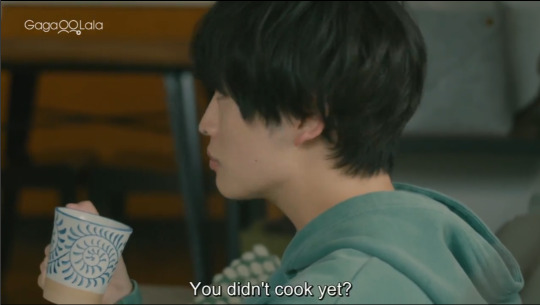
[S: めし、まだ?]
S: Food's not ready yet?
See, you don't notice it with the Eng translations because even the most basic Eng grammar will form a complete sentence. In Jp though, Segasaki is once again taking "man of a few words" to the extreme. He has taken out every single part of the sentence he possibly can whilst still keeping it grammatically complete. So this line is literally just "Food, not yet?". He's done this throughout the episode btw - it's why he comes across as so cold/distant.

[Y: やっぱ わかんねえよな]
Mine: As I thought, he doesn't understand...

[Y: 結局 従ってしまう自分の従順さが憎い*]
Original: I hate my obedience, always giving in
Mine: In the end, the obedient part of me that always ends up following his orders - I hate* it
*the word used for "hate" here is "nikui" which is different from the word Yoh uses when he says he "hates (dai kirai)" Segasaki. "dai kirai" is simply the opposite of "dai suki" - to really like, so is more accurately "really dislike" than it is "hate" (even though it is frequently translated as such). "Nikui", which is much stronger word, bringing to mind the idea of a "strong rejection of/detest/disgust for" something.

If you didn't already know, the word "embrace" aka "抱く" here is a euphemism for "to sleep with (somebody).
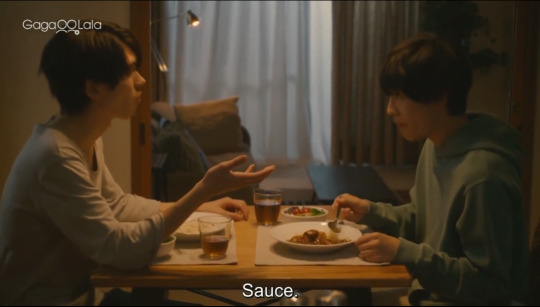
Shoyu = Soy Sauce. Sauce = worcestershire sauce, unless you're in a tonkatsu shop. Then sauce = tonkatsu sauce (which is a slightly different variation). Don't look at me, I don't make the rules.

(This is very long but I'm going to write the whole monologue here)
[Y: 晴れ予報の度に抱かれて
晴れ なんて単語は 暗いなかで湿っぽく行われる それとは ちぐはぐなイメージなのに。。。
まるでやらしい言葉みたいに 頭に刷り込まれていって
わかってんのか? あんたの口から 予報をきいて どんな気持ちになるか
わかんないんだろうな 一生考えもしないだろうな
だってあんたは 恋人でもない俺に 平気でこんなことができる]
Original:
Every time there’s a sunny forecast, he does it with me
The word sunny
feels out of place for such activity
in a dark and damp room
It’s as if it’s such a lewd word being forced into my mind
Do you understand, how I feel when I hear that word from your mouth?
You probably won’t understand or even think about it for your entire life
You have no problem sleeping with someone you’re not even going out with
Mine:
(He) embraces (me) every time the forecast is sunny
A word like “sunny” … (brings up) a completely different image
from that damp, humid activity taking place in the dark
And yet (to me) it seems like a lewd, obscene word, searing (the image of) itself into my brain
Do you understand? How exactly I feel when I hear the forecast from your mouth?
You probably don't understand, do you? Probably won't ever think about it your entire life, right?
Because you're able to do this with me, (someone)who isn't even your lover, without any issues at all
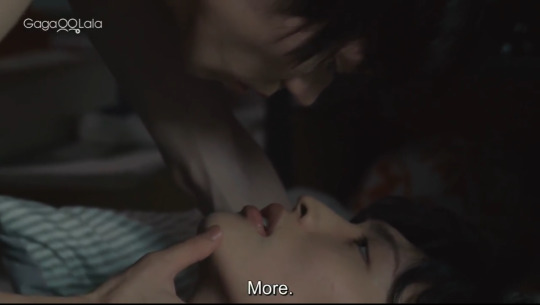
This line was ad-libbed btw, if you didn't already know (link leads to Kouhei's 16th Aug IG livestream, and his explanation starts around 07:20 mark) They've talked about this a few times on both their IG lives, and Kouhei seems to get prouder about it each time hahaha. In the linked IG, Kouhei said:
(reading a fan comment) "More" was an ad-lib?? I'm gonna die
Kouhei: Yea it was…ah that was…um, Mashiko-kun… Acchan (his nickname for Atsuki) gave me a really good expression so…somehow, (by the time) I realised (what I had done), yes, (by the time) I realised it,I had said it. Well probably saying "by the time I realised it" is weird but… yes. By the time I realised it... "even more"…(I'd wanted him) to open his mouth more so. Yes. That's all.
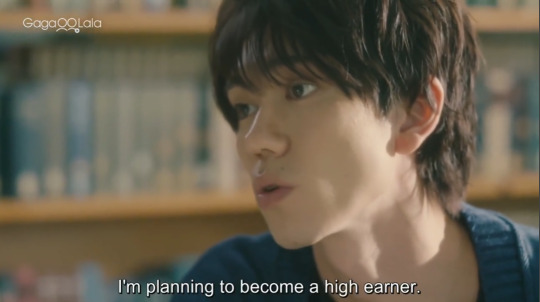
[S: そこそこ高給取りになる予定*だから]
Original: I'm planning to *become a high earner
Mine: It's likely* that I'm gonna be drawing a pretty decent salary so...
*The exact wording here is actually "(it has been) planned that (I will) become (someone) drawing a pretty decent salary so" - the way this is phrased indicates that this conversation probably happened in Segasaki's last year of university, probably right before he graduated when he already had a job lined up for himself. In Japan, your final year of university is spent interning at companies and if they like you, you'll stay on as a salaried worker, so most graduates will have something lined up before they officially leave university.

[Y: 流されるな]
Y: Don't get swept away (by this)
This phrase is usually used to warn people not to let themselves be swept away/caught up by the latest trends/public perception/societal expectations/their own emotions/panic etc Here, together with his insistence that he's just Segasaki's slave and so obeying him is a natural consequence, and so is sleeping with him (as opposed to Yoh doing it because he likes/wants to) - Yoh is basically telling himself "don't get swept away" by the situation/his feelings because their relationship doesn't mean anything.
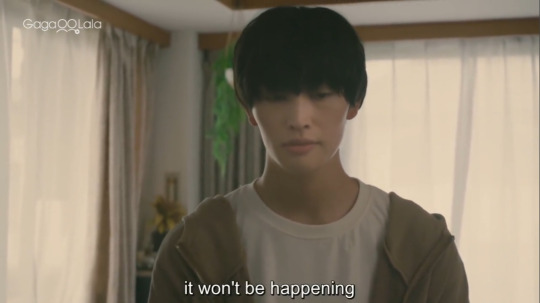

[Y: じゃあ、しばらく…ないのか。*slaps face*
しばらくしなくていいんだ!]
Original:
So, it won't be happening, for a while huh? *slaps face*
I'm fine without it for a while, right?
Mine:
So then... there won't be... for a while, huh... *slaps face*
(It should be) "I don't have to do it for a while!"
Again, you can see, Yoh's literally spent this entire episode trying to convince himself that he's not actually in love with Segasaki, and everything he does for Segasaki, be it listening to him, or sleeping with him etc, he does simply because he is fulfilling his end of the bargain as "a slave".
OMFG I FINISHED THAT WAS TOO DAMN LONG.
I will finish Ep 2 & 3 before I do the language analysis post. But first... I need a break....
#my personal weatherman#taikan yohou#体感予報#MPW subtitle corrections#mytranslations#this was not supposed to happen#i just wanted to nerd out at the way they talked to each other#not do subtitle corrections gdi why am i like this#i had to split the episodes because it was getting too long#translating is hard work i respect everyone ok#but also i get very frustrated when the subs are off#otherwise i just kinda sigh and lament about all the nuances people miss#this is why i don't like to watch with eng subs#left some out that weren't too important to the storyline because otherwise this post would never see the light of day#anyway hope this helps#also hope someone comes and geeks out with me
344 notes
·
View notes
Text
MPW Ep 5 Subtitle Corrections
Masterlist: EP 1 || EP 2 || EP 3 || EP 4
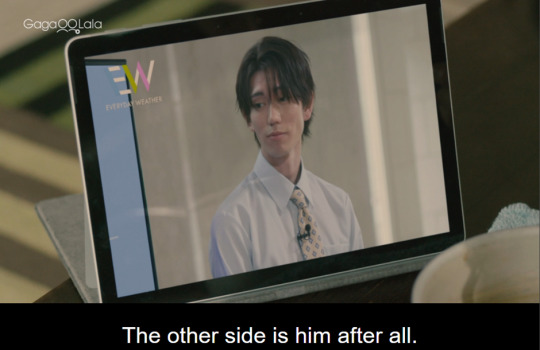
Y: 釣り合うわけないじゃん
Y: 相手はよりによって これだぞ これ
Y: There's no way (I) can match up (to him)
Y: To this (person), of all people, this!
Ep 5 is about Yoh struggling with his desire to "match up" to Segasaki, and the objective difference that he sees between the two of them. It's different from Ep 2's struggle - which arose chiefly because he felt insecure about where he stood with Segasaki. This time, Yoh's struggle is predominantly with himself - because now he has to face up to his worst fear confirmed - that maybe he really is incompetent. And this time, he has to do it without the aid of alcohol too.
I've seen a lot of people talk about how Segasaki shows Yoh his love in every way but in words, and that that's the reason for their miscommunication - but that's not true. He may not use the word "love" or "like", but culturally these words are not often used anyway. What Segasaki does say however, multiple times throughout the show in fact but most clearly in this episode, is essentially "I like it when you depend on me". It's as direct a reassurance as you can get to the fear of being hated because of his perceived incompetence - but that's just the thing - Yoh's perception is skewed by his self-judgement. So, it's not that Segasaki can't use his words - the problem is that Yoh isn't ready to listen yet.
Despite this, Yoh's confidence in his relationship with Segasaki is growing every episode. He might not realize this consciously, but it's right after Segasaki comforts and cares for Yoh at his lowest, that Yoh also drops to what is arguably the most casual speech level he's ever gotten with Segasaki (thus far) - and in response, so does Segasaki.
So, same translation disclaimer applies, Ep 5, let's go! (no twitter space for EP 5 probably because of the fan meets).
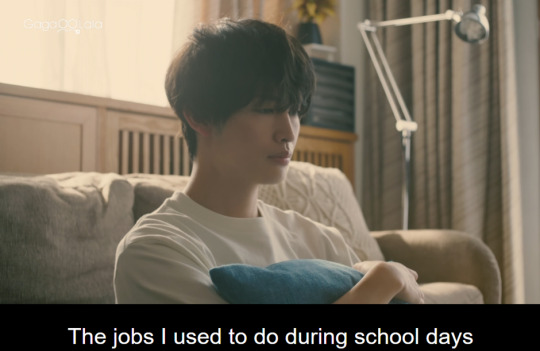
Y: 学生時代から不定期でもらってた単発の仕事も途切れて
Y: 完全無職だ
Y: あ、せめて、家事ぐらいはちゃんとやらないと
Y: Now that the one-off jobs I've been receiving on an irregular basis since I was a student have been cut off
Y: I'm completely jobless
Y: Ah! At the very least, I have to do something as small as the housework properly.
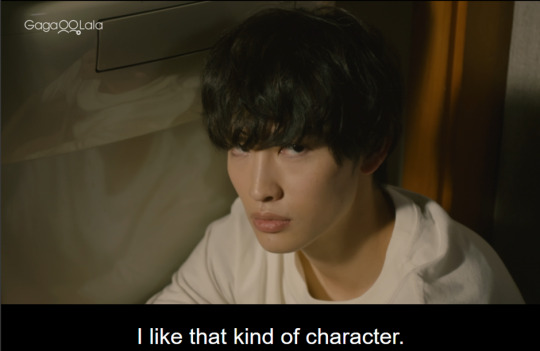
Y: だって そういうのがすきなんだよ、俺は
Y: But, actually, that's what I like
Yoh's explicit use of the personal pronoun "I" here again emphasizes that this is his own opinion. The way this sentence is phrased also gives the impression that Yoh feels a little aggrieved at the whole "your male characters are irritating to male readers because they're too perfect" explanation his editor gave him.
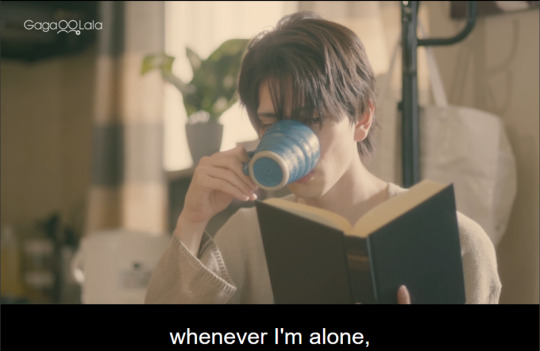
Y: *そりゃ、ほっといたら描いちゃうよ
Y: **お前のせいだ
Y: お前みたいなのが ***近くにいるから
Y: バーカ
Y: *Well I mean, if I'm left to my own devices then I'll end up drawing (him)
Y: It's all your** fault
Y: It's because someone like you, is (always) around*** me
Y: I~diot.
*The "aggrieved" feeling is even stronger in this sentence - Yoh is basically saying that he doesn't set out to draw the characters that way - it just sort of happens, and well it's not his fault, because as long as no one (including he himself) is paying attention to what he's drawing, well then, the characters just turn out that way.
** This is the first time that Yoh has referred to Segasaki using the informal pronoun "お前 (omae)" for "you". Depending on the context, it could be considered a rude pronoun, but is mostly just seen as a marker of masculine speech, and thus leans more towards being simply "impolite". It's the same pronoun that Segasaki uses when he speaks to Yoh - but Yoh usually uses the slightly more polite "あんた(anta)" instead, both in his head as well as when he speaks aloud. The switch here emphasizes Yoh's accusation, that this is all Segasaki's fault.
***the phrase here is often used to say that someone is "by your side" or "here for you" and doesn't only refer to physical distance. So, although he's using "omae" and "blaming" Segasaki for his characters turning out looking perfect, these 4 lines actually still sound pretty intimate. Together with how he drags out the word "idiot", this is very clearly Yoh's amae, similar to what we saw in Ep 4. I... will probably write a post about amae as well, because it's so important to their relationship.
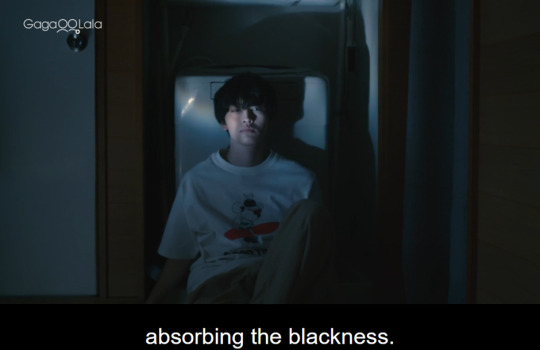
Y: 洋服を着たまま海に溺れるように
Y: 暗いものが染み込んで
Y: 黒いものを吸い込んで
Y: ブヨブヨになった体はずっしりと
Y: 重く 重く。。。
Y: It feels as if I'm drowning in the ocean whilst fully dressed
Y: The darkness seeping into (me)
Y: The blackness pouring into (my mouth)
Y: My body, now swollen, sinks heavily down
Y: So heavy. So heavy.
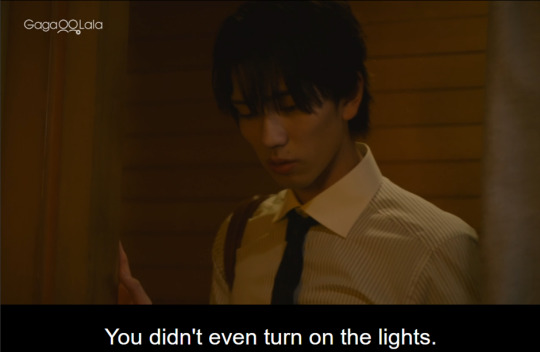
S: なんだ いるじゃねぇか
S: 電気も付けねぇで 何やっ
S: Oh so you are here
S: Not even switching on the lights, what were-
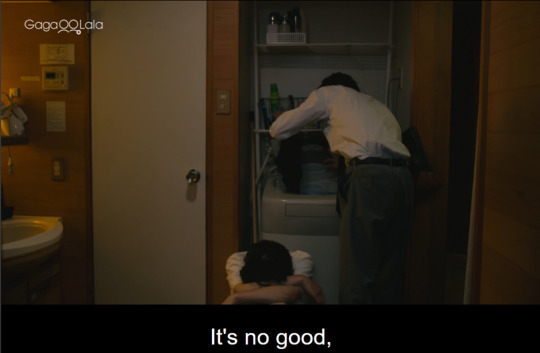
S: *あちゃ~ これやり直しだな
S: *Ahchaa... This needs to be redone then..
*This is just a sound that you make similar to "oh man..." so I'm not sure why it was translated so forcefully as "it's no good"😅 This sentence is another example of soliloquy, or talking to oneself aloud, that is common in Japanese.
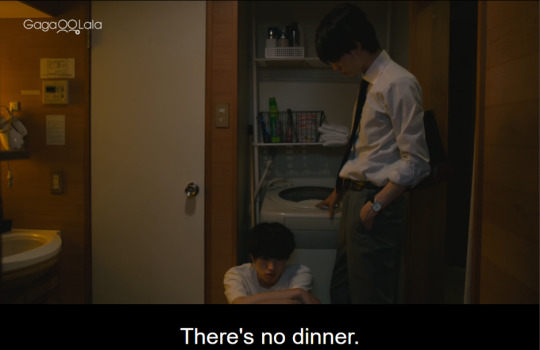
Y: ご飯、ない
Y: ごめんなさい
Y: すぐ準備する
S: *しょうがねぇなぁ ほら立て
S: 行くぞ
Y: Food... there isn't any
Y: I'm sorry
Y: I'll make it soon
S: *What do I do with you... come on stand up
S: We're going
Yoh is really down here because he loses practically all his words. His first sentence is literally "food, none", and when he says I'm sorry he uses the casual (but full) version "gomen nasai" instead of "suimasen" like he usually does. It makes him sound a lot younger than usual, and overall just adds to the kicked-puppy vibe really well.
*しょうがねぇなぁ (shouganee naa) - this is a common phrase that literally translates to "there is no way (to deal with this)" or more commonly "(this situation) can't be helped". It's used to express a sort of acceptance, like in a "oh well, it can't be helped, so don't feel too bad" or "well there's no way this could've been avoided, so let's just get on with it" sorta way. Here, the way Segasaki adds "naa" at the end with a rising tone, actually makes it sound a little indulgent - like when you find your puppy made a mess but it's too cute for you to feel upset and you just love it more. (Also, this is a really common way to show affection between characters in dramas/anime - when one character is down in the dumps, another will be like "well what am I going to do with an idiot like you, I guess I have to help, right?")
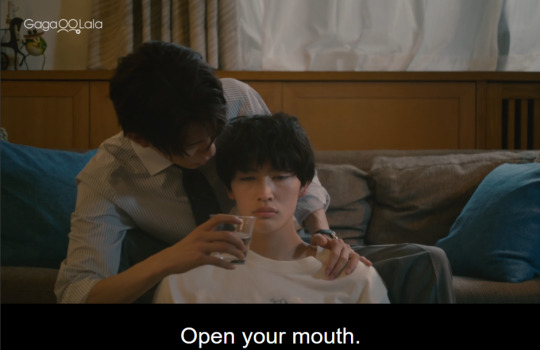
S: 葉 とりあえず 口開けろ
S: Yoh. In any case, open your mouth first
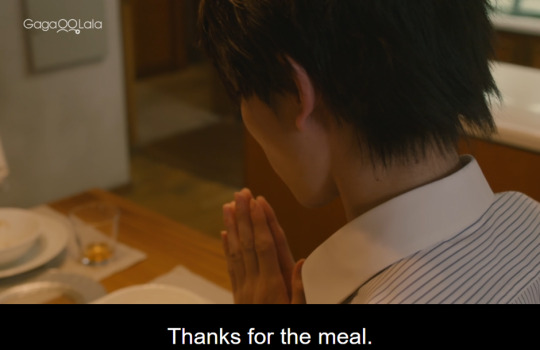
S: ごちそうさまでした (gochisousama deshita)
S: Thank you for the food
This is a standard phrase said at the end of a meal (it's counterpart is "itadakimasu - I gratefully partake" said at the beginning). It expresses gratitude to everyone involved in making the meal possible - from the farmers who grew the vegetables to the person who cooked the meal, and yes, even to the animals themselves. Usually, you would say this to the person who made the meal, or the one treating you to it, but it's Segasaki here who leads the saying of this phrase. This isn't weird at all, given the broad meaning of the word, but it is reminiscent of what a parent would do at home, or a teacher would do in school (Japanese teachers eat with their students in class).
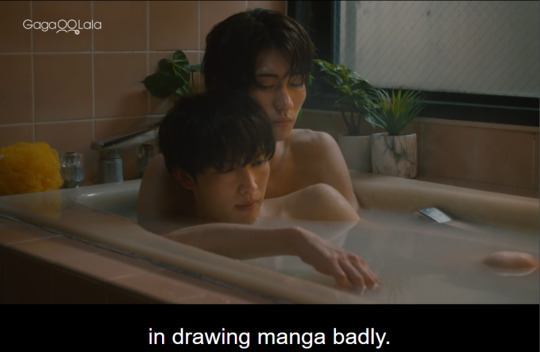
S: なんか落ち込んでんの?
Y: 漫画が とてもだめです*
S: You seem a little down about something?
Y: My manga is... really bad.*
*desu form is back, to give emphasis to this sentence. That said - and I'm really not trying to belittle Yoh here - but similar to the "food, none" phrase earlier, this sentence is just so short and simple that it just makes him sound, well, young. Imagine asking someone "you don't seem to like that person?", and they look at you all serious and say "they're a bad person" - it just sounds unexpectedly young and innocent, and the whole "desu" at the end just tops off the kicked puppy vibes for real. It's why Segasaki snorts a little and smiles.
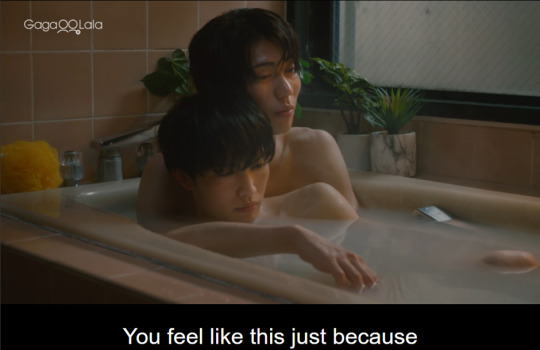
S: お前漫画がだめだと こうなんの?
S: えっ そんだけ?
Y: うん
S: ふーん
Y: そんだけってなんだよ
Y: こっちは 今にも 死にそうな気分なのに
S: So when your manga is bad you become like this?
S: Eh? That's all?
Y: Mm.
S: Hmm~
Y: What do you mean "that's all?"
Y: When here I am feeling like I'm about to die soon
In case you were wondering, "that's all?" in Japanese sounds exactly as it does in English, so no blaming Yoh here for being all 😟 about it.
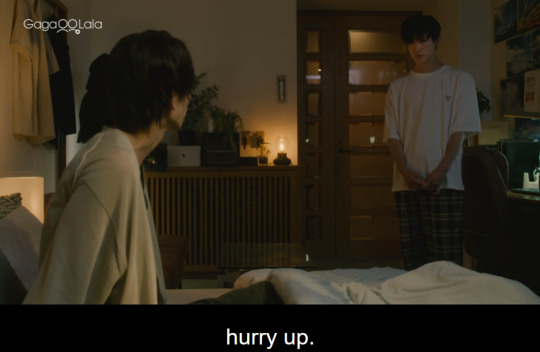
S: ほら* 早く来い
S: Now, come here, quickly.
*ほら (hora) - I last highlighted this word in Ep 3, but Segasaki actually uses it a lot more that just these 2 instances (not least because Yoh's always avoiding him). It's simply a word used to get the listener's attention, like, "look here" or "now" or "see" or "come on" etc.
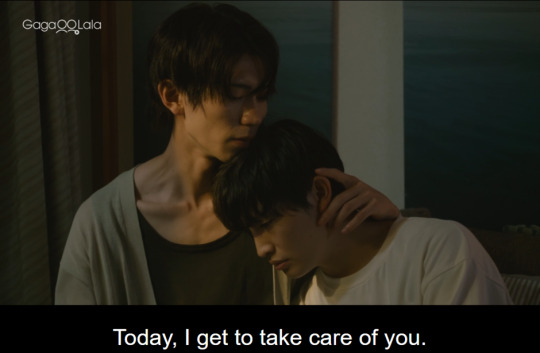
S: 今日はお前がされるがまま*で気分よかったわ
S: もっと落ち込め
S: Today you did exactly as you were told, so I felt really good
S: Be dejected more often
*されるがまま - this phrase means to passively go along with whatever the other person says or does to you, without any resistance (it can also refer to letting nature take its course). It's mostly used to describe a negative situation since it usually implies that the person has no free will of their own, but can also be fairly neutral as in "I followed the waiter's recommendations exactly". So, it's quite amusing that in these 2 sentences, negative sounding words are actually meant to be really sweet (just like how Yoh's "I hate you" sounds eh?).
Personally, I also appreciate how this is a callback to Yoh's monologue in Ep 3, when he talks about noticing the way Segasaki looks just that little bit happier when Yoh listens to him. Here, Segasaki confirms it for Yoh (and us), reinforcing to Yoh that he really doesn't mind Yoh depending on him one bit.
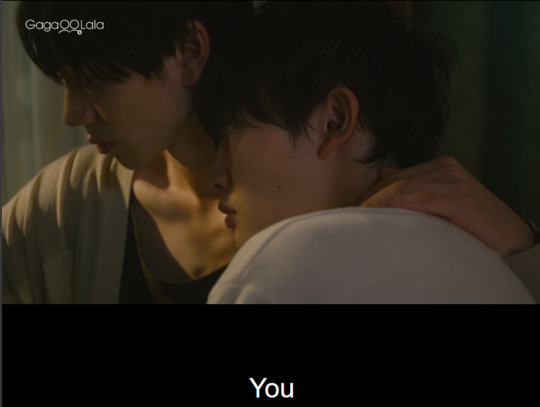
Y: こんなの本物の恋人同士みたいだ
Y: あんた* まるで本当に 俺のこと好きみたいじゃん
Y: Like this... it feels like we're a real live couple
Y: You*... it's as if you really do like me
*We're back to Yoh's usual "anta" here for "you", instead of the "omae" he used earlier.
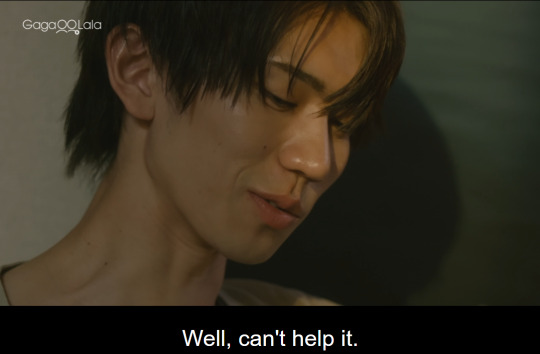
S: しょうがねぇなぁ
S: What do I do with you
This is the same phrase as earlier, when Segasaki found Yoh by the laundry machine.

Oh, the moon is beautiful isn't it? 🤭🤭
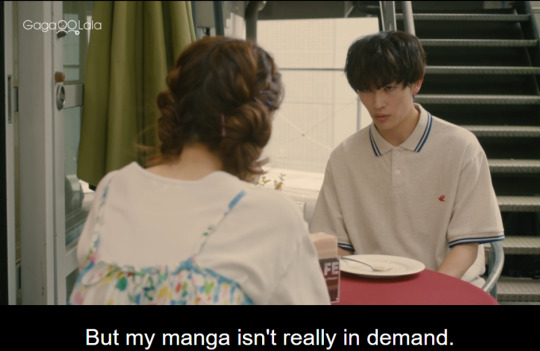
Y: だって 俺の漫画は世間に求められてないわけですし
Y: But, it seems like the world doesn't want my manga...
The phrase "the world wants/doesn't want" is commonly used when talking about finding one's place in the world/society, and young adults often say this when trying to figure their life out. So yes, not so uncommon a phrase that this sentence sounds ridiculous, but it definitely does sound a little dramatic. Hence Man-san's response.
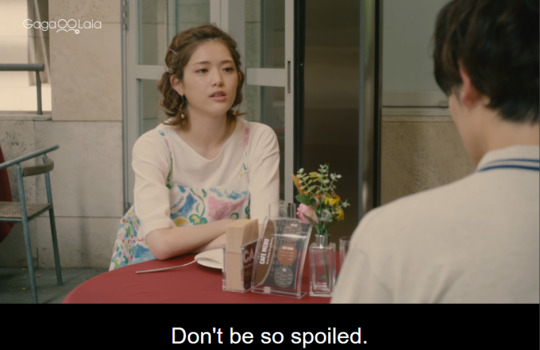
M: *甘ったれんな 思い上がんな
M: Don't be so *spoiled. Don't think so highly of yourself.
*The is the same word, amae, that Man-san used in Ep 4 when she said Yoh was being affectionate with Segasaki. This is another meaning of amae, and it is used in a negative way here, which sort of shows you the complexity of this concept. Underlying it is the message that it's okay to be dependent on your loved ones for your emotional needs, but you still need to take responsibility for your own life.
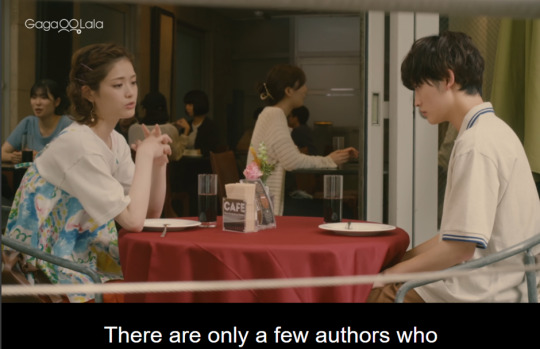
M: 衣食住の保障された環境でのんびり描いてて
M: 一回仕事が途切れたぐらいでうじうじ言ってんのか
M: 本気で気に食わない
Y: 万さん オーバーキルです
M: Being able to draw freely without having to worry about your clothes, food or lodging
M: and yet acting all wishy-washy the moment something as small as getting your work cut off just once happens
M: I really can't stand that
Y: Man-san, that's overkill
The term Man-san uses to describe Yoh's current living arrangement is the same term that Segasaki used in his not-proposal, so this suggests that by now Yoh has told her everything about how they got together (and I love that Man-san totally does not judge).
It's not explicitly talked about in the show, but despite their similar status as Segasaki Otakus, Man-san does often come across as something like a mentor figure to Yoh, or at least someone senior to him in the Manga world. For one, she speaks very casually to him (for a lady, she sounds as rough as Segasaki tbh 😅), even for someone from the Kansai region, and she often gives him advice. Yoh usually speaks to her informally, but in this whole conversation he does shift up to the desu/masu form often, in response to her scolding him, because she's really going at it (even after taking into account her usual speech pattern😅) and well, he's smarting a little at the moment 😂
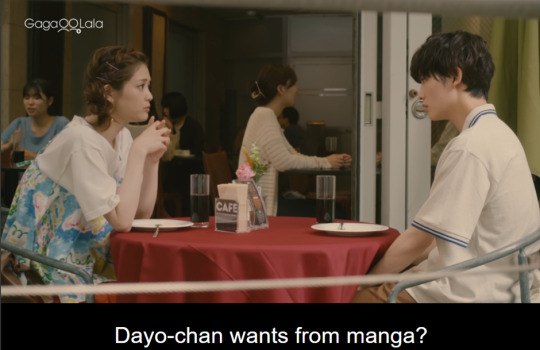
M: 世間がどうとかじゃなくて ダヨちゃんはどうしたいの?
Y: え?
M: ダヨちゃんにとって 漫画って そういうもんだったの?
M: もうちょっと落ち着いて 考えな
M: Rather than thinking about what the world wants, what do you, Dayo-chan, want to do?
Y: Huh?
M: Is that all that manga is to you, Dayo-chan?
M: Calm down a little more and think about it yea?
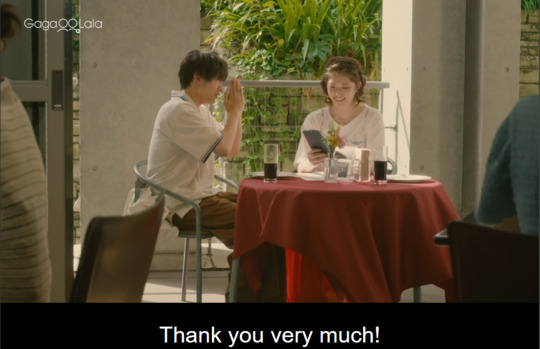
Y: かたじけのうございます
Y: I am indebted to you!
This is a very very archaic way to say thank you, think like samurai-level archaic. These two definitely live in the world of manga 😂😂
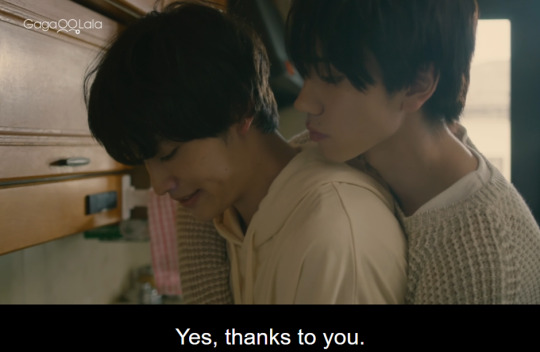
S: もう体調は戻ったのか?
Y: はい おかげさまで*
S: また 崩してくれても**いいんだぞ
Y: ええ?
S: Have you recovered now?
Y: Yes, thanks to you*
S: It's okay to feel down again for me** too you know
Y: Eh??
*Okagesamade - standard phrase you use when someone asks after your health, or when you want to express gratitude for someone else's role in your success/improvement/recovery etc
** 崩してくれて (kuzushite kurete)" - adding "kurete" at the end like this literally means that Yoh does the action of feeling down for Segasaki, rather than just "it's okay to feel down again", which is why Yoh responds in such a surprised manner. As he did before, Segasaki takes what normally is a bad thing and talks about it like it's something good instead. It's his way of emphasizing that Yoh depending on him isn't an inconvenience, in fact, it's something that Segasaki is happy to be on the receiving end of.
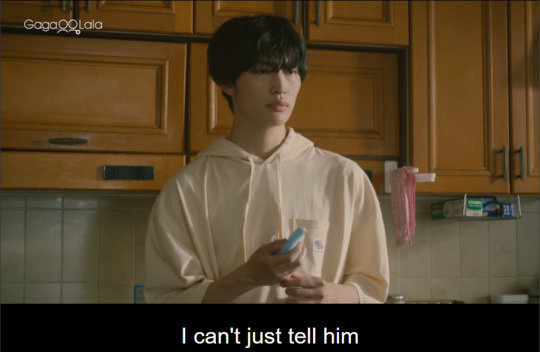
Y: これから自分たちをモデルにした漫画を描きに行きますなんて言えないし
Y: そもそも、万さんのところにしばらく通うことを許してくれるかどうか。。。
Y: なんとか説得しないと
Y: It's not like I can just say "from now on I will be going (out) to draw a manga based on us!" or something like that and...
Y: In the first place, (I don't know) whether or not he'll allow me to go to Man-san's place regularly during this period...
Y: I have to find some way convince him.
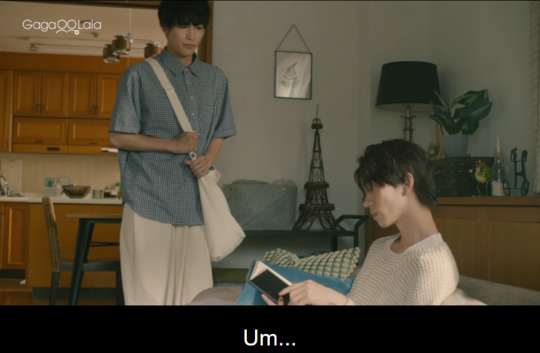
Argument breakdown time, things get intense~~
Y: あの。。。
S: ん?
Y: 今日 編集部で打ち合わせをすることになった*
Y: Um...
S: Hm?
Y: Today, I have a meeting at the editorial department*
*Literally, "It has been decided that today (I) will be having a meeting at the editorial department" - this might sound like an indirect way to say "I am going to a meeting" but it's pretty par for the course when speaking politely. Except, Yoh doesn't use the polite form here like he did in Ep 4, nor does he phrase this sentence as an explanation that he's going to follow up on. Nope, by Yoh's usual standards, this is An Announcement, so it's no wonder Segasaki is immediately suspicious.
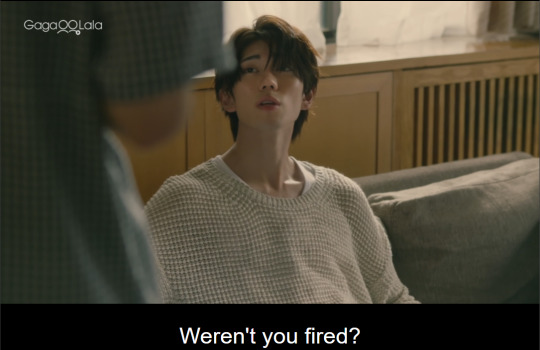
S: はあ? 仕事切られたんじゃねえのかよ?
Y: いや そ、その。。。新しいやつ
Y: しばらく 忙しくて
Y: 場合によっては編集部に泊まりもあるかも
S: 昨日の今日で そんなことあるか?
Y: たまたま連絡がきたんだよね
S: お前 なんか 俺に嘘ついてない?
Y: う、嘘じゃない
S: いや おかしいだろ 泊りって
S: お前 まさか変な仕事じゃねぇだろうな?
Y: そんなこと。。。ないよ!
S: Haa? Didn't they stop giving you work?
[じゃねえのかよ - Segasaki slurs the end vowel here, and adds the end particle "かよ(ka yo)" at the end, which is a rough way to express doubt or surprise, and usually implies some irritation. This, combined with Segasaki's trademark annoyed "haa?" results immediately in a rather flustered Yoh, who stutters a little on the next sentence]
Y: No, it-it's... this is a new one.
Y: For a while, I'm going to be busy and
Y: Depending on the situation, staying overnight at the editorial department... might... be... necessary...
[No end particles here - this is still a statement, and would sound stronger if not for the fact that he's hesistating so much]
S: And all that just happens today, on this day, just one day after yesterday?
Y: ...It just so happened that they contacted me, you see...
S: You... are lying to me, aren't you?
Y: I-it's not a lie!
S: No, it's weird isn't it, to stay overnight?
S: You - don't tell me - you aren't doing some kind of shady job are you?
Y: There's nothing... of that sort!
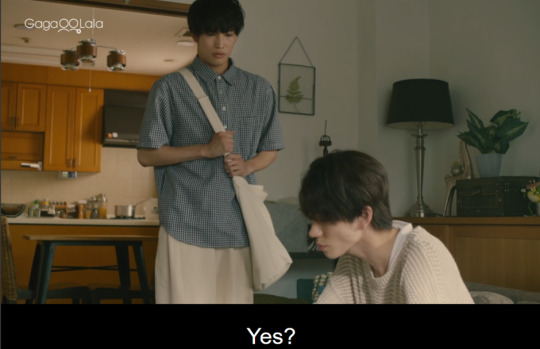
S: 葉
Y: はい
S: Yoh
Y: Yes (hai)?
Yoh's been making a valiant effort to stick to his story throughout this whole conversation but his tone changes completely and he pretty much gives up once Segasaki points out he's lying. In response - and this is not easy to hear but if you want to, go back to about 19:56 or 19:57 of this episode - do you hear Segasaki's small "tsk", after his sigh and before he says Yoh's name? Clicking your tongue, or "tsk-ing" someone is a very very rude way to express frustration or anger in Japan. We're talking get-into-drunk-fights level of rude, if you do it to a stranger. Amongst close friends and family, you're more likely to draw shock first, since it shows the depth of your anger, but they might still get pissed with you afterward. Here at least, Yoh can tell both from the tsk and Segasaki's tone of voice, that he is Not Happy, so he answers Segasaki with a proper "hai" here too.

S: ちょっとここ座れ*
Y: はい
S: 早く
S: Come sit here*
Y: Yes
S: Be quick.
*Slurred "r" on the word "suware" - sit makes this sound very very rough. Segasaki doesn't normally do this, so again, this is him angry, and he's going to slur his r's quite a bit more.
S: お前さ 自分の立場わかってんの?
S: 分かってねぇだろ 分かってねぇから 泊りで仕事とか言い出すんだろうが
Y: え~っとだから 遊びに行くわけじゃないし。。。
S: そうじゃねぇだろ
S: ああ~もう
S: 金か?なんか欲しいもんがあるなら買ってやる
Y: 違くて 少しはさ。。。
Y: 自分が稼がないとって
S: 必要ない なんで分かんねぇかな
S: お前は稼がなくていいんだよ
S: Listen, you - do you even understand what position you're in?
S: You don't do you? You don't understand and that's why you can just say things like you'll stay out to work overnight.
[This is harsh. Not only is the speech rough, he's still slurring some of his "r"s here, and the ending particle だろうが emphasizes the forcefulness of this statement and Segasaki's frustration - and you can see the effect it has on Yoh.]
Y: Umm well... it's not like I'm going for fun or something...
[This is indignant, but also nervous - Yoh's speaking a lot faster than usual, and he has to drag the filler words at the beginning out before he can figure out what to say.]
S: That's not what I'm talking about is it!
[slurred r again]
S: Argh I swear -
S: Is it money? If there's something you want then I'll buy it for you
[more slurred "r"s]
Y: That's not it! Even just a little -
[This is the first time Yoh uses the end particle "さ (sa)", and just like Segasaki, he's using it to draw attention to what he's saying, essentially the equivalent of "listen!". This whole line isn't rude, but it is direct and it's probably the most forceful Yoh has gotten with Segasaki so far, even compared to their argument in Ep 2 - Yoh might have physically pushed Segasaki then, but he mostly just sounded hurt. Here, he's very tense, but he's cut off by Segasaki biting his ear.]
Y: - I should earn some money myself (at least, I thought so)
[This is more like how Yoh usually voices his opinion - by "hedging" his sentences a little with "I think" and so on to sound less direct - though he's still using truncated forms here, so he's not quite back to his usual level yet]
S: There's no need to. [To self:] Why don't you understand?
S: It's fine even if you don't earn anything.
[Similarly, Segasaki softens this sentence just a tiny bit by tacking on a よ(yo) at the end]
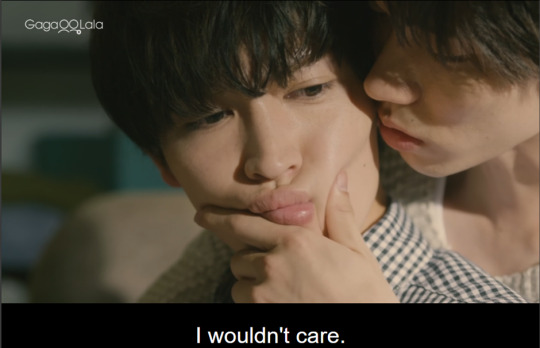
Y: でも!
S: あのな 俺はお前に漫画の仕事がなくなろうがどうでもいいんだ
Y: But!
S: Listen to me. I don't care at all whether you lose your manga work or not.
[To be fair to Yoh, the phrase "どうでもいいんだ" literally means "it's fine either way" but it tends to feel like "I don't care because it doesn't matter/make a difference to me/doesn't really involve me", so you can see why it triggers him.]
It's interesting to contrast Yoh's reaction here with the above 2 times Segasaki says something with a negative connotation. Of course, Segasaki also sounded a lot sweeter then (though in his defence, he didn't have to worry about why Yoh might be trying to lie to him all of a sudden), but the biggest difference really is in Yoh's mindset.
Y: え?
S: 当然だろ
S: だから余計なこと*すんな
Y: なんだよ どうでもいいって
Y: 漫画のこと 分からないなりに 応援してくれてるもんだと思ってたのに
Y: あんたにとってはくだらないことでも
Y: 俺にとってはすごく
Y: すごく大事な事なのに
Y: 全然よくない
Y: バカにすんなよ!
Y: Huh?
S: Isn't that obvious?
S: So, don't do unnecessary* things
[*余計なこと - This phrase is used to refer to the problems that arise from whatever thing/action is in excess, and so has a negative connotation. Yoh is too fixated on the previous line to notice though]
Y: What's that (supposed to mean)... "I don't care"
Y: I've always thought that manga was something you supported me in, despite not knowing much about it, and yet...
Y: Even if to you, it's something trivial
Y: To me, it's something that's extremely
Y: It's something extremely important and yet...
Y: This is definitely not ok
Y: Don't look down on me!
[word contraction - again, by Yoh's standards, at least when he talks out loud to Segasaki, this is a drop in speech levels]
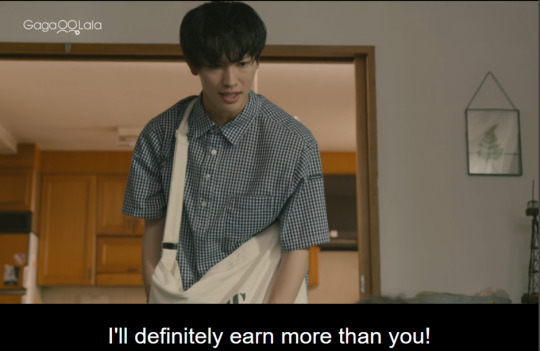
Y: 絶対あんたより稼げるようになってやる
Y: 漫画で!
Y: I'm definitely going to become someone who can earn more money than you!
Y: With manga!
I think difference between simply "earning more" and "becoming someone who can earn more" is important here - because it isn't about money - it's about competence. Yoh thinks his own worth is calculated in his ability to do things "well", be it in his work or at home. By that measure, Segasaki is worth everything and Yoh is sorely lacking, hence Yoh wants to "become" someone that is, in his mind, worth something. Because if he does not, then inevitably, Segasaki will one day come to disdain him.
There are so many times in this episode that Yoh hears things that should cement their relationship in his head, that he even recognizes as couple-like and accepts without protest - Man-san referring to Segasaki as Yoh's boyfriend, Segasaki losing his whole "man-of-a-few-words" thing and saying more to him in this episode than in any other, verbal confirmation that Yoh depending on him is something he welcomes etc. And yet, Yoh's fear filters all of that out and he hears only what sounds like his own self-judgement in Segasaki's voice. It's no wonder he lashes out at Segasaki like that, though really, who he's really attacking is himself. Afterall, sometimes when we hurt ourselves, we hurt the people who love us too, as we'll see in Ep 6.
(That was quite the arguement though, wasn't it!)
#my personal weatherman#taikan yohou#体感予報#MPW subtitle corrections#mytranslations#segasaki x yoh#segasaki definitely uses the wrong words sometimes#but it's not like he doesn't use the right ones either#until yoh acknowledges and believes in his own strengths#segasaki could promise to love yoh for all their natural lives and then some#and yoh would still fear that segasaki might hate him#sorry i just see so much discourse about how things could be solved if they just used words#but it's not about what is being said (or not)#it's about what is (and isn't) being heard
196 notes
·
View notes
Text
MPW Ep 6 Subtitle Corrections
Masterlist: EP 1 || EP 2 || EP 3 || EP 4 || EP 5 ||
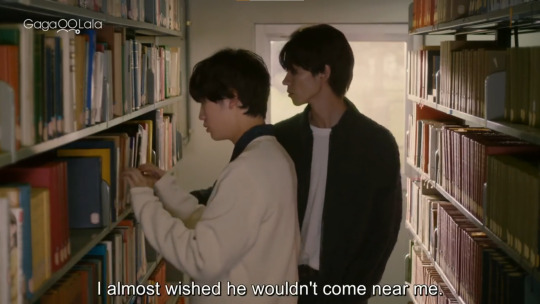
Y: 正直言って 怖い
近づく度に 心臓が跳ねるから
何なら近寄らないで欲しい
住む世界が違うから
好かれたいとかは思わない
ただ。。。
嫌われてしまったら死んでしまうかもしれない
想像するだけで 胃液がせり上がった
Y: To be honest, I was scared.
Because whenever he came close to me, my heart leapt and skipped a beat.
I wished that, if possible, he wouldn't come near me
because we lived in different worlds.
'I want him to like me' - I never had a thought like that.
It was just...
If he ended up hating me then I felt like I might die.
Just thinking about it made my stomach turn.
We've seen for awhile that Yoh's fear that Segasaki will one day come to disdain him is what keeps him from voicing his thoughts out loud - but it is in Ep 6 that we truly learn the intensity with which Yoh feels, and come to understand why that fear overwhelms him to the point that he is incapable of hearing Segasaki's love for him.
Or, Yoh sees Segasaki for the first time and literally starts spouting poetry in the way only a visual artist can. Get ready for a lot of interaction breakdowns - this episode tells us quite a lot about these two! Same translation disclaimer applies, Ep 6, let's go!
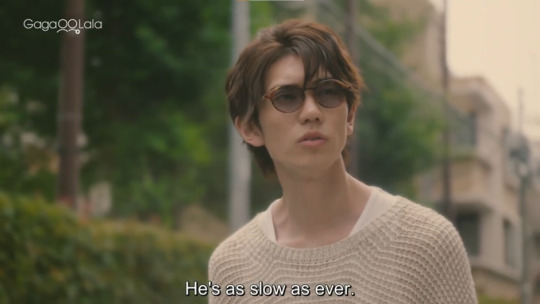
S: 相変わらず 歩くの遅ぇな
S: As usual, he walks so slowly
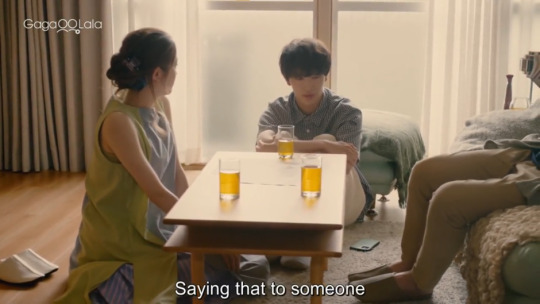
Y: あのさ 実は
Y: 出てくるときにケンカしちゃって
M: え?どうしたの
Y: お前の仕事なんてどうでもいいって言われた
M: 瀬ケ崎さんが?そんなこと言ったの?
Y: どうでもいいって なんだよ
Y: 人が一所懸命やってることに対して*
Y: 最低だよ あいつ*
Y: You know... actually
Y: When I was leaving we got into an argument
M: Huh? What happened?
Y: I was told "I don't care at all about something like your work"
M: By Segasaki-san? He said something like that?
Y: "I don't care at all"... what's with that!
Y: To say that about something that someone is giving their all for...*
Y: He's the worst, that guy**
**Yoh uses あいつ (aitsu) to refer to Segasaki as "that guy". This is again considered rude, though is often used amongst male friends as well (like calling someone an asshole/bastard). He tends to use this word to refer to Segasaki in his head, especially when he's annoyed with him.
*Just like at the end of Ep 5, where Yoh emphasizes that he will become someone who can earn more as opposed to just earning more, here Yoh specifies that he is upset with Segasaki's response to his work, rather than being upset with the response being directed at himself, as the original subs imply. It's a small difference but I think it's important because it fits with his entire character. He has consistently only been triggered by comments about his work, not about him as a person. Yoh is self-conscious and sensitive about his work, because he sees competence as a measure of worth. It's precisely because he ties his self-worth to his work that he falls into such a deep depression in Ep 5, and it is the same reason why Yoh does not understand what good Segasaki could possibly see in him - after all, there is no merit in just being who he is, only in the work that he can do.
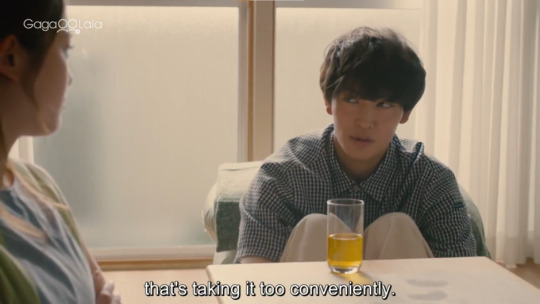
Y: いや それは都合よく受け取り過ぎだよ
Atsuya: ダヨ君 言葉って受け取り方が9割だからさ
A: 同じ言葉でも その時の気持ちやコンディションによって
A: 違った意味に捻じ曲げちゃうものなんだよ
A: ダヨ君が元気な時だったら もっと甘~く聞こえたんじゃない?
Y: No, that's just over-interpreting it in my favor
Atsuya (Man-san's husband): Dayo-kun, they say that about 90% of the meaning words convey comes down to the way we interpret them, so
A: Depending on the way we feel, or our condition in that moment, that meaning can end up distorted and warped, even if the same words are used, you know?
A: If Dayo-kun you, had been in a happier mood, might it not have sounded a lot sweeter to you?
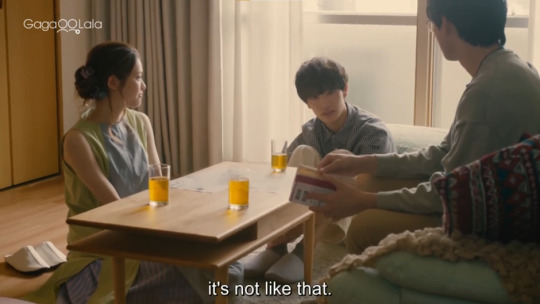
Y: ん。。。いや、違うんです
Y: 俺とあの人って そういう感じじゃないんで
Y: Mm... No, it's not like that
Y: That person and I, well... that's not what it's like (between us), you see
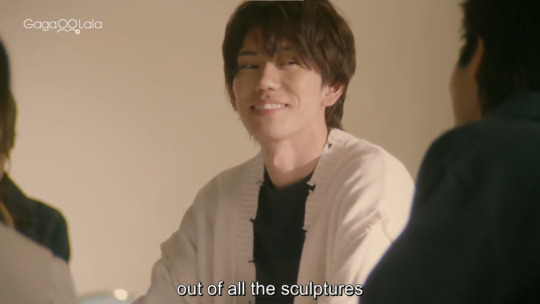
Y: あの人を初めて見たとき
この星の生き物じゃないかもしれないって思った
少なくとも地球上で見たものの造形の中で
一番きれいだとおもった
耳の形 鼻筋
下顎角のライン 唇の膨らみ
きっと見えない眼球の形状まで
きれいなんだろうなって
Y: When I first saw that person
I thought that he might not be a living thing from this planet
At the very least, out of all the forms that I had ever seen on this Earth
I thought he had the most beautiful one.
The shape of his ears, the ridge of his nose,
The line of the angle of his jaw, the full contour of his lips
Even the structure of what could not be seen - the globe of his eyes -
I thought for sure that too must be beautiful.

Y: 趣味で漫画は描いてたけど
現実の人間を描くのは初めてだった
それに
男を描きたいと思ったのも初めてだった
今 目に焼き付けて 描きつけておきたい衝動に駆られた
たぶん あの美貌と同じ空間にいた
そのせいで 俺は おかしくなっていた
Y: I had drawn manga as a hobby but
It was my first time drawing a real live person.
And,
It was also the first time that I thought "I want to draw a man"
In that moment, driven by impulse, I wanted to burn his image into my eyes, to capture his likeness down on paper.
Probably, it was because I was in the same space as that beauty.
It was because of that, that I began to go crazy.
At 06:44, when Segasaki's green shirt classmate comes in calling his name, you can see that Yoh mouth’s "Mizuki" after he hears it.
(Btw Green Shirt later wears a Red Jacket, and is played by Nishimoto Maiki, the leader of the group Acchan is in - GENIC. Cute shot of the 3 of them here)

S: 直接何かしてくるわけではないし 別にいいと思うけど
S: Well it's not like he's doing anything to us directly... I think it's fine actually
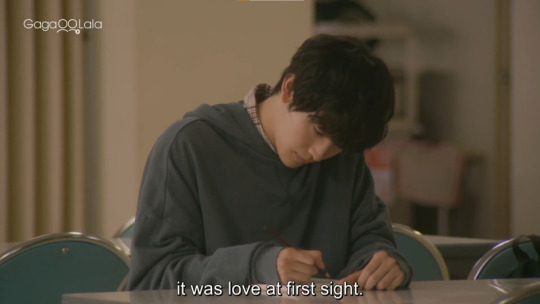
Y: 女の子が相手なら
一目惚れだとはっきり思ったかもしれない
でも ただただきれいな男だったんで
自分の脳が そこまで処理しきれなかった
Y: If it was a girl
Then maybe I would have clearly understood that this was love at first sight
But it was just very simply, a beautiful man so
My brain couldn't handle processing more than that
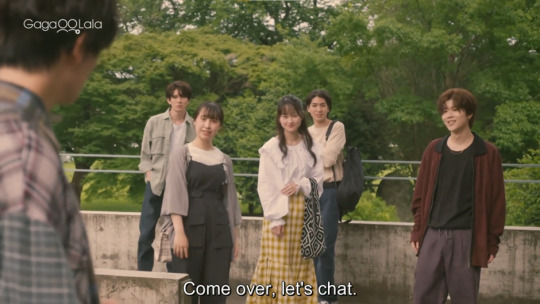
Most of this is not subtitled, and it’s a little muffled, but as the group walks over you can hear that Segasaki is the center of their conversation here, though he's not actually participating in it much. It speaks to the group dynamics, so I'm including it here (Segasaki is bolded):
Girl: ええ?
S: ちがうよ
Red Jacket: 瑞貴じゃん、ね、今ね?
Girl どうせモテるじゃん
S: いやモテない
Red:モテるよ瑞貴が
Girl: 告白されてるよ どうせ
Red: されてる されてる
Girl: あれ!ぼっちくん*じゃん
Red: うわっ マジだ ぼっちくんじゃん
Boy: いつも俺たちのことチラチラ見てる
Girl: ちょっと来なよ おしゃべりしたげるからさ**
Girl: Whaat?
S: It wasn't
Red Jacket: It was (said to) Mizuki wasn't it, right? Just now?
Girl: I mean you're popular anyway!
S: No, I'm not
Red: Mizuki's popular
Girl: Whatever it is, that was a confession (you received)
Red: It was, it was
Girl: Oh hey! Why, isn't it Little Loner*?
Red: Oh snap, you're right! It is Little Loner!
Boy: The one who always sneaks looks at us
Girl: Come here a bit, we'll talk to you, ok?**
*ぼっちくん (Bocchi-kun) - Bocchi is slang for loner, and by adding the suffix "-kun" to it, they've turned this into a diminutive, like a nickname. It sounds cute and friendly, but is clearly meant as a casual sort of insult, so I've translated it as "Little" here.
**This is an interesting line to discuss. She tells Yoh to come over, using the phrase 来なよ (kina yo) - this is the same "na" that Segasaki uses in Ep 4 actually, when he tells a drunk Yoh to go sleep in the room. It's the exact same word form, but where it was tender when Segasaki said it, it's highly insulting here - and the reason is because of the context and their (non-existant) relationship. She may be Yoh's senior, but this is the first time they're meeting, and they are nowhere near close enough that this phrasing would ever be seen as appropriate. She then tells him "we'll talk to you", using the colloquial form of "~したあげる (shita ageru)" aka "to do for you" - in other words, she's framing the action of them talking to him as if it were a gift from them to him (this word form also implies they are above him in the hierarchy). She also adds the polite prefix "O" to the word for "talk", which in this context is meant to make her appear sweet and ladylike.
In other words, with just one line, she has insulted Yoh not only by talking down to him as if he were a small child or a pet, but also by insinuating that she's a sweet, lovely person who has been so kind as to deign to speak to him.
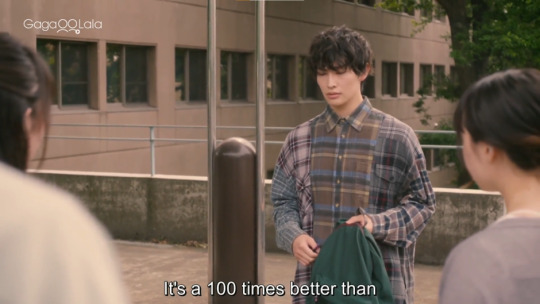
Y: あの。。。俺* 買ってきます
Y: 絡まれてるより100億倍マシだわ
Y: Um... I*... will go and buy it.
Y: That's definitely 100 million times better than getting harassed by them
*Yoh still uses the masculine pronoun 俺 (ore) for "I" here (the same one he's used in every episode) which is remarkable for the fact that he doesn't switch to the more polite form 僕 (boku). Nowadays, it isn't really expected per se that a junior make this switch - especially since "ore" is usually the go-to pronoun for most male university students - but the switch wouldn't be surprising either, given that they are his seniors. Yoh does acknowledge their seniority when he uses the formal -masu form of the word "to buy" - but in the context of them bullying him, the choice to stick with the more masculine pronoun "ore" suggests that he isn't intimidated by them.
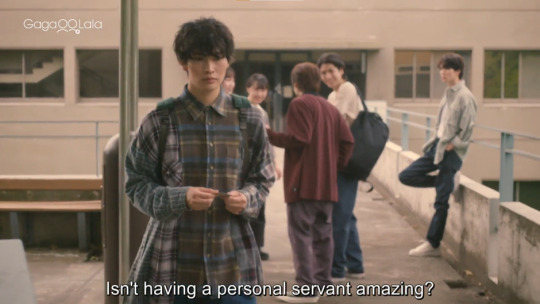
Red: セルフパシリって すごくね?
Girl: やばいよ
Red: He automatically offered to be an errand boy! Isn’t that crazy?
Girl: It’s nuts!
パシリ(pashiri) - to be made to run errands - is slang, and it is used specifically to refer to cases where someone with more social power orders another around. It’s almost always linked to bullying or misuse of social power – so by using this word, these guys - they know exactly what they are doing.
Y: クソだよ あいつら*
Y: Those bastards*… they’re trash
*Yoh uses the same word あいつ (aitsu) to refer to the gang that he did at the beginning of this episode to refer to Segasaki - once again it is the context that changes the meaning of this word. With Segasaki, it is proof that they share a close relationship. With these upper classmen that he's just met - it's definitely rude.
This is a very common form of bullying in school, and evidently, Yoh recognizes it immediately. The fact that he jumps so quickly to cooperating with it tells us sadly that this is something he's familiar with - he's likely been bullied before. This is unfortunately, unsurprising, because Yoh doesn't adhere to social norms very much. He eats alone, he stares at people, he doesn't greet his seniors properly (that slight bow is not enough, there should at least be a verbal greeting of some sort).
In my post on amae, I talked about how the interdependent self-construal means that one's ability to assimilate is seen as a value. In the same vein, people who do not fit in with the group, or who do not conform, are not looked upon favorably in Japan, because it is often assumed that they simply do not want to. It is not that they are unable to assimilate, it is that they are refusing to make an effort to be part of the group, and thus the fault and blame lies with them. Ostracization of those different therefore, is the expected consequence and punishment that the group metes out. All of us have to do our part to adhere to the rules of the group - what makes you so special that you can do your own thing? If you just did your job of fitting in like the rest of us have, well, then you wouldn't be in this position in the first place, now would you? - This sort of justification is the reason why bullying in Japan can become very, very extreme, and why despite efforts, has been so difficult to eradicate.
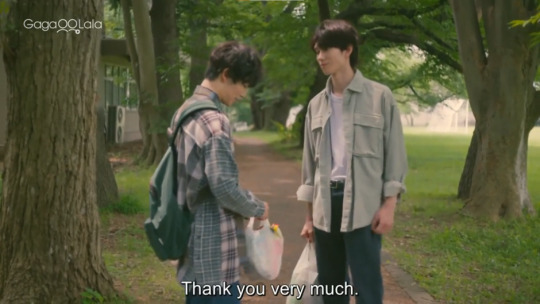
S: そんなに 一人で持てないだろうと思って
S: 貸して
Y: ありがとうございます*
S: 行こう
S: I thought all of that was probably going to be too much for one person to carry
S: Pass it over
Y: Thank you very much*
S: Let's go
*Yoh uses the full, polite version of "thank you" here, and he will, for the most part, continue to use desu/masu forms with Segasaki, and answer him politely, in recognition of their senior/junior relationship. Similarly, Segasaki uses informal forms with Yoh, though he maintains a friendly demeanor and does not drop to rude forms at all, because they aren't that close yet. Note how he says 行こう (ikou) for "let's go" here - different from his present day "we're going", which leaves no room for argument.
(Also, he took the heavier bag of drinks (´ ▽`).。o♡)

S: 結構歩くのゆっくりなんだね
Y: よく 言われます
S: 君 名前は?
Y: あ 葉って言います あの。。。葉っぱの
S: ふーん 葉くんか
Y: はい
S: 俺は
Y: 瑞貴...さん
S: なんで知ってんの?
Y: あ そう呼ばれていたので
S: よく 聞いてんな
Y: はあ まあ。。。
Let's break this down to look at some social cues and nuances:
S: You walk quite leisurely, don't you?
Y: I've... been told that a lot
This is more than just a callback to the beginning of the episode (or a chance to contrast how much more polite and sweet Segasaki sounds here 😂) - This is another way in which we see Yoh does not fit in. Segasaki is his senior, who has gone out of his way to come help him (never mind that Yoh's being bullied), and he should at the very least, be trying to match Segasaki's pace, not making him wait like Yoh does here. Segasaki's comment should be taken as much as an expression of surprise, as it should a cue to catch up - Yoh glances briefly at Segasaki after this line (which seems to amuse the latter) but he doesn't actually apologize outright or walk any faster. He does admit that he's been told this often - which sometimes can work as a concession, because you sort of validate what the other person is saying, but at the same time you aren't quite agreeing either. That said, it can backfire, because it means you've been made aware of your habit and yet have done nothing to change it. Segasaki doesn't seem to mind though, and actually matches Yoh's pace here.
Speaking of "pace" - "マイペース" or "my pace" is a loan word from English, and is a term used to describe someone who tends to do things, well, at their own pace, or in their own way, and who isn't bother by the people or goings-on around them. Usually meant as a benign, sometimes affectionate comment on someone's personality, it often brings to mind the image of someone who appears to drift during conversations, who might be a little "slow" in social interactions, or who physically lags behind the group. It can have negative connotations, because it means the group needs to make concessions for this person (like looking for them when they've wondered off). Yoh is the epitome of someone who is "my pace", and I'm very sure that the emphasis on his slow walking is not just a peculiar quirk of his character, it's an intentional part of the character design to show how Yoh is different.
S: *You... what's your name?
Y: Ah, I'm called Yoh. Um... written with the character for "leaf"
S: Hmm~ Yoh-kun huh..
Y: Yes
*Segasaki uses the polite pronoun 君 (kimi) to refer to Yoh here, as opposed to the rougher お前 (omae) that he now uses in the present day.
That little action Yoh does whilst saying "leaf" is him drawing out the kanji character for his name. It's quite common to tell someone which character is used to write your name, because the characters usually mean something, and it helps others to remember. Strictly speaking, Yoh really should be introducing his full name here, but judging by how he's been fiddling with the plastic bag, he's probably just too nervous to realize.
S: I'm
Y: Mizuki...san
S: Why do you know that?
Y: Ah... that's what.. you were called (by them) so...
S: You listen closely don't you
Y: Ahh.. yea...
Nice save 😂First of all, it's extremely unusual to jump straight to using someone's first name instead of their family name (unless you're still a kid), let alone doing it to an upper classman, though Yoh does manage to tack on the polite suffix "-san" at the back. It's the verbal equivalent of stepping right into someone's personal space and touching their bag or something and then being all "er there was something there...". It's just weird and borderline inappropriate 😂 The fact that Segasaki doesn't scold him for taking such a liberty, or show any sign that he appears weirded out by it (in fact, he actually goes along with it!) tells us that Segasaki is a very kind (yasashii would be the right term here, the same term that appears at the end of this episode) or at least a very tolerant individual though I'd also like to think he just finds Yoh's strange ways a little cute too.
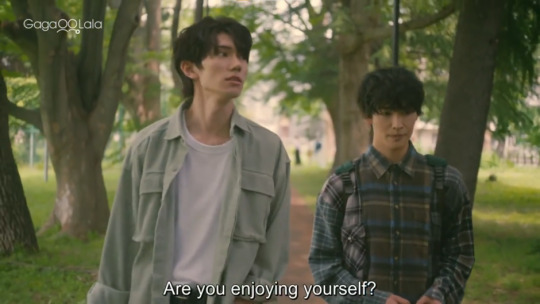
S: いま 楽しい?
Y: え?あ いえ
S: 絡まれて パシらされてさ
Y: ああ。。
S: どう?
Y: いや たのしくないです
Y: 瑞貴さんは?
S: 俺?
Y: はい
S: 全然楽しくない
S: 内緒ね
Y: はい
Continuing with the breakdown:
S: Is it fun?
Y: Huh? Ah no-
Segasaki's tone changes here to a more serious one - all he does is stress the final syllables of the word "fun" to indicate he's asking a question, instead of adding any end particles that might give more context, or that might soften the tone. The topic switch is a little sudden, which is why Yoh seems a bit confused. It doesn't help that the words are a little ambiguous - it literally translates to "now, fun?" - except the Japanese word for "now" is often used to mean "just now" as well, because the Japanese concept of time is not quite as linear as it is in West. "Now" doesn't just refer to "this current exact second we are in", it extends from whenever the "current activity" began right up to "this current exact second" - the key is figuring out what the current activity is 😅. Because Segasaki jumps into this topic so suddenly, and without much contextual cues, Yoh can't quite tell whether he means now, as in them walking together, or now, as in, the whole being sent on an errand thing, which is why Segasaki clarifies in the next sentence:
S: Being hassled, and sent on errands?
Y: Oh...
S: So?
Y: No, it... isn't fun.
Segasaki watches Yoh closely whilst he waits for the answer to his question. This is Segasaki checking that Yoh knows he's being bullied, and it's also permission to talk about the topic. Once he confirms that Yoh does know what's happening, he looks away again.
The exchange tells us a lot about Segasaki's character, because often, the reason why bullying goes on for so long is that no one is willing to talk about it. Everyone knows what's going on, but no one acknowledges it. The fact that Segasaki jumps straight into it hints to Yoh that he doesn't agree with what his "friends" are doing (whether Yoh catches that hint or not is a different story). It also tells us, the audience, that he isn't afraid to speak up about things he disagrees with (similar to how he spoke up for Yoh when Yoh was sketching in the cafeteria) - but not to the extent that he'll do something which threatens the harmony of the group outright. This is tatemae/honne, which I talked about briefly in the amae post as well, and linked to this street interview video for real life examples. In short, tatemae is your ability to avoid conflict and smooth over group interactions, and is seen as an essential and positive trait. Segasaki is very good at this, even at this stage in his life, which is part of why he is so well-liked.
Y: What about Mizuki-san?
S: Me?
Y: Yes
S: I'm not having fun at all
S: It's a secret, yea?
Y: Yes
This is cute, and tells us about Yoh's character too. Firstly, he's still persisting in his use of "Mizuki-san", though he's being really tentative about it, like he's testing whether or not it's okay. Secondly, he's actually asking Segasaki directly to confirm his stand on what his "friends" are doing. Is this Yoh being daring, or just his slightly awkward, somewhat tactless self? I couldn't tell you 🤣 It's likely a bit of both.
In response, you can hear the surprise in Segasaki's voice, but he doesn't hesitate to detach himself from the actions of the group. The way he invites Yoh into his group here, by acting as if he's let Yoh in on a secret, is very charming obviously, and reminds me somewhat of how in Ep 4, he suddenly drops to "Kanami-san" when talking to Man-san too. This again fits with how his "public mode" has been consistently portrayed thus far - nice, charming, polite, good-looking, and obviously popular (Ep 3, the girls in the cafe at the back, Ep 4, the way he talks to Man-san, this Ep, where he's even been proposed to).

Guy: 俺の水がきたかな?
Red: あいつ覚えてるかな
Guy: 確かに 待たせたな
S: ごめん 葉くんお腹痛いんだって だから連れて帰るわ はい
Girl: 瑞貴まで帰らなくてもいいんじゃん
S: しんどいのに 一人すんのかわいそうでしょ*
S: じゃあ またね また
S: 行こう
Red: 優しいな** 瑞貴
Girl: でも 帰っちゃったよ
Guy: Is my water coming?
Red: Will that guy remember?
Guy: Good point, he's really made us wait
S: Sorry! Yoh says he's got a stomachache, so I'm gonna take him home. Here!
Girl: Huh? But it's not like Mizuki you have to go too right?
S: Leaving him all by himself right when he's having a hard time - wouldn't you feel bad for him?*
S: So, see you guys later, 'kay! Bye!
S: Let's go
Red: Mizuki's really kind** isn't he?
Girl: But, he's leaving you know!
*Segasaki does a very small switch up to the polite form here, as he takes the moral high ground by reminding the girl that as Yoh's senior, they have an obligation to take care of him when he's unwell. He's still friendly about it though.
**優しい (yasashii) - kind. This word pops up a lot to describe Segasaki, we'll talk about it at the end of this episode.
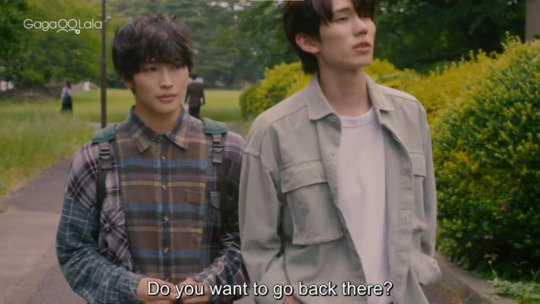
Y: あの いいんですか?
S: あそこ戻りたかった?
Y: いえ
Y: Um... is this okay?
S: You wanted to go back there?
Y: No
Y: いつも 友達に囲まれてるこの人が
なんでこうして 俺と一緒に歩いてるのかわからなくて
不思議だった
Y: This person, whose friends were always surrounding him...
I just couldn't understand why he'd walk together with me like this
It was a mystery to me.
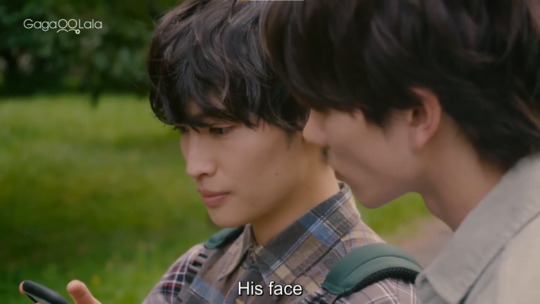
Y: あの顔が 信じられないほど近くにあった
耳元に届いた声の響きまで 良いものであることに
気づいてしまった
Y: That face was... so close to me I could scarcely believe it
And it dawned on me then
How wonderfully pleasing
Even the notes of his voice drifting pass my ears sounded
The scene in the library I've included right at the top, but I'm going to add the conversation that happens during Yoh's monologue, since the subs have them sort of mixed in.
S: 葉
S: 何してんの?
Y: え?えと、あの、本を探せて...
S: この本面白いよ
Y: え?
Y: ありがとうございます
S: また感想教えて
Y: はい
S: Yoh
S: What're you doing?
Y: Eh! Um, ah.. I'm looking for a book... (inaudible)
S: This book is interesting
Y: Eh?
Y: Thank you very much
S: Tell me your thoughts on it next time
Y: Yes
Segasaki's already dropped the polite suffix "-kun" behind Yoh's name here, and doesn't actually bother to let Yoh finish saying thank you before he tells him to report back about the book. Yoh on the other hand, is still using the full, formal and polite version of thank you, and answers him properly. Segasaki's taken the initiative to get closer to Yoh - he's already speaking to him like how he does in the present day (just, not roughly), but Yoh hasn't gotten comfortable enough yet to drop the formalities - or, he simply may not be sure if he can.
Navigating formalities and when to drop them is tricky, and requires some degree of social intuition. Generally speaking, Segasaki dropping a speech level should be a sign that it might be okay for Yoh to drop as well (not to the same level of course, just a little less formal) - but given how Yoh sees them as living in different worlds, and how fearful he is of being hated, it's unlikely that he'd want to touch the status quo.
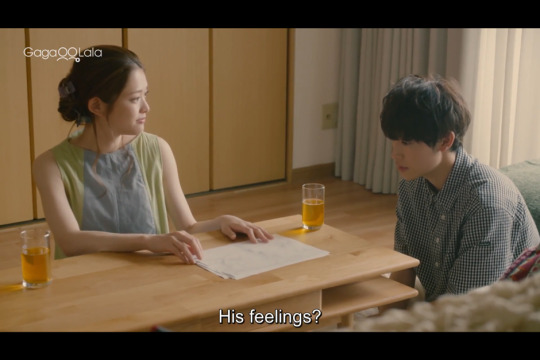
Y: あの人の気持ち?
Y: That person's feelings?
Yoh's pretty much stuck to the phrase "that person" when referring to Segasaki this whole episode, even during his flashback. He tends to do this when he's feeling some distance between them (like in Ep 2).
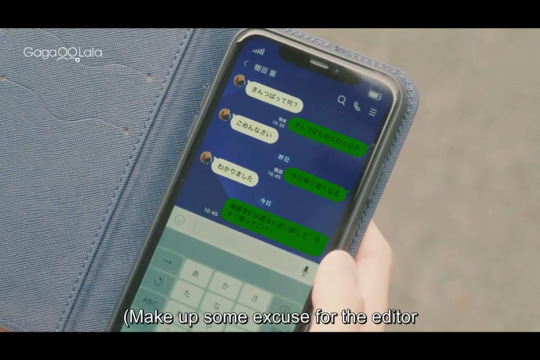
On screen messages:
Y: What is Kintsuba?
S: You don't even know what Kintsuba is?
Y: I'm sorry
[Yesterday]
S: I'll be back late today
Y: Understood
[Today]
(unread)
S: Just give the editor some kind of excuse, and come back right now
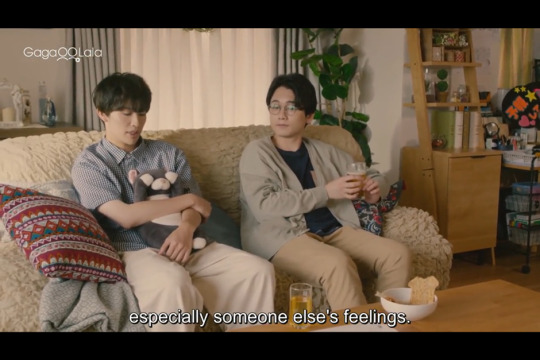
A: 随分 追い込まれてたねぇ
Y: 気持ちを言葉にするとか あんまりしたことなくて
Y: 他人の気持ちなんて なおさら
A: You've pretty much been cornered, huh?*
Y: Putting feelings into words and all... I've never really done that myself...
Y: Let alone (doing that for) another person's feelings.
*This is in reference to Man-san asking Yoh to write out Segasaki's feelings
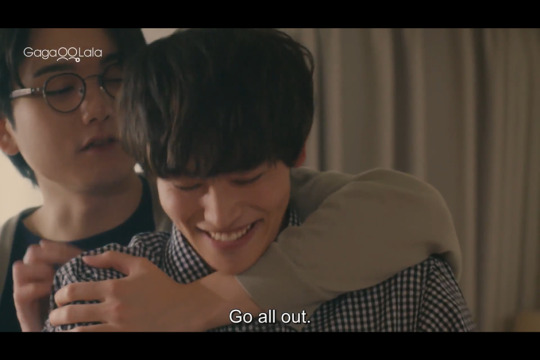
A: めちゃくちゃにしてやる, めちゃくちゃにして..x10
A: Gonna mess you up, mess you up... x 10
Yes, this does sound like a line straight out of a bad Jp AV 🤣🤣. I mean, we're talking about scenes from Man-san's manga right? That they had to mosaic out? 🤣🤣
Now you know why Segasaki is pissed.

S: 可奈美さんも一緒に仕事してるんですか?
M: すみません!瀬ケ崎さんにご報告もせずに進めてしまって
S: いや、可奈美さんのせいじゃないですよ
S: Kanami-san, are you also doing your work together with him?
M: I apologize! We ended up moving forward without even alerting you about it!
S: No, it's not your fault, Kanami-san
You can tell Segasaki has misunderstood here - he thinks Man-san has also been called to work at this Editor's place, and is completely not listening to what she has said, hence her ?? reaction 🤣

S: あ、すみません
急用ができてしまったので葉を迎えに来ました
S: Ah, I apologize
An urgent matter arose, and so I've come to pick Yoh up.
Segasaki's being quite formal here, but this is not the way to be polite. The "proper" way to request leave to go home early on behalf of someone else would be to first, apologize specifically for the disruption, introduce yourself and your relation to that person, apologize that an urgent matter has come up, regrettably but firmly insist that said person must return home immediately on pain of death, apologize again for all the trouble caused, promise to make up for it, humbly ask for understanding, and then apologize your way out the door.
So yes, despite the polite word forms this is quite rude, and is so far removed from Segasaki's usual "public mode" that it cracks me up. Segasaki's composure is unravelling by the second in these next few scenes - he is pissed and absolutely does.not.give.a.shit. 🤣

From right to left:
S: So, this bastard is the famed Editor huh...
S: Don't you dare try to deceive and pull tricks on Yoh!
S: The hell you doing touching him like that so freely!!
A: Who (is this)?
The language gets progressively ruder the more the speech bubbles get pointy and the larger the font gets🤣🤣

M: 瀬ケ崎さん やっぱ強いわ~
M: Segasaki-san really has a strong presence after all~
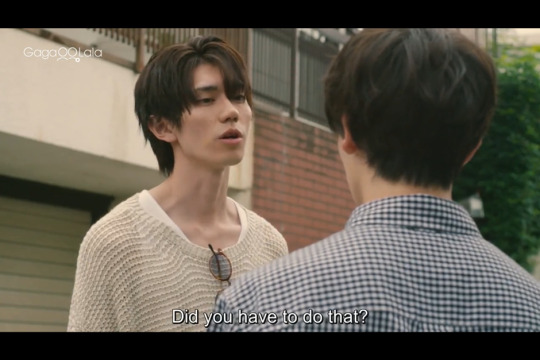
Y: 黙っててごめんなさい*
S: あのさ
Y: はい
S: ああいうのがいいわけ?
Y: え?
S: 俺より あの男のどこがいいわけ?
Y: I'm sorry for keeping this from you!*
S: Tell me
Y: Yes
S: Is that what you like?
Y: Huh?
S: Compared to me, just how is that guy better?
*Yoh uses the full but informal version of "sorry" here - gomen nasai. Making a note of this here so I can come back to it in one of the analysis posts.
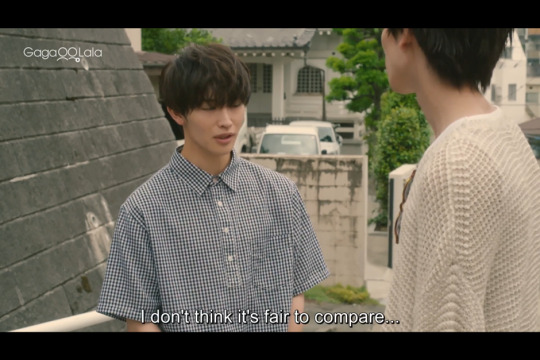
Y: え、いや
Y: 比べるものじゃないと思うけど。。
S: あるんだろうが 俺より いいところが
S: まあ、納得する理由がない限り俺は認めねえけどな
Y: 強いて言えば 優しいかな*
Y: 人の話を ちゃんとじっくり聞いてくれるし
Y: Um, no...
Y: I don't think it's something that can be compared...
S: There is something, isn't there? Some way in which he's better than me
S: Though, unless you give me something I think is reasonable I won't accept it
Y: Well if I had to say something then... maybe, he's kind?*
Y: I mean, he listens carefully and attentively to what someone has to say...
*優しい (yasashii) - often translated as "kind", it encompasses the ideas of "caring", "tenderness", "thoughtful/considerate", "warm/gentle". It's often a trait people say they look for in their significant other.
This word has come up often to describe Segasaki - in Ep 2, Segasaki uses it to describe himself, in Ep 3, Yoh uses it to describe Segasaki's voice, and of course here in Ep 6, red shirt uses it to describe Segasaki again. Even when the word isn't said out loud, a lot of Segasaki's actions would fit this word - In Ep 2, when he picks up after Yoh and comforts him during their not-argument. In Ep 3, when he passes Yoh his gift, and implies there's nothing to be sorry for. In Ep 4, the way he coaxes Yoh. In Ep 5, when he takes care of Yoh. In Ep 6, he speaks up for Yoh in the cafeteria when he doesn't have to, when he goes to help Yoh. The irony of this moment is that Segasaki puts in a lot of effort and probably does pride himself in being yasashii, and he listens to Yoh better than Yoh listens to himself, and yet he hears from Yoh that he isn't yasashii or attentive, which explains the pained expression on his face.
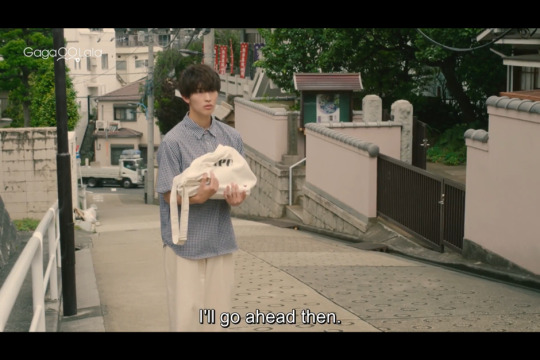
S: あ、そう
S: 俺先行くわ*
S: Oh, is that so?
S: I'm going ahead then*
*わ (wa) - this ending particle puts emphasizes one's statement, but is not one that Segasaki usually uses. It's less forceful that his usual speech, because he's quite hurt by Yoh's statements.
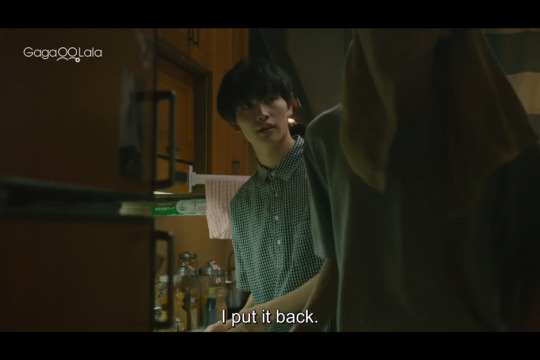
Y: かばんに入ってたやつ 戻しといてから
Y: The thing that was inside my bag, I put it back so...
The way Yoh ends this sentence leaves room for a follow up - it's an invitation to continue the conversation, which we actually have not seen him do with Segasaki, and that's why he looks so dejected when Segasaki rejects that invitation by walking away.
Though it's been hinted at throughout the show, Ep 6 is where we get confirmation that Yoh's just never quite fit in with the crowd, and that Segasaki has always been in the center of it. The stark difference explains why Yoh is so afraid that one day he will do something to make Segasaki hate him, and why he reflexively rejects the idea that Segasaki could possibly love him.
This episode is painful, for both of them. For Yoh, because from the intensity of his monologues, we finally get a sense of how big a presence Segasaki is to him, and therefore, how devastating it would be to lose him. For Segasaki, because for all that he can read Yoh, for all that he has done to try and reassure Yoh of his love, he still cannot make Yoh see, cannot make Yoh hear.
"If he ended up hating me then I felt like I might die."
It is precisely Yoh's love for Segasaki that makes Yoh fear the possibility of losing him, and it is that fear that blinds, deafens and mutes Yoh to the very thing he hopes for. And it is in trying to protect himself, that he inadvertently hurts the very person he loves so much.
#my personal weatherman#taikan yohou#体感予報#MPW subtitle corrections#mytranslations#segasaki x yoh#Ep 6 has given us a lot of context about these two#and reinforces again that it doesn't matter what Segasaki might say or do#Until Yoh sees the good in himself#he's not going to overcome that fear#Segasaki literally gives up his best ability here#he let's his composure slowly unravel throughout this whole ep#he loses the very thing that triggers Yoh's feelings of inadequacy#and yet Yoh doesn't even notice#ahh this is what happens when you love a “my pace” person
151 notes
·
View notes
Text
MPW Ep 4 Subtitle Correction
Masterlist: EP 1 || EP 2 || EP 3
We have another change in director this episode, to Yasumura Emi, though the script is still being written by Funabiki Shinju (the director for Ep 3). This week's twitter space didn't have much info, so I won't be including it.
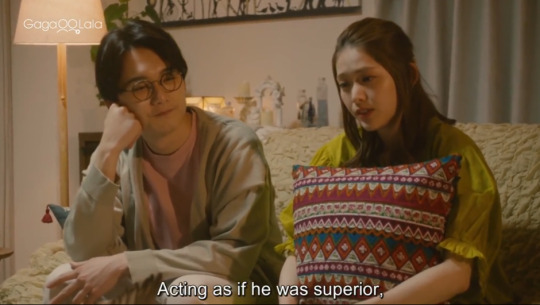
M: いや~瀬ケ崎さん強かったわ~
M: あの物腰で*マウンティングされて
M: いっそ快感を覚えてしまった
M: No but, Segasaki-san('s presence) was really strong
M: The way he *asserted (his relationship with Yoh) like that
M: (rather than being upset), I felt even more delighted!
*This is a (rather unfortunate) loan word from English - "mount" or "mounting" 😅, in this case, pretty much means to "one-up" someone else, or to brag about something to another. If you do not wish to have a weird mental image in your head, please skip the next paragraph.
This word appears to have morphed from the observation that monkeys, when trying to move up a rank in the chain of command, tend to jump on the back of another to assert their dominance (not scientist just translator also low-quality source don't keel me plz). - In other words, if I watch the Jp RAW MPW a full 8 hours before everyone else and spazz about it knowing full well no one else understands what was said then I'd totally be moun--- AHEM (sorry 😂)
What I mean to say is, in this episode, Segasaki all but screams "MINE" in the most thinly veiled, polite manner possible, so let's see how he does that. If you read nothing at all, the last scene with them cuddling has an important correction you should skip to. Same translation disclaimer applies, Ep 4, let's go~!
(I see a lot of people saying some of their thoughts/suspicions were confirmed in the tags of the previous posts, so feel free to chip in with what you think! MPW deserves more discussion!)
Sorry I am incapable of summarizing, the post is crazy long and I've hit the 30 image max. As such, not every scene will be screen capped and I won't be transcribing the original subs anymore...
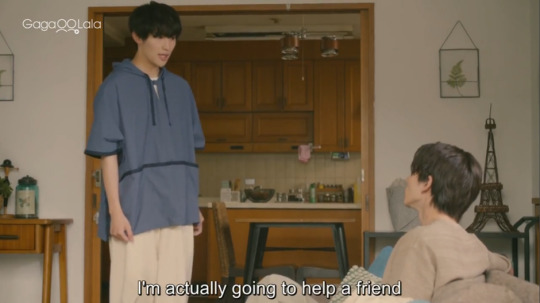
Y: あ、いや、友達の漫画を手伝いに行ってきます (-masu form)
Y: Ah, no. I am going to help a friend with their manga.
Yoh shifts up a speech level here, (he started the episode out speaking casually) using the -masu form to make an announcement -he's trying to emphasize his determination to go because he’s nervous about saying it.
S: はあ? どういうつもりで
S: Huh? For what intention?
The "haa?" here has a more "excuse me?" feel, and the next line is interrogative - so all in all it has the same energy as: "Excuse me? What is going through your head?"
S: つぅか友達って誰だよ
Y: よく通話してる…あの
S: やっぱりあの女か
S: Actually, when you say "friend", who do you mean?
Y: The one who… I speak to a lot on the phone…
S: So, it’s that woman after all huh?
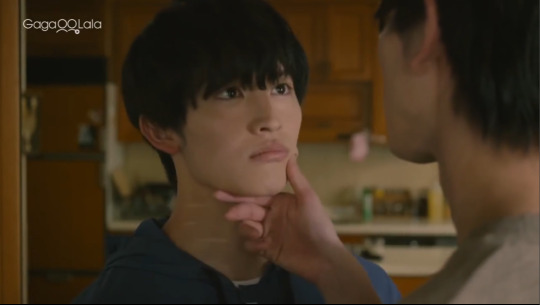
S: だめ
Y: え?なんで?(plain form)
S: 俺が家にいんだから家にいろ (word contraction)*
Y: でも約束したし (plain form)
S: あの女には行けなくなったって言え*
S: No.
Y: Huh? Why?
S: I'm staying at home so you stay at home*
Y: But, I already made a promise
S: Tell that woman that you can’t go any more**
*This line, together with the starred line below, is extremely direct, (said in the same style as his not-proposal actually) and is clearly an order.
**This line is literally "to that woman, say 'I am no longer able to make it'" (Though the speaker may not actually mean to use those exact words)
Segasaki has dropped a speech level here not so much by using "rude" forms but by being extremely blunt and direct. What he's saying implies he's being possessive of Yoh, but the way he says it also stresses his power in their relationship. But again, note that Yoh's replies are all in plain form - he hasn't shifted up a level in response, as he usually does when addressed so directly. In fact, the way he words his protest carries some indignation - using "し(shi)" at the end like this indicates that this "promise" is but one of the reasons he has for going - which is why Segasaki cuts him off. Yoh might sulk and pout about being ordered, he's still comfortably seated in his usual informal speech level, which means at this point he's still feeling secure about where he stands and definitely isn't intimidated.
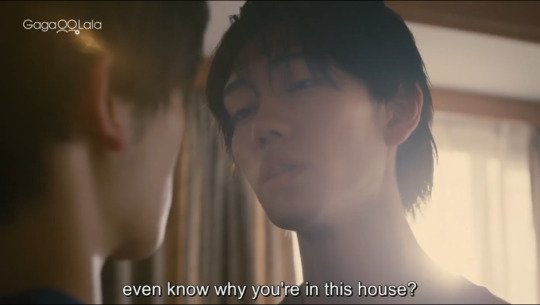
S: お前さ*、何で自分がこの家にいるかわかってんの?
S: You*… do you even know why you’re in this house?
*Here Segasaki uses the sentence-end particle "さ(sa)" after the word "you", which in this case has the same feel as "now look here". He also ends off his question with "の(no)", which can have many meanings, but here functions again as an assertive particle, implying that this is a rhetorical question, because he thinks Yoh should know the answer. Unfortunately, Yoh has the wrong answer 😅 (which Segasaki will realize and attempt to address in Ep 5)

Y: この人のやばさ*を一瞬でも忘れていた俺がバカだった
Y: I was an idiot - to forget, even for a second, how insane* this person is
*やばさ (yabasa) - this word comes from "yabai" and is a slang word that has evolved much like the words "crazy/insane" and "shit" have evolved in English - it can be used both positively and negatively to describe someone who's extreme, for eg "that guy is yabai (so cool!!)" vs "that guy is yabai (stay away)". Here, Yoh's referring to Segasaki as yabai for even thinking up this so called "slave contract" - which is what he assumes Segasaki is referring to.
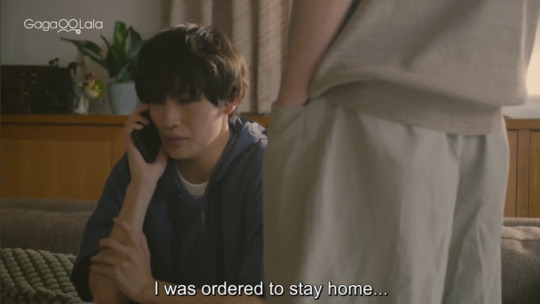
Y: ごめん、いろいろあって
Y: あ、いや、まあ、なんていうか、家にいろって言われ
Y: あ、いや、なんでもない。とにかく本当にごめん
Y: 今度なんかでお返しするから
Y: Sorry, a lot happened
Y: Ah, no, well, how do I say this... I was told "stay at home"
Y: Ah, no, it's nothing. Anyway, I'm really sorry
Y: I'll make it up to you next time, okay?

S: よくできました
S: Well done.
This is the same phrase we talked about in Ep 3, the stamp of approval. Again, Segasaki is emphasizing his role in relation to Yoh here.

Y: あの満足そうな後ろ姿
Y: 本当腹立つわ
Y: That silhouette of his, so full of satisfaction as he leaves,
Y: Really makes me irritated!*
*Yoh ends off with the particle "わ (wa)", which mostly just emphasizes his emotion, but is a softer assertive particle than the ones Segasaki uses.
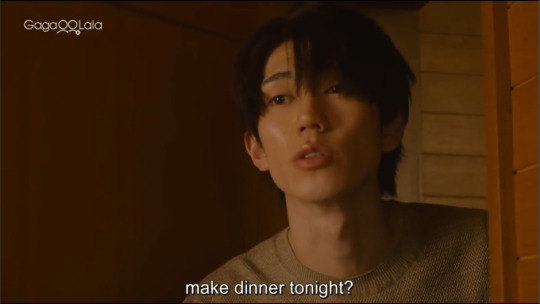
S: 夕飯、作ってくれてもいいんだぞ
Y: はい
Y: 俺はいつでも稼働する家事ロボットじゃねぇんだよ
S: Dinner - it's fine for you to make it for me, you know
Y: Yes
Y: I'm not some housework robot that you can just activate at any time you know!
The original subs made it sound like Segasaki was asking Yoh if he could make dinner, but that's not the case - he's literally telling Yoh to make it, and on top of that, he says it like he's doing Yoh a favour (by allowing him to make dinner) 🤣🤣 This time though, whether it's just cause Yoh's been caught by surprise or not, he answers properly with "Yes (Hai)".
Y: いっそロボットになってこの感情を無にしたい
Y: (If it was going to be like this), I rather just become a robot, and turn these feelings into nothingness.
The focus of this line is mostly on Yoh preferring to become a robot in order to mute his feelings, but the sentence structure suggests that there is something to be inferred preceding this sentence, hence the bracketed bit. (It becomes clearer later on, especially in light of his monologue)

"Dayo-chan" is a pretty familiar nickname, something you'd expect a child to be called rather than an adult, unless it is a nickname between childhood friends. It implies a closeness/intimacy between the speaker/listener, hence the the look of horror on Yoh’s face (because he knows that is going to kick Segasaki into high gear) and the surprised disbelief (that someone would dare make a grab for Yoh) on Segasaki’s face. Kills me everytime 🤣
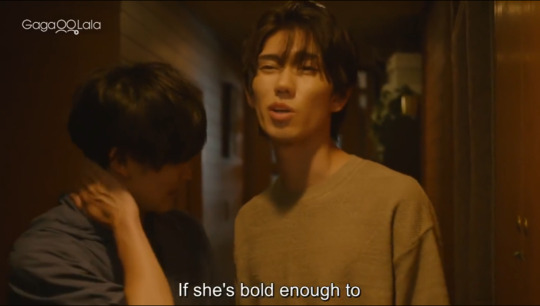
S: もしかして例の女か
S: 家まで押し掛けるとはいい度胸してんな
S: Don't tell me it's that woman from earlier?
S: She's got some nerve, turning up at the house like this

Y: それはだめ それだけは絶対だめ
Y: No, not that, anything but that!

S: うれしいな 葉がいつもあなたの話をするので
S: 一度お会いしてみたいと思っていたんです
S: はじめまして、瀬ケ崎瑞貴といいます
S: 葉がいつも お世話になってます
S: What a delight, Yoh speaks of you often so
S: I've always thought it would be nice to be able to meet you.
S: I'm Segasaki Mizuki, pleased to make your acquaintance.
S: Thank you for always taking care of Yoh.
This is like, textbook formalities🤣 Practically every statement is a "standard" greeting and is very polite (hence the weirdly stiff english translation) except Segasaki says it in a way that makes it clear he speaks for Yoh, that Yoh is part of his in-group. (Legit, might as well plant a flag in the soil that says "Yoh is mine".) He sounds exactly like how parents sound when they meet their child's teachers, or how a spouse/older family member might sound when meeting their loved ones' co-workers. This is how it comes across:
What a delight, Yoh speaks of you often so I've always thought it would be nice to be able to meet you - Sounds distinctly familial. Implies Segasaki is close enough to Yoh that Yoh shares his thoughts with him often. Also shows that Yoh tells Segasaki about Man-san, rather than the other way round.
I'm Segasaki Mizuki, pleased to make your acquaintance. - standard, formal greeting
Thank you for always taking care of Yoh. - standard greeting, literally "Yoh is always in your care" - You usually say this (for yourself) when you thank your teacher/senior/boss/important client. So, when you say this for someone else, you are claiming this person as your family, or someone in your in-group (a close friend, or at work, a junior).
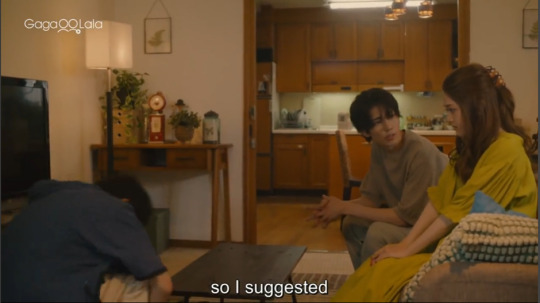
S: すみません 今朝 葉が体調をくずしてしまって
S: 家でゆっくり休んだ方がいいんじゃないかって
S: 僕が言い聞かせたん*です
S: ご迷惑をおかけしてしまってしまって すみませんでした
S: I apologize, this morning, Yoh wasn't feeling well so
S: I convinced* him (not to go) saying,
S: "wouldn't it be better to stay at home and rest properly?"
S: I sincerely apologize for the trouble this has caused you.
* 言い聞かせる (translated as convinced here) this word is usually used when someone of higher standing tells/explains something to a person of a lower standing, and carries the nuance that they've managed to get the latter to accept/agree with what they say. It can also be translated as "told/persuaded/instructed/warned/admonished", and used in sentences like "I warned the kids not to run" or "The teacher told the students lying was wrong" - so that might give you a better idea of what Segasaki is implying here. I've used "convinced" here rather than "instruct" because Segasaki is, in general, speaking very tactfully to Man-san - but his meaning is still clear to anyone paying attention - Segasaki has a big enough role in Yoh's life that he not only can apologize on behalf of Yoh for not being able to fulfill the promise to Man-san, he also has a big enough say that Yoh will listen to his decisions.
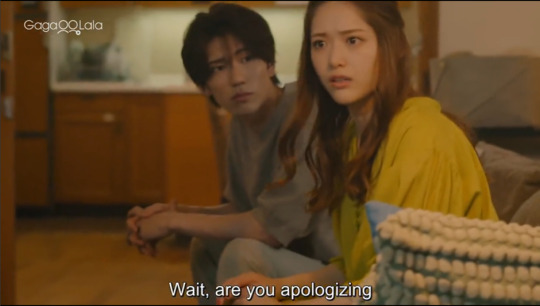
M: いや、あんたがダヨの体調不良を詫びるんか
M: むっちゃ身内面*するやん
M: Wait, you are apologizing for Yoh being unwell (and unable to come help)?
M: Isn't that a super intimate* (gesture)?
*身内面する is literally "to show one's inner-circle face/side", ie the side of you that you show to your inner-circle/in-group ie your family. Hence this line reads more like "Wait, you're apologizing for Yoh?? Who are you, his family??"
Because of the emphasis on group identity in Japan, it's very common to apologize/take responsibility for the actions of another group-member, even if you had nothing to do with it. So here, Man-san has picked up on what Segasaki has been implying since the beginning - that Yoh is part of his in-group, and a very close one at that.
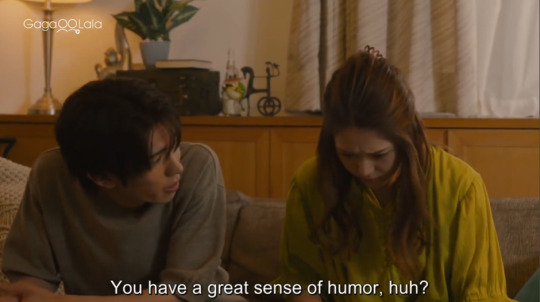
S: お茶目な方なんですね
S: You've got such a sweet and funny personality, don't you?
The word Segasaki uses here describes a person who tends to be naturally sweet and lovable, maybe a little silly but without any ulterior motive. It's a compliment in most situations - which is why Man-san gets all embarrassed - but can sometimes come across as slightly patronizing, like how calling someone "naive" can. Note that Segasaki is still being very polite here and effectively holding Man-san at arm's length, despite the seemingly friendly/open dialogue.

S: だから そう言っていただけると うれしいです
S: So, to hear such nice words from you, makes me really glad.
S: ところで 可奈美さんはどこで 葉と お知り合いに?
S: By the way, how did Kanami-san come to be friends with Yoh?
The whole dialogue where Segasaki responds to Man-san's fangirling basically sounds like how an idol would speak to their fans - it's very polite and uses deferential/humble verb forms to further indicate gratitude for the support, because Segasaki is answering Man-san in the context of his work. When he asks about Yoh, he switches back down to a normal speech level, but also uses her first name - Kanami-san, which whilst very charming, is totally NOT normal (with the sparkle effect and the wine, I can't help but get host club vibes from this lmao) because you only do that with people you are close to. Man-san is obviously flustered by this, and Yoh is understandably unhappy about the sudden familiarity Segasaki displays with Man-san (I personally think he's still trying to be disarmingly charming whilst he evaluates just how big a threat Man-san is🤣🤣)
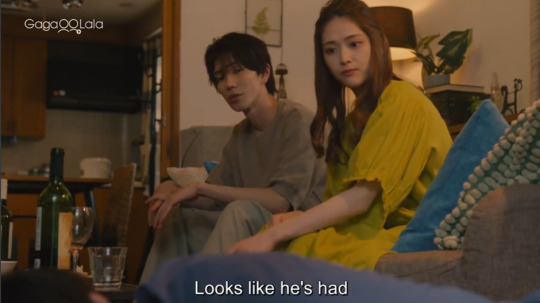
S: ずいぶん飲んでると思ったら
S: I thought he'd been drinking quite a bit
Again, this implies that Segasaki knows Yoh well enough to know his alcohol tolerance.
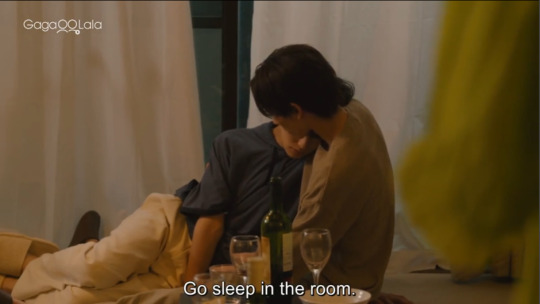
S: 寝るなら部屋いきな*
S: If you're going to sleep, then go to the room alright?
*いきな (ikina) - the "na" here is different from the sentence-final particle "na" we saw in Ep 3. This is short for "nasai", as in, "ikinasai", which is a polite but sharp way to say "please go (somewhere)". This sort of wording is most commonly used by parents towards young children when giving instructions like "please sit properly" or "please eat your food quietly". It's used between teachers/students, seniors/juniors etc, and sometimes amongst friends too. You absolutely should not use it with someone above you in the social hierarchy. The short version used here though, softens the tone a lot, and adds a very tender, homely feel to the sentence. Segasaki is literally coaxing Yoh to bed as a parent would a very young, sleepy but reluctant child.

M: 本当に恋人なんだなって感じです
M: ようやく現実味が
M: "(You two) are really a couple!" - that's the kind of feeling I get
M: It's like it finally feels real
The way Segasaki literally puffs up with pride and hugs Yoh closer... (ಥ◡ಥ)
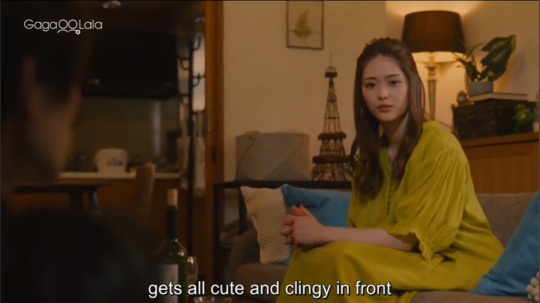
M: ダヨちゃんって彼氏の前だと こんな甘えた*になるんですね
M: なんかちょっと意外かも
S: いやお酒様様ですね
S: ふだんはそっけないですよ
M: So Dayo-chan actually becomes so cute and affectionate* in front of his boyfriend
M: I kind of didn't expect that, I think
S: No, it's really all thanks to the sake
S: Normally he's pretty indifferent
*甘えた (amaeta) is the kansai dialect version of 甘える (amaeru), referring to the concept of amae.
Amae is a rather complex thing to explain in English and really deserves its own post. For simplicity's sake, what Man-san means here is that she's surprised that Yoh is actually able to express his desire to be treated affectionately and indulged in - something that requires a lot of trust in Segasaki and a willingness to be vulnerable in front of him.

M: おぉ、確かに。ダヨちゃん素直*じゃないからな
M: あまのじゃく**っていうか まあそういうとこあると 困っちゃいますよね
M: Ohh, that's true. Cause Dayo-chan isn't able to be honest* with his feelings
M: "Contrary"** is not really (the word to use) but... he does have a bit of that in him so.... (dealing with that) can be a bit of a handful don't you think?
The way Man-san phrases her last line implies that she also has to deal with this side of Yoh, and by ending off with the particle "~ne", she is seeking Segasaki's agreement that they are both sort of in the same boat when it comes to that (she doesn't do this consciously though, which is why she freaks and apologizes later)
*素直 (sunao - translated as honest here) is another term you'll often see when talking about feelings/relationships, and is also somewhat of a complex topic with many different possible translations, depending on context. It is closely related to amae, because in order to express your desire to be indulged or to receive affection, you first need to be able to admit to yourself that you want that.
**あまのじゃく (amanojaku - translated as contrary here) - this is a small demon from Japanese folklore, who was of an extremely contrary nature and would often mimic both humans and gods. It had the ability to see into one's heart and would then do the exact opposite of what one desired. Thus, this term is now used to describe people who intentionally go against the wishes of others, who are stubborn/unable to admit when they are wrong, or who twist themselves into a pickle/cannot be truthful about how they feel. It's not used in a complimentary way, which is why Man-san says Yoh's not quite like that, but there are some parts of him that do sort of fit the description.
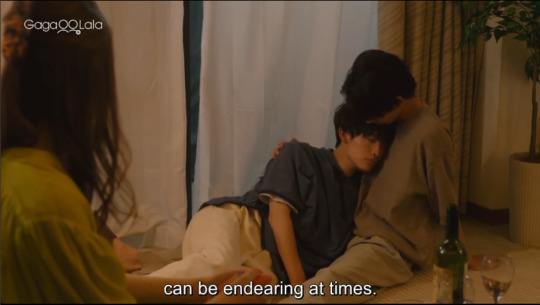
S: やだな* 葉の素直になれないその不器用さが 余計にかわいいんじゃないですか
S: ね?
S: That's not nice*... Yoh's inability to be truthful about his feelings - it's precisely that awkwardness that makes him even more adorable, isn't it?
S: Wouldn't you say so?
*Segasaki's first line "やだな (yada na - literally "this is unpleasant/I don't like that")" is not directed at Man-san, it's a form of soliloquy (which is common in Japanese), aka he's talking to himself here. We know this because it's informal and ends with the emphatic particle "~na". He then switches back to polite speech for the rest of his sentence, which is directed at Man-san. So, "that's not nice" is actually him remarking on the unpleasantness he feels after hearing Man-san describe Yoh as contrary, just as you might walk past a pile of rubbish on the street and remark, "well that's unsightly".
Of course, the fact that he's actually saying this at a volume that Man-san can definitely hear and the way he sort of drawls it out, makes it clear that he definitely meant for her to know his disapproval behind the politeness of his following sentence (See what I mean by "thinly veiled politeness"?). On top of this, ending it off with a "ne?" (the same ending particle she used to seek his agreement) as he looks up right at her makes it clear - this whole sentence is a (mild) rebuke.

M: 分かったような口を利いてすんませんっした
S: どうされました?
M: では私そろそろおいとまします
M: I'm incredibly sorry! I spoke as if I knew everything (when in fact I knew nothing)
S: What's the matter?
M: Then, it is about time for me to take my leave.
In response, Man-san ratches up the formal speech in both these sentences, though (as befitting her character) she pronounces it in a rather comical way (she sounds and acts like a samurai would in the movies 🤣). Also, don't mistake Segasaki's "what's the matter" as true confusion - his indirect rebuke was met with a direct (albeit over the top) apology - so here he is helping Man-san to save face, or recover the face she lost (by sounding presumptuous and by apologizing), by not calling attention to the actual apology. It is enough that she has recognized his superiority over her when it comes to understanding Yoh.
This is also why later, when Man-san voluntarily offers up the information that she has a husband (and thus is not a threat to Segasaki's claim over Yoh), that Segasaki gives sort of an embarrassed but happy smile as he says "I'm sorry". That's not just "I'm sorry I can't send you to the station" (which is basic manners) but also has a little "I'm sorry for the unnecessary posturing over Yoh".
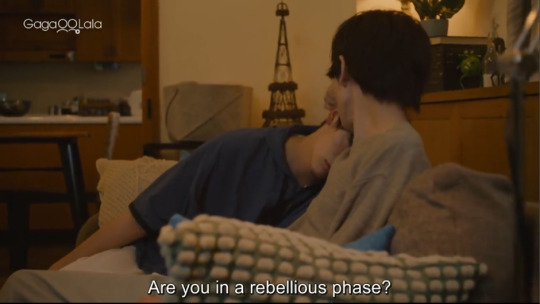
S: なんださっきから やだ ばっか言って
S: お前はイヤイヤ期*か
S: What's gotten into you? All you've been saying since just now is "no"
S: Are you in your "no phase"*?
*イヤイヤ期 - yes, the term he uses here specifically refers to the "no phase" of toddlers in their terrible twos. This isn't condescending though - Yoh's repeated "やだ (yada - "no" or "I don't want it")" is distinctly childlike, but this behaviour is precisely a form of amae that we talked about earlier. Yoh is asking to be indulged here, and Segasaki is responding both in word and in physical comfort.

Y: もうやだ
S: だから何が
Y: 俺 万さんのことすきなのに
S: は?てめぇ*
Y: あんたなんか嫌いだ
Y: へらへらしてんじゃねぇよ
Y: 何 ちゃっかり横に座ってんだよ
Y: 名前で呼ぶ必要はねぇだろう
Y: ふざけんな
Y: 俺のこと好きなくせに
Y: I don't want (this) anymore!
S: So again I ask, (don't want) what?
Y: I... even whilst... liking Man-san
S: Ha? You little...*
Y: I hate the likes of you
Y: Don't freaking sit there laughing so carelessly
Y: What were you doing taking the chance to sit next to her like that
Y: There was no damn need to call her by her first name, right?
Y: The hell are you doing!
Y: When the person you like is me.
When You talks about liking Man-san, he ends off with "なのに (nanoni)" which is used to show contrast the preceeding/following topic and to express frustration - except he hasn't mentioned the preceeding topic, so it isn't immediately clear what he means until he starts complaining about Segasaki's behaviour. That's why Segasaki is caught by surprise and follows up with an angry "haa?" and an emphatic
*てめぇ(temee) - A very very rude way to say "you" which he first used in Ep 2 when Yoh said he was going to leave.
It's not until later in Yoh's monologue, that we learn that he's upset that he feels jealousy/bad feelings towards Man-san because he's supposed to like Man-san (as a friend).

S: お前 お前それやだったんか
S: お前の方が* そう思ってたんかよ
S: あ もう最っ高
S: You... so that was what you didn't want?
S: So, (all this time) it was actually you instead, who's been thinking like that?
S: Oh, this is the. best.
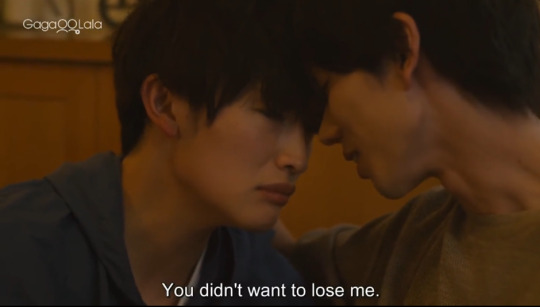
S: よしよし
S: 取られちゃって やだったな
S: There, there
S: You didn't want me to be stolen away, did you?

Monologue time:
Y: こんなふうに感じること自体が嫌だったんだ
万さん相手に 友達なのに
女々しすぎるって
幼稚だろう ダメだろうって 分かってるのに
気付いたら頭ん中 ぐちゃぐちゃで
どうしようもなくなってた
あんたのせいだ
こんなふうに
囁いたり
微笑んだり
優しく触れたりするから
いつもあんな偉そうに
ああだ こうだ命令してくるくせに
突然まるで恋人*みたいに
勘違いするだろこんなの
もしかして
好きって
こんなみっともない気持ちのことなのか
Y: The fact that I was feeling this way was specifically what I didn't like.
(Feeling this way) towards Man-san, even though she's my friend...
It was too petty (of me).
Even though I knew, that it was childish, that I shouldn't (feel that way),
Before I knew it, everything in my head was all messed up.
And then I couldn't do anything about it.
It's all your fault,
Because you do things like this,
Whispering softly to me,
Smiling at me,
And touching me so gently.
Always so arrogantly ordering me around,
Saying do this do that, and yet,
You suddenly (start treating me) like a lover*
Of course, I'd get the wrong idea with all of that!
Could it be that,
"Liking someone",
Really is a feeling as unseemly and disgraceful as this?
*恋人 (koibito - lover) - Lover in English can sometimes imply a more sexual than romantic relationship, but in Japanese "koibito" usually refers to "boyfriend/girlfriend" and may not imply a sexual component at all.

S: お前から抱きつくとかできんだな
S: ずっと酔ってりゃいいのに
S: So you actually can initiate hugs and stuff huh?
S: If only you could stay drunk forever...
And we're done!! Ep 4 marks the turning point where Yoh begins the journey towards accepting and acknowledging his feelings - the concept of "sunao". It also clearly shows the preferred way these two reinforce their relationship - through "amae". Remember how in Ep 3, Yoh talked about how he felt that an "unspoken understanding" of each other's feelings was important in a relationship? Well, this is it - Yoh saying "no" and "don't want", or leaving the room to be by himself - these are all examples of amae. He doesn't want to ask for affection directly, because he can't. So he does it through amae instead, and as we can see, Segasaki really enjoys indulging in Yoh's unspoken requests for affection and gains fulfillment from that.
#my personal weatherman#taikan yohou#体感予報#MPW subtitle corrections#mytranslations#segasaki x yoh#amae is a very important aspect of building connection in japanese relationships#as is the concept of sunao#these aren't concepts with easy direct translations to english#but they feature very heavily in this relationship#if you felt a little weirded out because their relationship sometimes can feel somewhat parental in nature#it's because the interdependence that results from amae is fundamentally different from the independence that is prized in the west
156 notes
·
View notes
Text
MPW: Segasaki & Yoh - Language Analysis Part 1
Subtitle Corrections: EP 1 || EP 2 || EP 3
My Personal Weatherman is a story about the relationship between Segasaki and Yoh, so rather than being introduced to the characters, we the audience are dropped right into the middle of their relationship, and the only way we learn about the characters as individuals is through the way they interact with each other, and how that contrasts with how they interact with the people around them.
The show does an incredible job of keeping the portrayal of their relationship consistent across the use of character design, wardrobe, lighting, cinematography, acting choice, directorial choices and of course language use. But not everyone who watches has equal access to that last one, so I try to be as detailed as possible in my subtitle corrections posts. I'm also a bit of a language nerd. Now, I want to get into their actual relationship, because I think there is a lot of information about how they feel towards each other that's just getting missed. Also I love them and this is how I spazz.
This post is the first of four in which I hope to show how the dynamic between Segasaki and Yoh is reflected in the way they speak - specifically, in the way they address each other, and the style shifting, or speech level shifts that they both demonstrate with each other, using scenes from Ep 1 - 3. I'll be using my own translations for this, some of which differ from the Eng subs. (Please bear with the nerdiness - I don't want to assume how much people know about Japanese)

Prefacing this by saying that this language analysis is made specifically in the context of Segasaki and Yoh's relationship. There is a power imbalance here both in terms of social hierarchy (senpai/kouhai, age gap, successful/non-successful) as well as self-image (self-confident/self-conscious). Now, most of the time we see this manifested linguistically as the party with more social power using casual language forms, whilst the one with less power remains polite or formal. However, there is much more to human interaction than that, as we see in MPW where both Segasaki and Yoh shift in and out of Speech Styles often, depending on what they want to say and accomplish, as well as their emotional state.
1) Quick & Dirty Guide To Speech Styles/Formality Levels
Formality/Politeness is a spectrum and is expressed mostly through grammar and tone (sorry for the shitty word doc screencap):

1) desu/masu = formal/polite. Standard go to with the anyone you meet.
2) Generally speaking, the longer the sentence/the more syllables you hear, the more polite the sentence
3) The less direct you can be, the more polite you will sound
4) Word contractions (tsuzukereba -> tsuzukerya) = informal + impolite (but not always rude)
5) Slurred end vowels (iranai -> iranee) = informal + mostly rude, but not always (you just sound uncouth)
6) Most words have "formal", "informal" or even "rude" variations
7) CONTEXT DETERMINES EVERYTHING
Btw when I say "speaks roughly" or uses "rough speech", I mostly mean (4) + (5)
2) Speech Styles and Shifting Between Them
tl;dr
Japanese Speech Styles function like the verbal equivalent of personal space - the more formal/polite the level, the bigger the circle of personal space you maintain.
Shifts in speech styles indicate:
1) perceived changes in vertical and/or horizontal distance
2) the assumption of a position/role of the speaker in relation to the listener
3) changes in emotional state/the desire to convey emotion
4) the consideration of "polite company"
In this post we will look at examples of the first one - Vertical and Horizontal Distance.
Speech Styles: The Long Version (English Speaker POV)
Consider the way you speak if you were to say, give an important presentation in front of potential clients, versus the way you'd speak to an acquaintance you ran into on the street vs the way you'd speak to your closest friends. Different situations call for different ways of speaking - you're more likely to speak in full sentences and pronounce your words clearly for the first situation, and say "yes" instead of "yep" or "uh huh". You're also more likely to be blunt/direct with your friends than you are with clients - "You know ILU but do not under any circumstances buy that ugly ass shirt".
These context-dependent changes in speech patterns are similar to the changes in speech styles/formality levels in Japanese. Think of speech styles as the verbal equivalent of personal space. The more formal/polite the level, the bigger the circle of personal space you maintain. Dropping a level when you shouldn't is the verbal equivalent of invading someone's personal space and can make people uncomfortable and sometimes even angry. In Japan, the baseline "distance" with the average person is the way you would speak as if you were giving a presentation. Dropping to casual/informal speech might be tolerated (just like how you can tolerate someone sitting close to you and asking some questions, but it's uncomfortable), especially if you guys are around the same age, but dropping to "what's up bitcheees" when you should be at "hey how're you doing" basically tells the other person "I don't have even the basic level of respect for you".
In the same vein, the closer you are to someone, the more welcome you are in their personal space, and thus the lower the level of formality/politeness you'll keep with them. You trust that even if you speak bluntly, they'll understand you aren't trying to insult them. When and to what extent you drop a level is usually negotiated between individuals (either directly or indirectly). Once a level of casualness is established, your friends are going to look at you funny if you suddenly get all formal with them. They might even come ask if anything's wrong, or if you're angry at them or why you sound "cold". These shifts in speech levels therefore mark more than just the vertical distance between two people (ie, differences in social hierachy), they mark the horizontal distance (ie, how close people of the same "in-group" are to each other) too.
Having said that, there are times when you will shift to a more formal tone even with your friends or family - for example, when you're hosting a game at a large party and want to explain the game rules to everyone, you might enunciate your words better or keep the jokes to the minimum in order to convey the information is clearly and efficiently as possible. Similarly, if you've been appointed the leader in a group project and need people to pay attention and listen, you might change your tone of voice to command attention. In other words, when you assume a particular position, the way you speak changes too.
Finally, the way you speak to your friends/family in the presence of others (or "polite company", as they used to say) might also change - you might have no qualms cursing up a storm with your best buddy at the bar, but you might do your best to avoid being too vulgar when you're in front of their parents or your boss/university professor.
3) Segasaki and Yoh: Vertical & Horizontal Distance
Segasaki and Yoh are part of the same "in-group" in that they are in a relationship, so the horizontal distance between them is very small and before sunny days it's a negative distance - this is shown in how both Segasaki and Yoh use informal speech with each other (they generally omit the desu/masu forms aka use plain forms, and both use the informal pronoun "俺/ore" for "I" with each other).
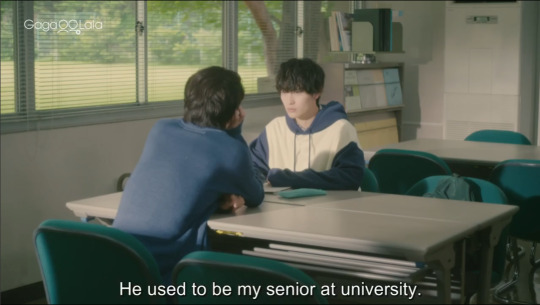
That said, there is also a hierarchy within that relationship (though their individual perceptions of that vertical distance differs) which stems not only from the nature of their living agreement, but also is likely to have carried over from their university days, when they shared a senior/junior relationship. Thus, generally speaking, Segasaki speaks quite roughly with Yoh whilst Yoh tends to use polite forms more often. Keep in mind however, that Japanese is a gendered language, and "rough speech" tends to be seen as a masculine speech pattern and can sometimes be normal between close male friends/family (otherwise, it is the verbal equivalent of getting up in someone's face and pushing them). The key here is that Yoh sticks to an informal, but more polite level than Segasaki does, and it is that difference that shows the power differential.
Horizontal Distance aka "We're Very Close"
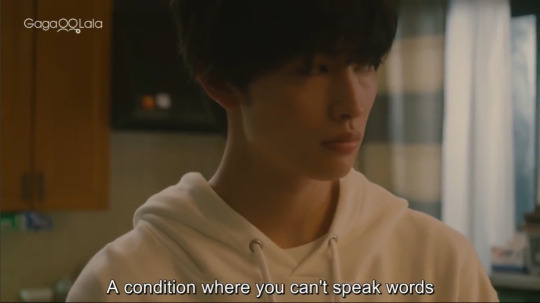
Despite Yoh's very valid complaint that Segasaki takes "man-of-few-words" to the next level (itself a liberty you'd only take with someone close to you), Segasaki only drops to rude forms in Ep 1 once:
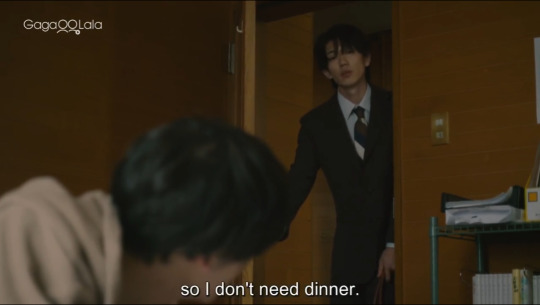
晩飯いらねぇ(banmeshi iranee) - slurred vowel
[literally - "dinner, not needed"]
Banmeshi is a more informal way of saying dinner (normal = yuu gohan).
Despite the slurred vowel, this sentence is not dismissive nor rude - it's what you'd expect between close friends/family.
In Ep 2 we hear Segasaki speak a lot more roughly to Yoh, as below, and of course during the almost-argument. But though his words are rough his intonation is often soft and he's quite tender with his touch. So, we can see that Segasaki isn't being disrespectful per se - he's not speaking roughly because he sees Yoh as beneath him in the social hierarchy - rather, he's demonstrating intimacy, familiarity and possessiveness, all at once. In fact, the more possessive he feels of Yoh, the more he drops his levels. As mentioned earlier, you only do this with people in your "in-group", with whom you know will understand you aren't insulting them.
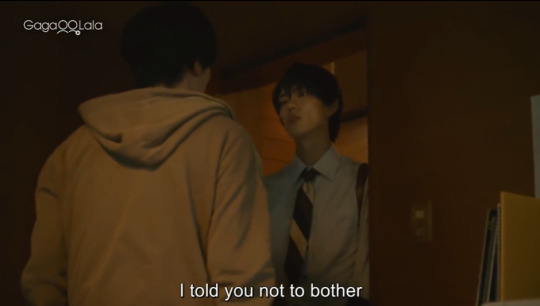
遅くなるからいらねぇっつっただろう
(osokunaru kara iranee ttsutta darou) - slurred vowel, word contraction, informal end particle
[I told you I wouldn't need it cause I'd be late right?]
Though somewhat in keeping with Segaski's curtness, this is still a pretty harsh sounding line - but note how Yoh doesn't seem offended or intimidated in the slightest - he understands that Segasaki is tired after a long day, and in return Segasaki softens his tone when he next asks "What did you make?"
Vertical Distance
It's easy to focus on Segasaki's use of rough, assertive langauge as an indicator of vertical distance, and I pointed out quite a few scenes in Ep 3 where he ends off what is essentially an order with assertive sentence-final particles. But focusing on this alone gives the mistaken impression that relationships with vertical distance go one way only - down - when in fact they are bidirectional. There is a mutual dependency between both parties, as we see clearly in MPW. Linguistically, this is portrayed through Yoh's choices to shift up a speech level.
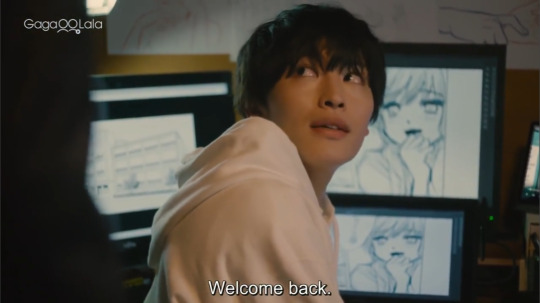
Just like how Segasaki is introduced to the audience through his proposal direct, informal and very forceful speech style, the first interaction we see Yoh have with Segasaki is a proper, standard greeting:
おかえりなさい
(okaerinasai)
[Welcome back]
Okaerinasai is the full, proper way to say this, but a more casual and common way to say this would simply be "okaeri".
See Ep 3 for discussion on standard greetings.
When Yoh thinks about Segasaki in his head, he often uses rough speech the same way Segasaki does, including the rude pronouns "aitsu/koitsu (that guy/this guy)", and yet when he speaks directly to Segasaki, he maintains an informal but still polite/neutral speech style. He rarely shifts down to rude forms, barely coming close even when drunk and emotional, but he does often switch up to a more polite level. In the above example, Yoh uses the full standard greeting in response to Segasaki's unspoken request:
俺、帰ってるんだけど
(ore, kaetterun dakedo)
[I've already come back, you know]
Ending with "dakedo" implies that speaker is going to follow up with something, usually a request or a question. In Japanese, this request/question is often left out, because the context given prior to "dakedo" is usually enough for the listener to fill in the gaps themselves. In this case, Segasaki might want a greeting or dinner, but at the very least, it's clear he wants Yoh's attention.
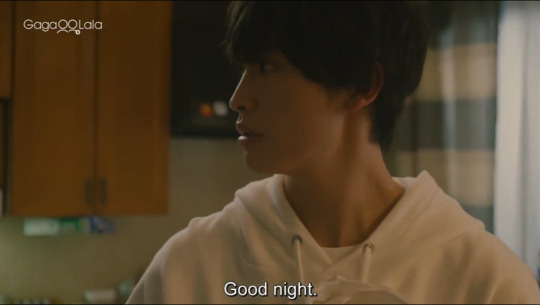
We know the standard greeting earlier was a style shift upwards because later in the episode, when Yoh says good night, he uses the casual version "oyasumi" instead of the full "oyasuminasai".
Even outside of standard phrases, Yoh's baseline is informal but not rude:
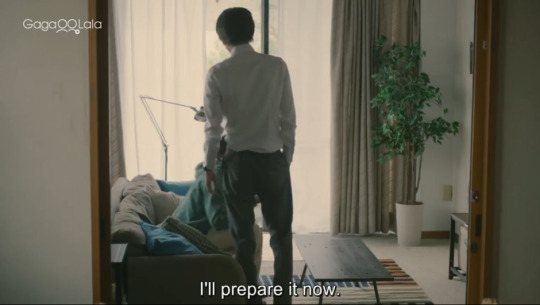
あ、いま準備する
(Ah, ima junbi suru) - plain form
[Ah, I'll prepare it now]
Probably the most telling is in Ep 3, when he's caught off guard whilst folding laundry.
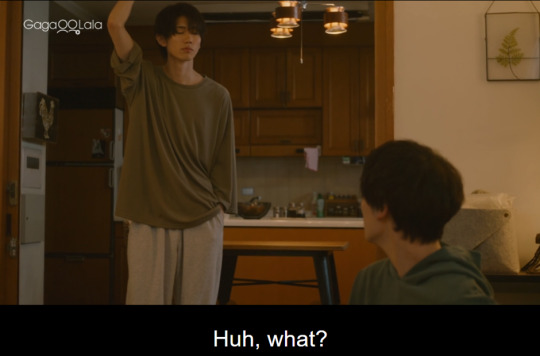
あ、なに?
(Ah, nani?) - plain form
[Oh! What?]
He answers Segasaki naturally, with just a word, as opposed to a proper “Hai/Yes?”, which he’s done sometimes when he’s unsure of himself, or if he's addressed directly.
So, we've established that Yoh’s baseline with Segasaki is informal but not rude - he feels comfortable enough with Segasaki to default to casual speech, but he acknowledges the power differential between them by simultaneously accepting Segasaki's rough speech as well as not dropping to it himself. This also tells us that the shifts up to formal/polite speech are deliberate and mean something. In EP 2, the shift demonstrated his insecurity surrounding his jealousy and their lack of physical affection, whereas in EP 3, he does it as a way to convey his gratitude.
In the next part, we'll look at how both Segasaki and Yoh use speech style shifts to convey emotion as well as to assume a particular position. Hope you enjoyed this!
#my personal weatherman#taikan yohou#体感予報#MPW language analysis#sociolinguistics#japanese language#mytranslations#MPW subtitle corrections#segasaki x yoh
152 notes
·
View notes
Text
MPW Ep 2 Subtitle Corrections
Subtitle Corrections: Ep 1 here
Cultural/Language Tidbits: Ep 2 here
Same translation disclaimer applies. Thanks to everyone reading the first post and geeking out with me in the notes, I really appreciate it XD Ok, Ep 2, let's go! Sorry in advance for the length!
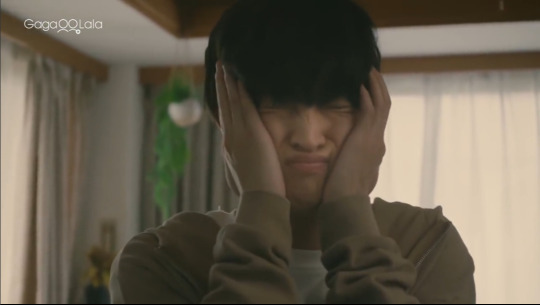
If you're wondering why Yoh's freaking out about the rainy season even though they've been together for 3 years, the manga artist posted a clarification on twitter:
By the way, “it’s been 3 years since then” – that phrase refers to it being 3 years since that conversation regarding the slave contract. As for living together, they’ve only just started (to do so) around Mar/April*, so (at this point) it’s only been a few months (for them).
What if (I) got it wrong…. I remember making a note of it, but the file that I wrote it in and passed over (to the crew) couldn’t be found right, so… (was it) a dream?”
*Japan's rainy season comes around June/July, so this means that this is the first rainy season these two have been experienced together.
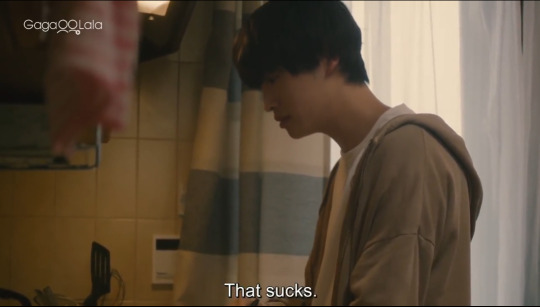
[Y: まずっ]
Y: Tastes bad
In case the original "that sucks" sounds like Yoh might be talking about the news of the young forecaster - he's really just talking about the food here.
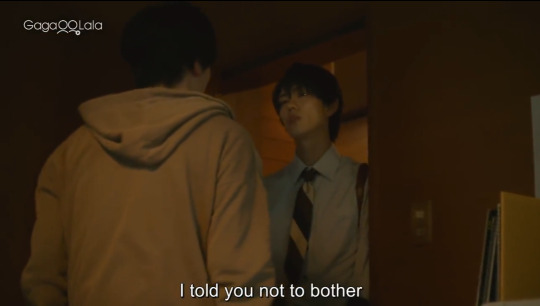
[S: 遅くなるからいらねぇっつっただろう]
Original: I told you not to bother since I returned late
Mine: I told you I wouldn't need it cause I'd be late right?
This is actually a pretty harsh sounding line tbh. It's sort of inkeeping with Segasaki's curtness, but still pretty harsh - so this tells us he's tired after a long day, and explains the frown on his face that Yoh just wipes away with his cuteness

Nikujaga literally means meat and potatoes. It's a stewed dish and a very well-loved comfort food. Super easy to make too (link goes to an easy to follow recipe, and the site also explains a little about the dish).
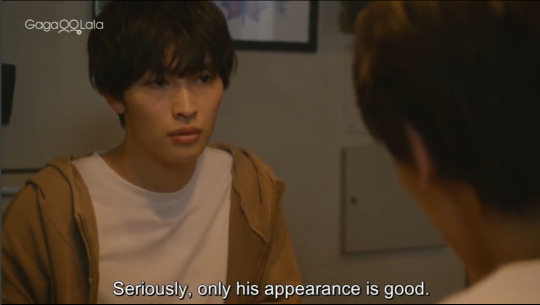
[Y: 本当、顔だけはいいよな]
Y: Really, it's only his face that looks good.

I've talked about this in my cultural/language tidbits for this episode (linked up top) but I'll add it here for completion's sake
[Y: あ、いや。なんでもない…です*]
(Ah, iya, nandemonai…desu*)
Y: Ah, no, it's….nothing*
Yoh let's his sentence trail off before tacking on a "desu" at the end. "Desu" is an ending verb characteristic of "polite" speech, which Yoh doesn't use frequently with Segasaki (in fact, by this point, he has not used polite speech with Segasaki at all, except for maybe saying the full form of the word "welcome home", and even that's pushing it). Here he adds it at the end as an afterthought (the polite form of "iya" would be "iie", if he had wanted the whole sentence to be polite from the get go), which tells us that Yoh's feeling a little off-kilter here, and does introduce the slightest distance between him and Segasaki. We'll see this distance increase as the episode goes on.

[Y: いや、どう考えても食べ過ぎだろう]
Y: No but, no matter which way you look at it, (he's) eaten way too much hasn't he?
Btw, if your hair started standing at the spoon scraping the pot - in the manga artist's post about visiting the shooting venue (as well as during Ep 1 twitter space) it was mentioned that Mashiko, the actor, can actually cook, so during filming they had to tell him what someone who can't would likely do, and also asked him to do the housework poorly (because Yoh's not supposed to be good at cooking or housework hahaha)
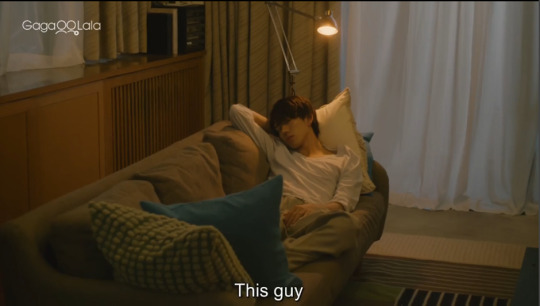
この人*、明日も朝早いんだよな。たぶん。
Original: This guy, has an early morning again tomorrow. Probably.
Mine: This person*, has (to leave) early tomorrow morning too. Probably.
*The word here is "kono hito", literally "this person". There's actually nothing wrong with the translation "this guy" tbh because that's a fairly neutral term in English, but I'm highlighting it here because in his monologues, Yoh usually refers to Segasaki using much rougher language, such as "koitsu, aitsu", except when he addresses Segasaki directly in his head. I'll talk more about how Yoh addresses Segasaki in the analysis post, but for now - this sentence hints that Yoh has clocked Segasaki's tiredness (subconsciously or not) and is feeling a little bad for him. Then again he quickly hides that by adding on "probably". (Adding the word "probably" behind your sentence is a common way to express doubt/negate what you just said, and incidentally is commonly used by comedians to deliver a punchline).
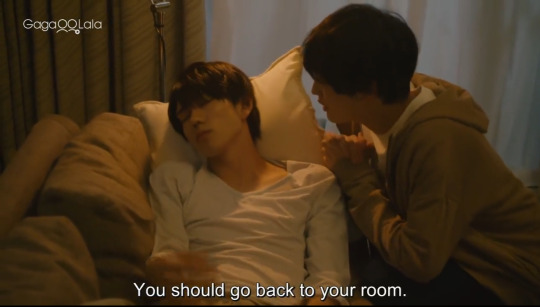
[Y: あの*…あの…寝るなら部屋でとおもって。]
Original: Um… Hey… You should go back to your room.
Mine:
Um*... Um... if you're going to sleep then, (it would be better to sleep) in your room - at least that's what I thought...
*"あの…" (ano…), translated as "um" here, is a common sound you use when you want to get someone's attention but don't want to sound too demanding - it actually isn't being polite per se, but it does show the hesitancy with which Yoh approaches him. Contrast this with the way Segasaki gets Yoh's attention (so far it's just been "Yoh" or "Oi" - the latter of which you would NOT use unless you were close to the person, or looking for a fight).
As a general rule of thumb, the level of politeness in Japanese is directly correlated with the length of the sentence and just how far you can beat around the bush. So, Yoh's suggestion that Segasaki goes to sleep in his room is literally just "if sleeping, then room..." and everything else in that translation is assumed. He may not being using polite speech forms here (that would be "to omoimashita" instead of "to omotte") but this is still a common way to be polite because he's making a suggestion that is so mild Segasaki can choose to ignore it. This is a great example of Brown & Levinson's "negative politeness" which we'll revisit when analysing their speech patterns, and which you can read about in entirely too much detail here (free to read).
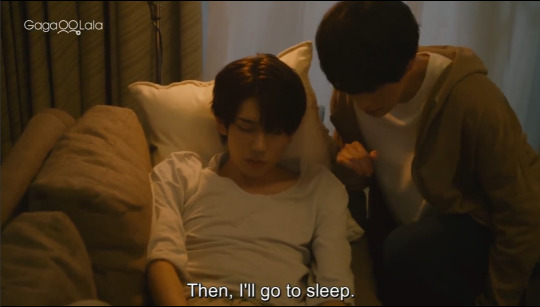
[Y: じゅあ、俺は寝るので**
あの、その、そういうことで、おやすみ]
Original:
Then, I’ll go to sleep.
That…sort of thing. Good night.
Mine:
So then, I'm going to bed, therefore**...
Um... that... with that... night!
"Therefore" is an awkward translation for the word ので (node), which is more often translated as "so". I've chosen to use that word because "node", whilst again not a polite form per se, is less colloquial than the more commonly used "から(kara)", to mean the same thing. It tends to pop up more in writing than in speech. "Therefore" doesn't make a sentence polite/formal in English, but it's definitely less colloquial than using the word "so". The use of "node" is just that tiny bit out of place in this sentence paired with the informal pronoun "ore" for "I" as opposed to the more formal choice of "boku".

Again, Yoh answers Segasaki properly here with a "はい (hai)" as opposed to his usual "un" (which is a sound that expresses agreement), when told that Segasaki will be late again. There actually aren't very many moments where Yoh does speak politely to Segasaki (he's definitely rude when he talks about Segasaki in his head hahaha), so these moments stand out. This whole short exchange, together with the random -desu he added earlier, just make Yoh's sentences a little more stilted/awkward, and more distant. Individually they don't deserve much mention at all, but together, and in the context of his jealousy, show just how unsure Yoh is about where he stands with Segasaki.
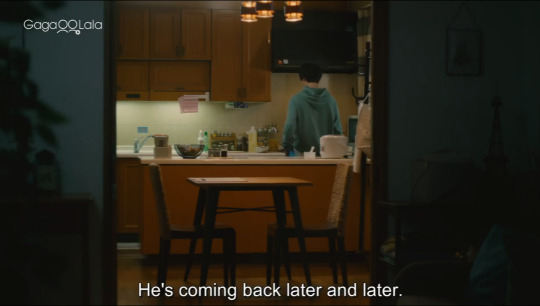
[Y: あの人の帰宅が遅くなり]
Y: That person returned home later and later
"That person" - similar to the above usage of "this person". This sentence is incomplete - the verb form of the last word - 遅くなり (osokunari) indicates that there should be a second part to the sentence (the "completed" form would be osokunatta). But after he says this, there is a pregnant pause, as Yoh puts his phone down and continues cooking alone. The pause continues all the way into the next scene, before the sentence continues, highlighting the loneliness that Yoh feels.

[Y: 当然、触れられることもないままに]
Original: Of course, he did not touch me at all
Mine: (and) of course, (I) remained untouched (by him) as well
The literal translation for this would be "(the situation in which I) was not touched (by him) continued on as well". Yoh uses the passive form of the word "touch", which places the emphasis on Yoh "receiving" the action of being touched as opposed to placing the emphasis on Segasaki "carrying out" the action of touching Yoh. Consider the difference between the sentences "I was hurt by him" and "he hurt me". The former is the passive form, and is super common in Jp, much less common in Eng. If this is confusing - welcome to Jp grammar just know that the emphasis of this line is more on what Yoh does not have, rather than what Segasaki has not done. It accentuates Yoh's feelings of emptiness and loss.
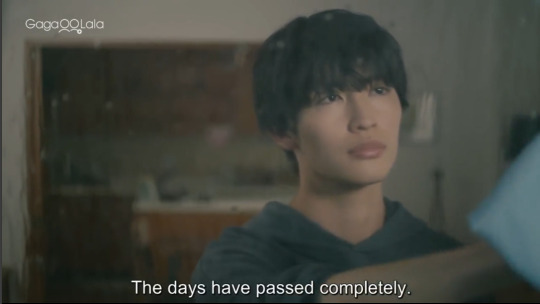
Y: すっかり日々は過ぎて
Y: The days pass by completely ...
Similarly, this sentence is "incomplete", and is instead continued by Segasaki walking in and telling Yoh he'll be late again. (This whole bit just hurts my soul tbh, Yoh is so lonely. )
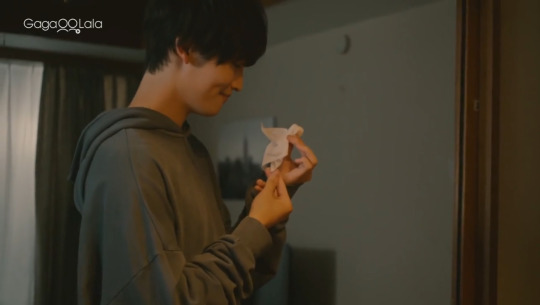
This is a teruteru bouzu aka a charm of sorts for good weather. See the cultural tidbits post for Ep 2 linked up top for more info!

This is said really strongly, and gives the "what the hell are you doing" feel. Yoh's truly upset here.

I try not to care about some of the subs in these side conversations because they don't add much to the main story and these posts are already too long, but this sentence should really be "Dammit, maybe I should (go) troll the chat" (and the previous sentence should be "If this was broadcasted in a certain country it would be instant death" aka N.Korea ^^;) and I just think it was a nice touch to hint at the fandom wars/flaming that goes on between fans hahaha
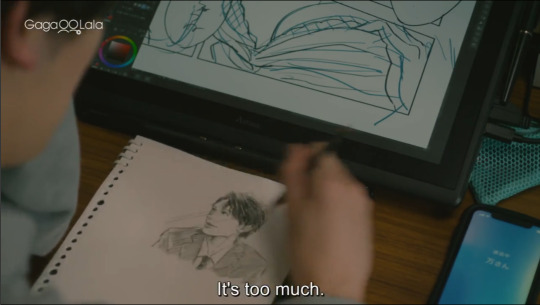
[Y: しんどい]
Y: This is too draining
The word here used is "shindoi", which is a term used when you're feeling mentally/physically exhausted/drained, and carries a sense of frustration (at feeling this way) and sometimes (emotional) pain.
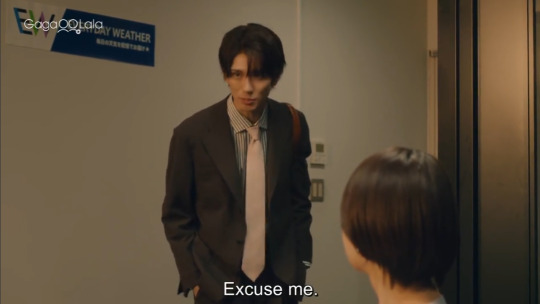
This. Is. Huge.
Segasaki does 2 things here - one, he rejects an after-work meal, which you rarely do because Japan is all about the group and rejecting a group invite, to welcome a new member, can make you seem like you aren't a team player - two, the guy who invites him is his senior, which you can tell because Segasaki sticks to polite speech forms whilst the other guy does not. It's still relatively casual, so you can tell he's got a good working relationship with them (probably why he's not worried about rejecting them) but still. In Segasaki's world, Yoh is the No. 1 priority.
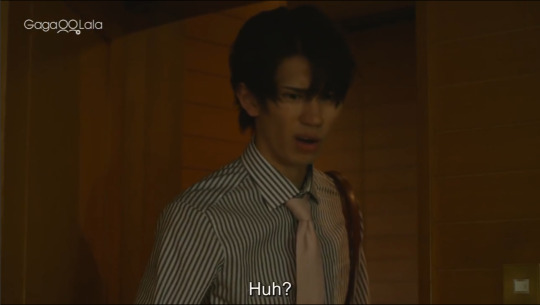
This is more accurately "WTF". There are many sounds in Japanese that aren't exactly words, but carry a lot of meaning - "Haa?!" is one of them, and is a very rude way to express a lot of anger and shock. Please, never say this in real life. You will royally piss off whoever it's directed at and if you are outside a Shibuya bar you will get punched.
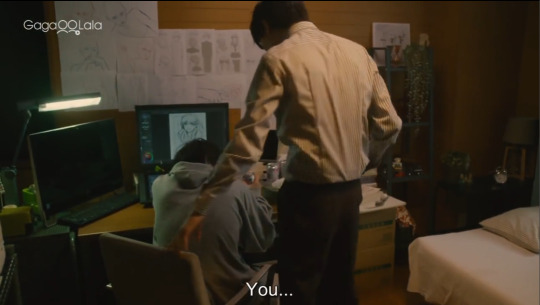
The word used here is てめぇ (temee), which is a really rude way to say "you", and has the same energy as "you bastard". Segasaki usually uses the informal pronoun "omae" for "you" when he talks to Yoh, he's definitely pissed off here.

This is the same word, "shindoi" again.
I'm going to put the rest of the whole argument here with just my translation because it's too long to screencap the whole thing.
[S: 何なんだよ?このエロい惨状は
Y: うるさい。
Y: 俺は売れっ子エロ漫画家になるんだ
S: なんだそりゃ。おい *takes away beer can*
Y: 売れっ子さんが シコリながらネーム描くと いいのができるって言ってた
S: なんも描けてなかったぞ。
S: おい、だめだっつってんの
S: 飲みすぎ 出すもん出して 寝てただけだろう
Y: 黙れ!
Y: 俺はエロくて 抜ける漫画描いて いっぱい稼いで
Y: 早く こんなとこ出ていくんだ
S: はあ? おい、お前 どういうつもりだよ
Y: どうもこうもないよ!
Y: 平気で抱かれてると思うなよ 。
Y: 俺のこと、好きでもないくせに
Y: 便利な奴隷としか思ってないんだろう?そんなにやりたきゃ隣のキャスターとやってろよ
S: お前 さっきから 何を...
Y: 俺はあんな風に笑いかけられたことない]
Breakdown:
S: What's up with this? This lewd disaster of a scene
Y: (You're) annoying!
["うるさい (urusai)" is often translated as "shut up", but it literally means someone is being "noisy", and here is more of a complaint that Segasaki is being bothersome]
Y: I'm going to become a hot-selling erotica manga artist!
[the word used here is 売れっ子 (urekko), which literally means "someone who gets huge sales" and mostly refers to idols, entertainers, TV personalities etc. So Yoh is not just saying he's going to become popular, he's saying he's gonna be like a celebrity manga artist, which is why Segasaki snorts a little at this]
S: What's with that? Hey. *takes away beer can*
Y: The hot sellers say that if you jerk off whilst drawing your storyboard, you'll come up with good stuff
[urekko-san is a pretty cute way of referring to these popular artists]
S: You've not drawn anything, you know? [this is said with a really indulgent air, which contrasts directly with the more authoritative tone of the next line]
S: Hey, I'm telling you no more *grabs beer can*
S: You drank too much. You just shot what you shot and then went to sleep didn't you?
[And this is back to an indulgent tone - also, everyone knows Segasaki is talking about cumming here, he just doesn't actually say it so directly]
Y: Shut up! ["黙れ (damare) - contrast with "urusai" earlier. The former is used much less commonly and really does mean to "be quiet". This is why Segasaki pauses and looks at Yoh. Up until now Segasaki just thinks Yoh's gotten drunk and is whining cutely, but this word means things are serious.]
Y: I'm going to draw manga that is erotic, that you can wank off to, and then earn lots of money [this is a call back to the conversation with Man-san over the phone in Ep 1, which I did not include earlier because I didn't think it was important to the story when Yoh says "the work that was released last month was amazing! There was a big buzz around the topic "I can't wank off (to this)" - Yoh was being sarcastic here, meaning that he got reviews that his work wasn't erotic enough]
Y: and leave this sort of place soon!
S: What? Hey - what (the hell) are you thinking? [Again, "haa?" here shows he does NOT like what Yoh's saying, but he does soften the end of the sentence with a "yo"]
Y: I'm not thinking of anything!
Y: Embracing me so easily - don't think you can (keep on) doing that [again, this is the passive form, so the emphasis is on Yoh being embraced, and here has the nuance of "don't think I'll just (keep on) being fine with being embraced (by you) like it's some sort of norm"]
Y: when you don't even like me [this line has quite a bit of bitterness in it - the emphasis here is strongly on Segasaki and his apparent "non-liking" of Yoh my english is dying.]
Y: You think of me as just a convenient slave, don't you?
Y: If you want to do it that much, go do it with that forecaster next to you!
S: You... from the start... what have (you been saying?)
Y: I have never been smiled at like that before [again, this is in passive voice]
It's obvious from the acting alone that this entire argument is pretty emotionally charged - this is also reflected in the language because Yoh uses the pronoun "ore (I)" a lot. Pronouns are frequently dropped in Japanese - often you can go an entire conversation without ever uttering the words "I/me" or "you", in part because the pronouns are assumed and also because emphasis on an individual can come across as too selfish/narcissistic or direct. Segasaki uses them often enough with Yoh, which fits his personality, but Yoh normally doesn't. So, when he uses "ore" here it stands out - his plans to be successful and leave, his feelings, his interpretation of Segasaki's actions - all of the emphasis is on his own self. The message is very clear - Yoh is hurting a lot more than he is blaming or accusing Segasaki.
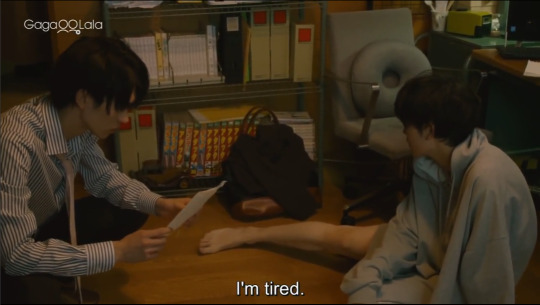
[Y: もう疲れた。あんたといると疲れる。嫌いだ
S: お前 酒入るとめちゃくちゃしゃべるんだな
Y: ねぇ、何で雨の時はだめなの?
S: はあ? だって、お前が言ったんだろう]
Y: (I'm) tired out. When (I'm) with you, (I) get tired. Hate it.
[We've lost the "I" pronouns here, because the emphasis is on the extreme sense of physical and emotional fatigue as opposed to Yoh himself, and on how much he dislikes that feeling. Of note, "hate" here is closer to "detest/really dislike" - the word is "kirai" - which is not as strong as the word "nikui" which we talked about in Ep 1 when Yoh said he hated the part of him that always listened to Segasaki. Also, this is the first time Yoh has addressed Segasaki with the pronoun "you" out loud - he uses "あんた anta", which he also used in his head in Ep 1, after they did it. Again, we'll talk about this in the analysis post in the future, but for now just know that this term is usually used between older couples.]
S: You... once you start drinking you really start talking huh? [literally, you "become able to talk"]
Y: Hey...why is it when it rains, (we) can't do it?
S: What? Because, you said so didn't you? [the last "haa?" from Segasaki! This time expressing his surprise and slight indignation.]
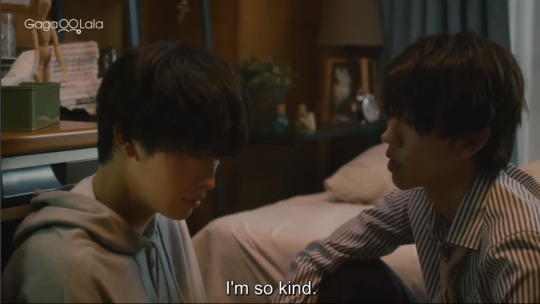
[S: 俺は優しいんだ]
S: I. am. Kind.
Great example of Segasaki's use of the "ore" pronoun here to quite literally emphasise how great he is. "優しい (kind)" in Japanese carries the connotation of being thoughtful, anticipating the other person's needs and wants and then meeting them etc. It's a characteristic that people often say they look for in their potential partners.
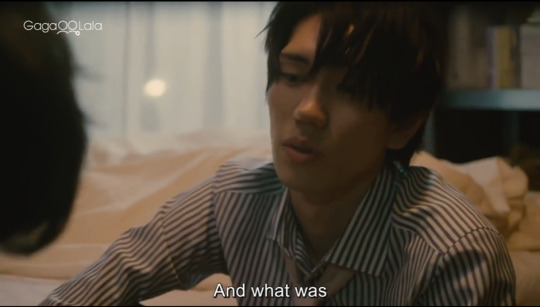
[S: そもそも、なんだ先の言いぐさは
好きじゃないだの 出ていきたいだの
お前 俺のプロポーズを受けといてよくそんなことが言えんな
S: 養ってやる*っつってんだ プロポーズ以外になに]
S: In the first place, what was with those things you said earlier? That you don't like me, that you want to leave...
You... that was rich, saying all that after accepting my proposal.
S: I was saying I'd provide and care* for you. If that's not a proposal than what is?
["養ってやる" is a pretty possessive way to say I'll provide for you - it's the same word used when referring to parent providing for a child, or an owner providing for a small animal. It's not rude per se, but it does imply a power imbalance. Segasaki actually sort of has a point here because... this is not something you say to someone else unless you're in a relationship ^^;]

S: ていうかお前、俺のこと嫌いなんだ
S: どうなの
S: Actually about that... so you hate me huh?
S: Which is it?
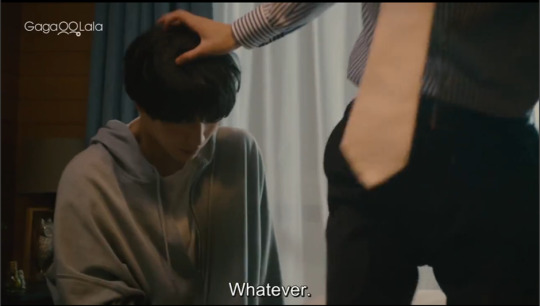
S: ふーん。あ、そ
S: Ohh..? I see.
ふーん (Ohh..?) - Segasaki says this a lot, especially in this episode. This is another one of those sounds that isn't a word but carries a lot of meaning. It has a dismissive sort of tone to it, like you've already assumed something or when you're pretty nonchalant/not impressed about whatever the other person has said and are just playing along with them by giving them some attention (so again, if you use it wrongly, it can piss people off). Segasaki uses it whenever Yoh goes mute or shy, as a way to tease Yoh - though Yoh seems to think Segasaki is dismissing/not interested in his answer.
あ、そ (A, so) - again, Segasaki says this a lot - can be interpreted as "oh really?/I see/is that so?" - Combined with the above, you can see why Yoh often thinks Segasaki isn't interested in his answer, and even when he does recognise it as teasing, he gets too flustered to do anything about it.
This seems to have gotten longer, if you reached the end - congratulations! I hope this makes it a little clearer why it's so obvious to us as the viewer that Segasaki is really quite patient with Yoh, and is waiting for him to come to terms with his feelings, but at the same time so confusing for Yoh, because of the way many of these interactions can be read both ways. In Ep 3, we'll really be able to get into their dynamics because they've got so much more interaction together.
#my personal weatherman#taikan yohou#体感予報#MPW subtitle corrections#mytranslations#finally got it out#doing a breakdown of the argument was very fun#this is like the most indulgent t/n ever#i am indulging myself the same way segasaki indulges yoh#thanks to everyone for reading my indulgent notes#please geek out with me more#these two are so perfect for each other#sorry I wanted to get Ep 3 and the analysis out before Ep 4 but it's not happening
192 notes
·
View notes
Text
MPW Language Analysis Part 2
Segasaki x Yoh: Shifts in Emotion and Acknowledging Roles
Masterlist || Language Analysis Part 1 || The Importance of Amae ||
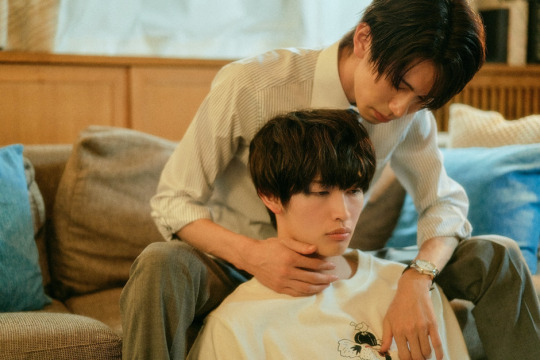
In Japanese, one cannot utter a sentence without communicating at least two things:
(1) the actual content of the message itself, the referential meaning; and
(2) a metamessage about the relationship between the speaker and the listener, an indexical meaning.
A striking feature about Japanese is that it is the latter message that most often assumes greater importance.
From: Creating an Ideal Self: Theories of Selfhood and Pedagogy at a Japanese Ethics Retreat by Dorinne K. Kondo
Every sentence that Segasaki and Yoh say to each other carries 2 meanings - the one we read in the subtitles, and too often, the one that never travels across the screen. The "miscommunication" that many perceive to be happening isn't always just about "using actions vs words" (though there is much to be said about that too) - the words are being used, but it's hard to hear them when said words are in Japanese and packed with information English is simply not designed to carry.
So, with 6 episodes of corrections made and nuances explained, it's finally time to get back to actually talking about how all of this adds to our understanding of the characters and of their relationship. In these 6 episodes, both Segasaki and Yoh have run the entire gamut of speech levels - but where Segasaki shifts consistently and with purpose, Yoh tends to shift as a reflexive, or reactionary response.
Or, what Segasaki choosing to shift up a speech level means to Yoh, and what Yoh's inconsistent shifts tells Segasaki (and us), about his emotional state. I'm kinda sorta not really sorry about this but ah, it's maybe possibly probably even longer than usual??
Quick Recap of Part 1:
We established two key aspects of their relationship:
1) They both acknowledge the power differential between them
- Segasaki, by using "rougher" speech patterns, and Yoh, by tending to stick to the more polite end of the scale.
2) They both consider themselves to be from the same "in-group"
- Both of them default to informal speech patterns when speaking to each other (even Yoh, despite being the junior/lower on the social hierarchy)
And now on to Part 2!
Changes in Emotion: Yoh
Yoh tends to experience his emotions rather intensely, and through his monologues we understand that he isn't always able to process these emotions immediately. As such, the shifts in his speech levels tend to happen subconsciously - there isn't an immediately obvious, predictable pattern to those shifts, because they are simply a reflection of how he's feeling in the moment.

Y: あ、いや。なんでもない…です*
Y: Ah, iya, nandemonai…desu*
Y: Ah, no, it's….nothing*
The shift to polite form, and the awkward manner in which he does it, reflects Yoh's growing insecurity (See EP 2 for other examples).
From the moment Segasaki starts returning home late, Yoh becomes more and more unsure of where he stands with Segasaki, and this growing emotional distance is conveyed through his speech patterns becoming (awkardly) more polite than in Ep 1. He speaks hesitantly and indirectly, until he gets drunk (and even then, his insecurity still shows in how he barely switches down to rough speech during their not-argument).
In Ep 3, we again see Yoh shifting up to polite forms often, except this time, the shifts show his gratitude as well as sincerity.

Because of how ridiculously expensive the pork bun is, Yoh expresses his thanks by saying the full ありがとうございます (arigatou gozaimasu) here as opposed to just "arigatou" or other more casual forms. In return, Segasaki acknowledges the formality Yoh pays him with a nod (and a mouthful of pork bun).
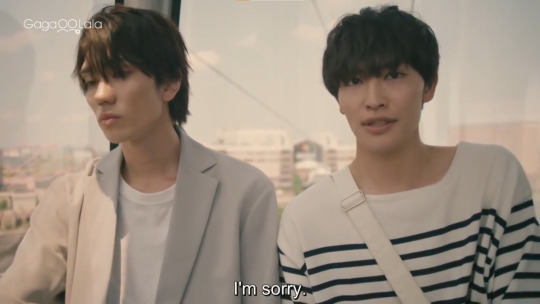
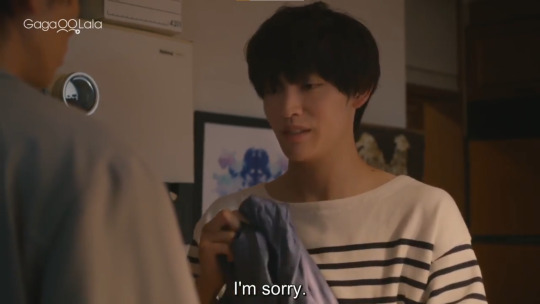
Y: すいません
Y: suimasen
Y: I'm sorry
This is the more formal version of "I'm sorry" (textbook pronunciation is sumimasen, but textbooks are for nerds Yoh's version is very common as well and still polite)
In both these scenes, Yoh switches to suimasen as opposed to his usual, and more casual, ごめん / ごめんなさい (gomen/gomen nasai), that he also uses in this episode. As previously mentioned, "sorry" in Japanese can also be used to mean "thank you". Here Yoh is doing both - apologizing for Segasaki having to "go the extra mile" to take care of him (ie, he feels he has imposed upon Segasaki - a fear he has mentioned a few times), and at the same time also expressing his gratitude for being taken care of. However, it's the shift up to the polite version that conveys his sincerity, and carries the extra message that - despite his regret at imposing on Segasaki - Yoh still values these moments and feels touched by them.
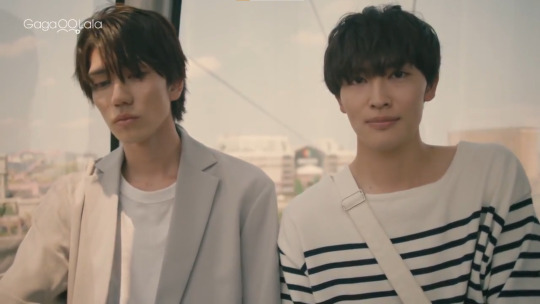
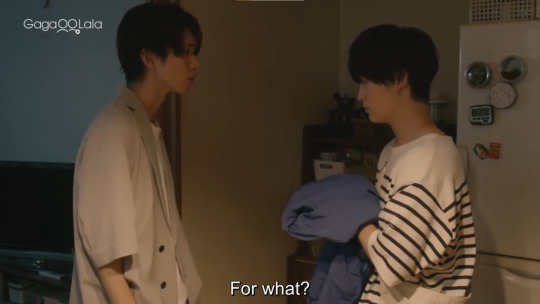
Both times, you see Segasaki taking note of this, albeit slightly confused, and probably a little shy too (Segasaki is after all, very good at picking up on social cues - especially Yoh's - and spends the whole of Ep 3 doing just that).

Y: 漫画が とてもだめです
Y: manga ga totemo dame desu
Y: (My) manga is... really bad.
Yoh spends most of Ep 5 safely ensconced in the informal speech level, switching up only twice - the above scene, and later when he attributes his recovery to Segasaki's care as a way of thanks. The switch in the bathroom is sudden, and adds a sense of certainty to his statement that reflects the intensity of the despair he feels (even though he comes across as more kicked puppy than anything). The formality is also a way to "distance" himself from the reality of it, because it does hurt to acknowledge this.
All of these instances show us that Yoh's shifts up in speech levels tend to reflect when he's feeling vulnerable in some way - when he's insecure, dejected or hurt, or when he feels that he has imposed upon Segasaki.
So then, does Yoh also shift down?

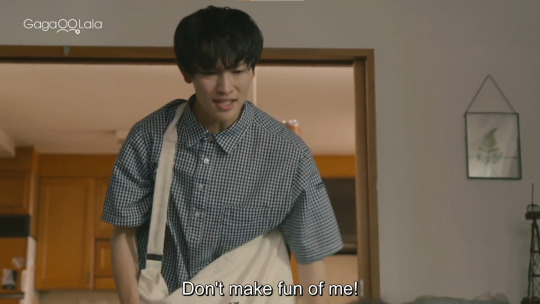
Well, yes and no.
Left (Ep 4):
Y: ふざけんな [very rude]
Y: Fuzakenna
Y: The hell are you doing!
Right (Ep 5):
Y: バカにすんなよ![slurred vowels]
Y: baka ni sun na yo
Y: Don't look down on me!
Even if we include (just barely) the non-argument of Ep 2, there honestly aren't many scenarios in which Yoh shifts down to a "rougher" speech pattern - and he never drops as low as Segasaki does. This has to do with both his acknowledgement of the power differential that exists between Segasaki and him, as well as his less assertive nature. In fact, even when speaking to Man-san, with whom he shares his thoughts more freely, Yoh remains casual, but not rough. (Man-san is waaaay rougher than Yoh, tbh). Hence, when Yoh does shift down, it tends to be explosive and short lived, just like his frustration or anger.
So why "yes and no"? Because being lower in the social hierarchy also introduces another, more interesting way to express yourself - by choosing not to switch up.
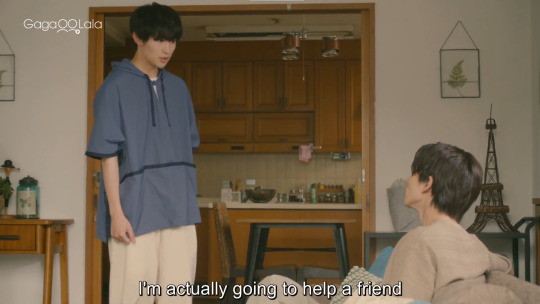

We see this in Ep 5, when Yoh tries to lie about going to Man-san's place. He sticks to his baseline informal speech when he announces this, whereas he previously used polite speech in Ep 4. Is it possible that Yoh was simply overcompensating and trying too hard to sound casual to hide his lie in Ep 5? Yes. But before coming to that conclusion, there is another important detail to note - that instances like this, where Yoh doesn't switch up, have gradually been increasing as the show progresses.
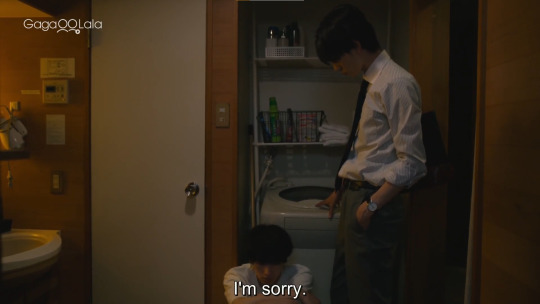

In Ep 5 and 6, Yoh uses the slightly less formal gomen nasai to apologize (contrast this with Ep 2's suimasen mentioned earlier). Given that Yoh himself mentions in Ep 5 that he thought Segasaki would be angry, and in Ep 6 clearly underscores his apology with a proper bow (yes, there are standards to how you should bow in Japan) - you would think that these 2 situations would be the perfect time to switch back up again. So why? Once again, the key to unlocking the metamessage is the wider context; i.e., we need to consider what Segasaki has been doing. please indulge my desire to sound cool and mysterious despite already announcing it in the title
Establishing Roles: Segasaki
In direct contrast to Yoh, Segasaki is very consistent with his speech shifts, and a clear pattern emerges. First off - when Segasaki is angry with Yoh, he drops straight down.
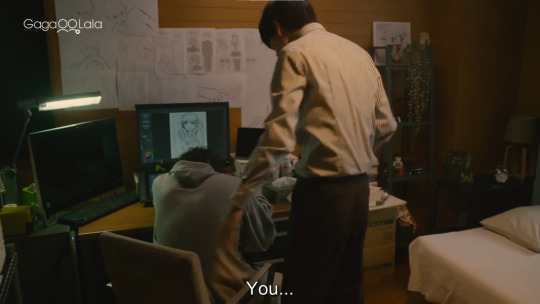
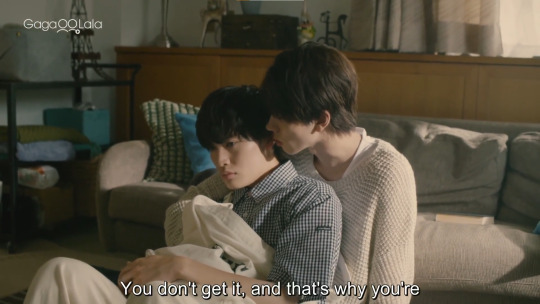
Left (Ep 2):
S: てめぇ [very, very rude]
S: temee
S: You
Right (Ep 5):
S: 分かってねぇだろ 分かってねぇから 泊りで仕事とか言い出すんだろうが [slurred Rs, word contraction, slurred vowels]
S: wakattenee daro wakattenee kara tomari de shigoto toka ii dasun darou ga
S: You don't do you? You don't understand and that's why you can just say things like you'll stay out to work overnight.
Like, waaaaaaaay down. The argument in Ep 5 is the most obvious example of this, but using "temee" to address someone like he does in Ep 2 is very very rude and, together with the "haaah?!" Segasaki says before this line, also does a lot to convey that he is Not Happy.
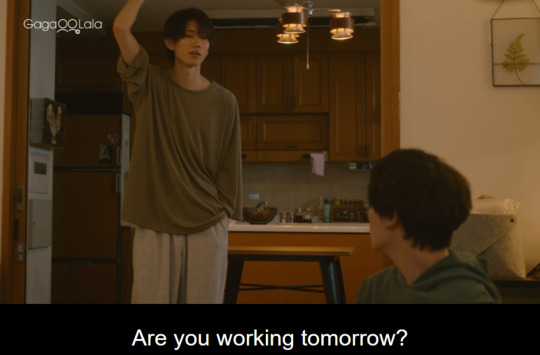
S: 明日は仕事すんのか [word contraction]
S: ashita wa shigoto sun no ka
S: すんのかしないのか、どっちだよ [word contraction, informal, assertive end particle]
S: sun no ka shinai no ka, docchi da yo
S: Are you working tomorrow?
S: Working or not, which is it?
The lines in this interaction from Ep 3 aren't really rude per se - certainly not compared to temee - but they are rougher than his usual and very direct. We've seen Segasaki do this multiple times throughout the episodes - dropping his levels when he's being assertive, and it is in response to that assertiveness, that Yoh gives the following reply:

Y: いや、ないです [plain forms, but with the addition of desu form]
Y: Iya, nai desu
Y: No, I don't [have anything planned]
Mixing plain forms with -desu at the end makes Yoh's reply a little more formal, and is another way in which Yoh acknowledges the power differential between them. Being higher in the social hierarchy means Segasaki enjoys a greater sense of linguistic freedom, and shifts down in speech level are therefore unsurprising, and indeed, expected.
So, if there is no real need for Segasaki to shift up, then, what does it mean when he chooses to do so?
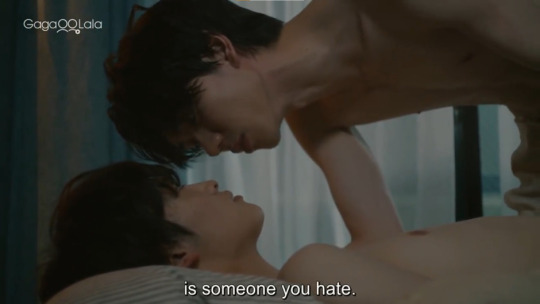

Left:
S: まあ 残念ながら 相手は大嫌いな俺ですけど
S: Maa... zennen nagara aite wa daikirai na ore desukedo
S: Well, unfortunately, your partner is me - who you hate so much
Right:
S: 好きにさせてもらうけど...な ?
S: suki ni sasete morau kedo... na?
S: I'll gratefully do as I please...yea?
After an entire episode of using Yoh's own words to tease him as a way to try and get Yoh to face his own feelings, Segasaki lands his sharpest and strongest push of the day in these 2 scenes not by reinforcing the hierarchy between them, but by subverting it. Shifting up to a more formal speech level when he doesn't have to, particularly in the second scene where he uses deferential word forms, creates the illusion of elevating Yoh in the hierarchy, which is then immediately undermined by the irreverent tone in which Segasaki says them.
In other words, Segasaki only shifts up as a power play.
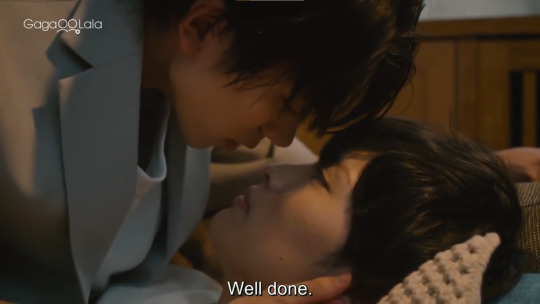

S: よくできました
S: yoku dekimashita
We first see Segasaki use this formal way of saying "well done" at the end of Ep 3 and again in Ep 4, and it brings to mind the literal stamp of approval that teachers often give to students in school. Here, there is no teasing or subversion of the hierarchy going on. Segasaki is establishing his role in Yoh's life - to provide and care for him - through the use of polite speech, and reinforcing the power differential between them in the most straightforward way possible.
This use of polite speech allows the speaker to indirectly index their social identity - often as one who is in charge or responsible. Within the Japanese household, it also happens when a role/obligation (often parental) is being carried out - eg , a parent might switch to polite speech to indicate their role as provider when asking the rest of the family "What would you like to eat?". Similarly, we again see Segasaki underscore his role in the following:

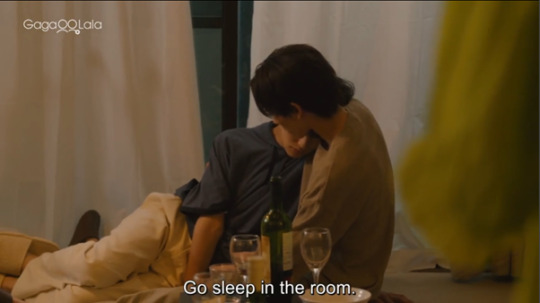
Left (Ep 5)
S: ごちそうさまでした
S: Gochisousama deshita
S: Thank you for the food
Right (Ep 4)
S: 寝るなら部屋いきな*
S: neru nara heya ikina
S: If you're going to sleep, then go to the room alright?
In Ep 5, Segasaki leads the saying of this standard phrase, customarily said at the end of a meal to express gratitude to everything that made the meal possible. It is the use of the full, more formal version (as opposed to just gochisousama) that indexes his role as Yoh's caregiver when he leads in saying this, and indeed he spends most of Ep 5 enjoying that role. In Ep 4, although he does not quite use the -masu form here, the imperative form "ikina" brings to mind a parent trying to coax their child to bed, the same way Segasaki is doing to a very drunk and sleepy Yoh.
This is the key we were looking for - with every episode, Segasaki consistently reinforces his role in Yoh's life, the same way he consistently responds to and encourages Yoh's amae. And with every episode, Yoh becomes a little more confident of his place with Segasaki, a little more willing to believe that maybe Segasaki might really return his feelings. It's easy to look at Yoh in Ep 2, see him push Segasaki away, and think that the same Yoh appears in Ep 5, but that couldn't be further from the truth. Because in Ep 2, a drunk Yoh barely drops to rough speech, whereas in Ep 5, a sober Yoh feels safe enough to even "curse" a little (well, as far as cursing goes in Japan at least, which admittedly is not far). In both word and action, they have both grown, and have both contributed to the strengthening of their relationship.
So! In conclusion (omg we made it to the end) we have established that:
Segasaki has a clear, predictable pattern in his shifts - he switches up to formal when establishing or reinforcing his role in Yoh's life, but when he's serious, or angry with Yoh, he drops all the way down.
Yoh is less consistent, because his shifts tend to be more subconscious and reflective of his emotional state. He's more inclined to switch up when he's in a vulnerable state, eg, feeling insecure or dejected, or when he wants to express his sincerity in apologizing or showing gratitude. When he's nervous, or in response to Segasaki either being direct with him or upset with him, he'll sort of switch up too (ie, he'll mix polite forms with informal forms, or he'll try to say things in an indirect way).
Through the use of speech level shifts, both Segasaki and Yoh indirectly reinforce and acknowledge their individual roles in each other's life, and by observing the changes in these shifts over time, we the audience are able to track the progression of their relationship as well.
In the next part, we'll look at the differences in the way they speak to others versus between themselves - looking specifically at examples from Ep 4, 6 and 7.
As always, thank you for reading, and feel free to ask any questions! (*ˊᗜˋ*)/
#my personal weatherman#taikan yohou#体感予報#segasaki x yoh#sociolinguistics#japanese language#MPW language analysis#mytranslations#MPW subtitle corrections#this post assumes you have read part 1 of the language analysis#who says MPW is over#it's not over i don't believe it#also this was so long#was it too confusing? should I be less nerdy?#ep 7's corrections will come out next#tumblr's formatting sucks but reddit sucks more lol#i still enjoy writing these posts though#i hope it gives everyone an excuse to rewatch MPW again
131 notes
·
View notes
Text
MPW Ep 3 Subtitle Corrections
EP 1 || EP 2
Cultural/Language Tidbits: EP 2
Same translation disclaimer applies. Thanks again for indulging my crazy long t/n, please keep geeking out with me in the notes!
We've got a change of director this episode - to Funabiki Shinju (twitter linked here) who was the scriptwriter for Jack Frost. This date is also a drama-only episode and does not appear in the manga. So, we have quite a few ad-libs here! I'll point out these out, as well as any interesting comments by the director and the producer from the Ep 3 twitter space as we go on. (Due to tumblr's image space limitations, some of these scenes will have no pics, just a description)
Ep 3, let's go! (If you read nothing in this post, please just read Yoh's monologue)

Since this is the theme of this episode, and Yoh's favourite word, let's talk a little more about it. I've mentioned it previously, but both "嫌い (kirai)" and "大嫌い (dai kirai)" are often translated as "hate/really hate", when they really function more as the opposite of "(suki)", ie "to like". That said, the amount of emotional weight this word carries depends on the context. It can accurately convey the pain/anger of hating someone, but it can also be used very mildly. For eg, it's often used by kids in the "I hate homework/vegetables/the rain/etc" form, or by teens/young adults in the "I don't want everyone to hate me" form, as opposed to other synonyms. When introducing yourself/getting to know someone, it's not uncommon to be asked "what are your suki/kirai?"
In other words, overuse of this word can actually come off as slightly childish, because kids/young people are usually the ones using this word to reject small things/express themselves. Yoh's constant insistence that he hates Segasaki pretty much sounds like this - which is why Man-san expresses doubt about it, and why when Segasaki repeats this line back to Yoh, Yoh understands that Segasaki is teasing him.
(The word "love" is considered too heavy and precious of a concept to be thrown around easily, so "suki" is the default go to even in committed relationships.)

Y: 相変わらずすごいよ、この人の外面モード。
Y: As always, this person's "public mode" is amazing.
"外面 (soto zura)" literally refers to the "outside face", and when used to describe a person means someone who puts up a certain personality/attitude depending on who they're speaking to/the situation.
The reason Yoh's saying this is because Segasaki is speaking to him in a much nicer way than he usually does at home 🤣He's using plain forms yes, but he's also praising him and smiling at him and actually saying a whole, proper sentence as opposed to the one-word sickness he has at home🤣 This is most obvious right before Segasaki leaves, when he warns Yoh to be careful when drawing other people - he says "気をつけてね~ (ki o tsukete ne~)", ending with a ne~ which is sweet and cute and which he almost never does with Yoh at home 🤣🤣
Twitter Space Note (TSN): They decided that since they finally got to shoot an "outdoor scene" for Yoh, they'd try to make him look a little more fashionable with a shirt instead of a hoodie 🤣

Y: いってらっしゃい
Y: Itterasshai - this is a standard greeting that you say when someone is leaving the house (or the office, if they're going out on a business errand). Basically, the one leaving says "ittekimasu" and the one staying behind says "itterasshai". They mean "(I'll) go and come back/Go safely and return well"
When returning, you say "tadaima" and the one welcoming you back says "okaerinasai" meaning: "(I have) just now (returned)/ (you have) returned safely".
Unlike Yoh, Segasaki does none of these standard greetings (which Yoh complained about in Ep 1 whilst chopping onions).
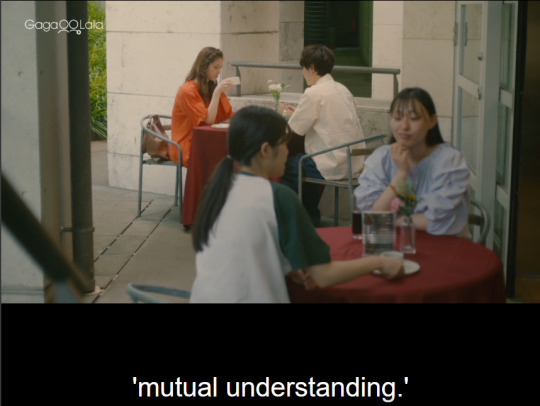
Y: だからね、気持ちが通じ合った*っていう描写が必要だと思うんだよおれは
Y: だからこそ、体が盛り上がる**、的な?
M: はーん。中高生処女みたいなこといってろ
Original:
Y: That's why I think it's necessary to depict the feeling of "mutual understanding"
Y: That's how the physical aspect also gets exciting... or something like that?
M: Hmm.. talking about it like a high school virgin, huh?
Mine:
Y: So that's why, I think it's important - showing that (the characters') have this unspoken understanding* of each other's feelings.
Y: It's precisely because of that, that you get physically excited** - something like that?
M: Mm.... you're saying things a high-school virgin would say
**体が盛り上がる - literally, "the body gets excited/heated up/lively etc" - given that they are talking about erotica, he probably means physically aroused here, but this term also works to explain the feeling of excitement or emotion just swelling in your chest for eg
*通じ合った - is not just "mutual understanding" - it specifically refers to a situation in which both parties understand each other without having to say a word - like when you look at someone and just get them, or like in sports, you just look at your team mate and you know.
This is an important distinction because in this line, Yoh again emphasizes "I" - at the end of the sentence he ends off with the pronoun "俺 (ore)" marked by the subject particle "は (wa)" - which means that in this sentence Yoh is emphasizing that this is his opinion - that he himself thinks it's important to show that 2 people simply get each other, because that's exactly what translates to that sensation you feel in your body. This is what Yoh wants - he wants to understand Segasaki, and he wants Segasaki to understand him, without them having to actually say anything. Which at the moment, only Segasaki is achieving, ironically.
[ Man-san's dialogue, where she says "a sex scene follows]
TSN: Man-san actually only says “se-“ here, and then mutes herself (because they’re in public). In the script, it was supposed to be the full “sex” word, but they weren't sure whether it would be ok (it's not clear whether they mean ok for the actress to say this or ok for the show in general) so in the end it became "se-". Yes it's an odd place to be concerned about given the whole Ep2 but #Japan
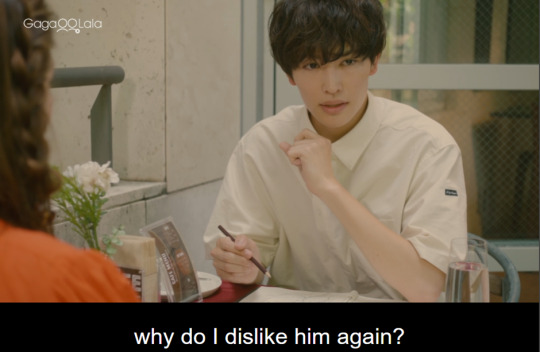
Again, the word here used is “kirai” but translated as “dislike” instead of hate 😉
TSN: Between this scene and the start of the next scene, they praised how Acchan uses his eyes to convey Yoh's dejection and how he expresses Yoh's emotions very sensitively through his gaze (and I agree!)
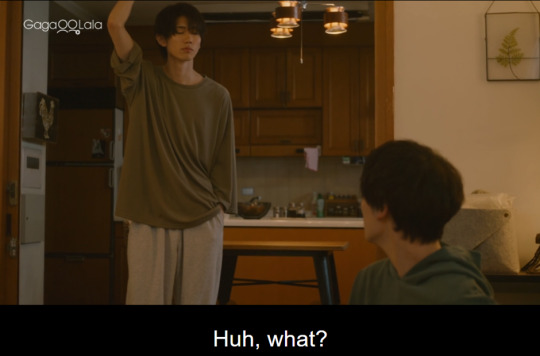
TSN: The director mentioned that she had thought it would look good if Segasaki to put his hand up like this on the ceiling partition, but the moment Kouhei walked in, he just did it naturally without her having to say anything, and so she was really amazed.
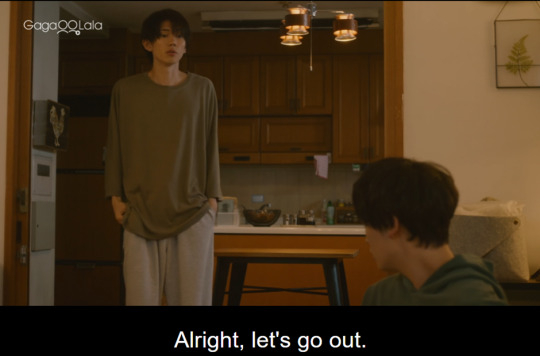
S: じゃ、出かけるぞ (Jya, dekakeru zo)
S: Then, we’re going out.
“Let’s go out” would be more of "じゃ、でかけましょう (Jya, dekakemashou)" – by using the ending form “(-ma)shou”, the listener is included in the action of going out as an equal to the speaker, the same way “let’s” is used in English. It is by far the most common way Japanese people make a statement without trying to sound too overbearing. But here, Segasaki once again demonstrates his habit of simply stating what they’re going to do, and speaking for Yoh. The sentence-final particle “zo” at the end of his sentence is an assertive one that doesn’t leave much room for argument.
TSN: Again they talked about how they emphasised to Acchan to do the housework improperly, since Yoh isn't supposed to be good at it. Also, when Yoh thinks, "what's with this, all of a sudden?", the director asked that he move his hands "more" as he folded the clothes, like he was still happy to be asked out.

Y: デート自体ないんだよ
Y: I’ve never even been on a date.
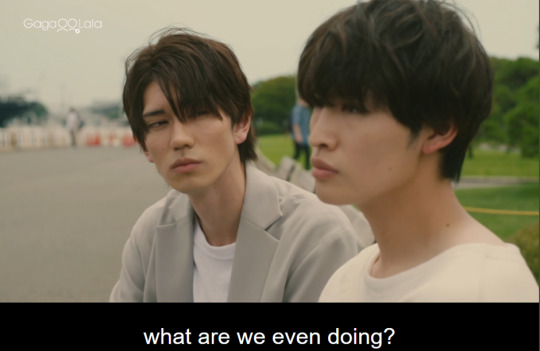
Y: 俺、いま一体何してんだろう
Y: What am I even doing right now?
Yoh’s not wondering what they’re doing, he’s questioning his own actions, like "why am I even here, doing this, what am I supposed to do" etc, because you know, he's never even been on a date before and he has no clue whether this actually is one.
[The scene with the 2 of them on the bench, and Segasaki asks Yoh what he'd like to eat]
TSN: The script only went up to Yoh answering that he wanted to eat “Chinese food”, and this whole bit afterward just happened naturally when they let the camera run.

Yoh says “たっか(taka)!” which is short for “高い(takai)” aka “expensive!” but his voice is so cute here I’m dying. (It really is bloody expensive, these things are usually anywhere between 180 yen – 300 yen pre-pandemic. Even with the big one they have here, I don’t think anyone would sell this above 500 yen)
TSN: They said they searched for a 1200 yen steamed pork bun but couldn’t find one, and in actuality the store sells them at a really reasonable price, so to please go give it a try 🤣🤣
[The scene of them walking and sharing the chicken cutlet]
TSN: This scene, as well as them walking along they alley way looking at the shops, was mostly ad-libbed (which is probably why we see Acchan smiling so much here hahaha I’m guessing the question about which he liked better was probably an adlib, which surprised Acchan). For the alleyway, they were told that their conversation was not going to be used, so they were quite relaxed (and that explains the audio fade out lol)
[The scene of them drinking Boba/Bubble Tea]
About Gyaru - when Boba/Bubble Tea first came to Japan, it became pretty popular amongst Gyaru, and quickly became associated with Gyaru culture - hence why they both felt it was something only Gyaru drank. It's similar to the idea that only ladies eat sweets/desserts that was briefly mentioned in OFC (which makes Nozue feel awkward about 2 men eating cake in a dessert cafe) - here they mean they both felt too embarrassed to try Boba out before due to the idea that it's a "Gyaru" drink (and I love how Yoh looks at Segasaki then, like he only just realises that even Segasaki might get embarrassed/feel awkward sometimes).

S: 乗るぞ (noru zo)
Again, this is “we’re riding it” instead of “let’s”.

Y: 思ったよりすごく透明で
Y: (The cabin) is more transparent than I thought
The floor of the cabin is actually clear, so you can see right down through to the bottom, which is why Yoh is a little freaked out here. Not because he thought glass wasn’t transparent.
TSN: Acchan is also afraid of heights, so the stiffness you see here is real, he really didn’t like it, but they went 4 rounds in total to finish this scene. (Kouhei apparently was fine and enjoyed looking right through the glass, though I can’t remember which interview this was mentioned in, sorry!)

S: ほら
S: See?
ほら (hora) is commonly used to draw the listener’s attention to something, so here Segasaki really just means “look (I was right)”
TSN: They apparently redid the scene where Segasaki dismisses the store attendant many times so they could make sure it was done in a way that looked natural and wouldn’t be off-putting.
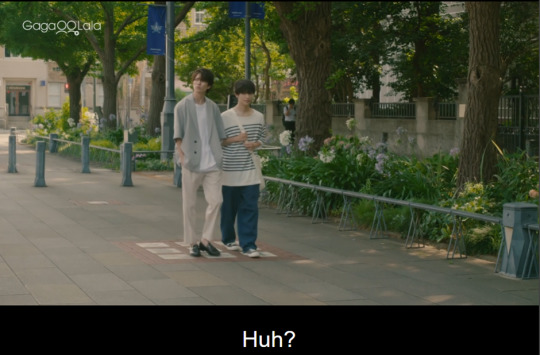
We’re back to one of Segasaki’s humming sounds – the “hmm…?” here again conveys the “oh, really/is that so?” sort of lazy drawl that can easily be mistaken as Segasaki being bored – which is why Yoh immediately suggests they go do their own thing.
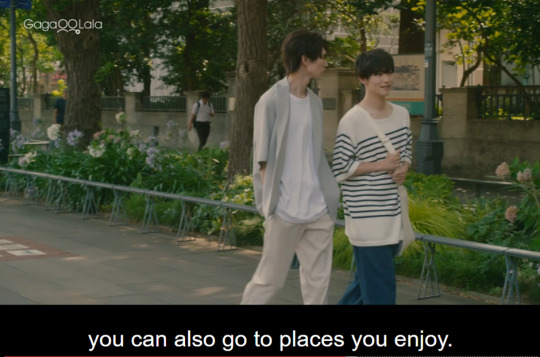
Y: そっちも、好きなところいっていいから
Y: You too, it’s okay (if you go) to the places you like so…
Yoh uses “そっち” here to refer to Segasaki - which literally means “your/that side” and is another way in which Yoh avoids addressing Segasaki directly (remember, in Japan we don’t like being direct, and “you” is sometimes too direct).
Fun fact: Depending on which part of Japan you’re in, this can either be seen as a totally normal way of speaking, or it might annoy you a little to be referred to as if you were an object/place, or you might feel like the speaker was treating you a little like an “outsider”. The divide in opinion seems to be somewhere between the northeast regions, and the western regions. Tokyo and the rest of the Kantou region (where the show is based, judging by the lack of an obvious accent) are sort of 50-50.
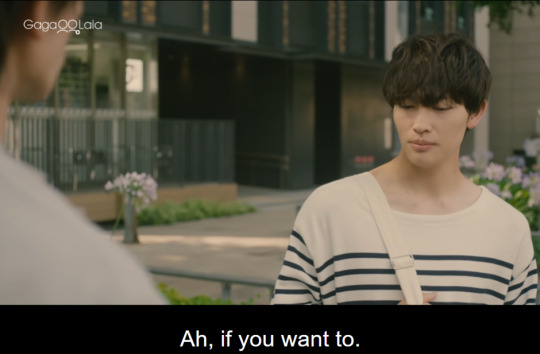
Y: もしあれ*だったら、あ、あの、こっちはこっちで、好きにやってるし
Original:
Y: Ah, if you want to. Well… we’re both doing our own things…
Mine:
Y: If (you feel) that way*, then, ah, umm, I can… do as I like, by myself too...
*that way - this refers to that sort of awkward, uncomfortable feeling you get that is hard to describe when you’ve been put on the spot. So, this makes it clear that Yoh is offering Segasaki an “out” from this uncomfortable, weird position he thinks Segasaki is in.
Similar to his earlier sentence, Yoh refers to himself as “こっち (this side)”, and the phrase he uses pretty much means “I can entertain myself”. This is an example of kizukai – or at least, what Yoh thinks is kizukai - which is a concept where you do your best to think of the other person’s needs and wants, so you can anticipate what help they might need and so you don’t inadvertently inconvenience them. Ok, now get ready for some mental gymnastics:
From Yoh's POV, Segasaki wants to buy clothes, and has brought Yoh along to carry the bags. Therefore, Segasaki’s offer to buy him a shirt, and asking him if he is having fun, is Segasaki’s kizukai – Segasaki is going out of his way to make sure Yoh is taken care of. But! Yoh doesn’t want Segasaki to feel inconvenienced (similar to how in EP 2, Yoh said he doesn’t want Segasaki to dislike him), so he instead almost reflexively rejects Segasaki’s offer, then encourages Segasaki to go enjoy himself, and in response to Segasaki’s “Ha!?”, doubles down and says he’s totally ok by himself - This is Yoh’s kizukai.
Tired yet? This is a normal consideration in daily interactions! You can see why the phrase “yokei na kizukai (excessive/unwanted kizukai)” also exists in Japanese lolol 🤣

S: ああ。せっかくの休日に、大嫌いな俺*と一緒にいてのはたのしくない?
Original:
S: Ah. So spending a day with someone you hate on your precious day off isn’t enjoyable?
Mine:
S: Ah. On your precious day off, being together with me – who you hate* – isn’t fun?
*“大嫌いな俺 (dai kirai na ore)” is literally “the ‘me’ that you hate”, or “me who is hated by you” - emphasis on "me", the person standing right in front of you.
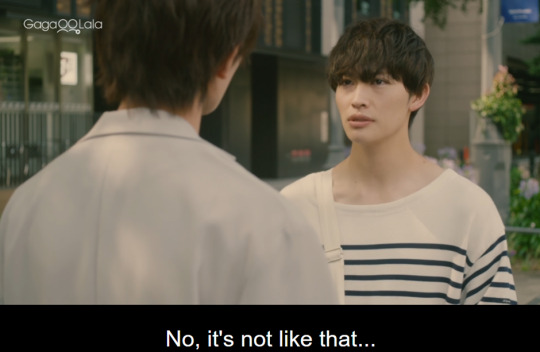
Y: いや、それは…違。。。あ、その。。。
Y: No, that’s…not-…- ah.. um…

“A, so” again.

S: 五時にここ集合*な (goji ni koko shuugou *na)
S: We’ll meet here at 5, *yea?
*Ending with “na” is softer than “zo” – this statement is still pretty much an order, as with his other statements that ended with “zo”, but it’s gentler, and softens the fact that he’s walking away from Yoh here.
TSN: Pretty much everyone was just going on and on about “oh, poor thing!” in response to Segasaki getting rejected and chased away, and how even though he’s sad here he’s still sweet and gentle with Yoh. Yes, that’s right, everyone loves Segasaki.
[The scene of Yoh spilling water on his shirt]
TSN: This was apparently pretty difficult to shoot in a way the camera could see the water spilling, but the wardrobe team came to the rescue with hairdryers so they could keep reshooting 🤣🤣

S: じゃ、帰んぞ (Jya, kaen zo)
S: Then, we’re going back
“zo” is back! Sorry for being so pedantic about tiny things like this, but I do think it gives us insight into Segasaki's character and how he may be feeling.
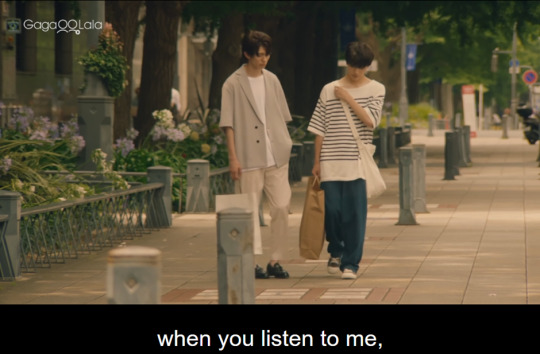
This line is the most important correction in this post.
Y: 本当はさ、ずっと、ささいな表情とか、しぐさとか、
俺が言うこと聞くとちょっと嬉しそうにするのとか、
晴れの予報を告げる優しい声とか、
全部バカみたいに俺ばっかり。
毎日俺ばっかり心臓大暴れさせてるみたいで
嫌だった
Y: むかつくとこ拾い集めて 大嫌いだって思ってないと
その気持ちの不釣り合いに 息ができなくなってしまいそうで
嫌だった
Y: 嫌いじゃない 嫌いじゃないよ
Original:
Y: Actually, all these times, your expressions, gestures,
the way you look kind of happy when you listen to me,
and your gentle voice forecasting good weather.
All of them, make my heart beat as if it’s coming out.
I don’t like it.
Y: I gathered everything that annoyed me, thinking that if I didn’t, the imbalance of my feelings would suffocate me.
I don’t like it.
Y: I don’t hate you. I really don’t.
Mine:
Y: In truth, all this while, the little expressions you make, the gestures you do,
the way you seem just that little bit happier when I listen to you,
and the gentle voice with which you announce the sunny weather…
All of that - like an idiot, it's just me who…
It feels like it's just me whose heart has been made to pound and race wildly and -
I didn't like that.
Y: If I didn't gather up all the things that frustrated me and told myself "I hate this" then,
the disparity (between us) in those feelings would suffocate me, making me feel like I could hardly breathe and -
I didn't like that.
Y: I don't hate you. I really don't hate you.

TSN: This was ad-libbed too. It just happened that the metal post was coming up in between them as they walked, and Acchan saw it and planned to go around it, because he felt that emotionally there was a gap forming between Yoh and Segasaki at this point. But right as he was about to do that, Kouhei grabbed him by the sleeve and pulled him over, which Acchan was really surprised by, because they both had the same thought to ad-lib something about that post, and they both did it as their characters would do it, but it was the exact opposite action. The director said that when the 2 were walking back towards the start point they were both smiling a little, and then asked the director “how was that?” to which she replied “It’s really great!”, and then Acchan looked a little frustrated (in a sorta arrgh I got it wrong sort of way) whereas Kouhei was all “I was definitely right” (Acchan mentioned he was abit worried about the ad-lib, so I’m guessing they both were discussing as they walked back and finally decided to settle it by asking the director hahaha)
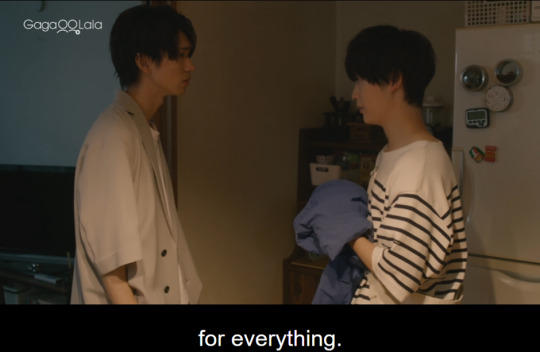
Y: すいません
S: なにが
Y: その。。。いろいろ
S: だからなにが
Original:
Y: I’m sorry
S: For what?
Y: Well, for everything
S: What do you mean?
Mine:
Y: I’m sorry
S: About what?
Y: That… for many things
S: And (I said,), about what?
Yoh uses the formal "すいません (suimasen)" here, as opposed to his usual and more casual "gomen" or "gomen nasai", because this line is important to him, and he means it. "Sorry" in Japanese does not always carry the meaning of regret/remorse - it can be used to express gratitude as well. You''ll often here people say "Sorry that you had to (go through the trouble)" after they've accepted a gift, or "Sorry, I've caused you much trouble" as a way of thanking someone for their care. So, Yoh says "sorry" here after accepting Segasaki's gift, which could be seen as a thank you, but he also means he's sorry that he's like this, that he can't be honest/straightforward about his feelings (a theme that is brought up in Ep 4), that Segasaki has to care for him like this etc. "For many things" is a common way to encompass all of these mixed feelings, and yet not say them out directly.
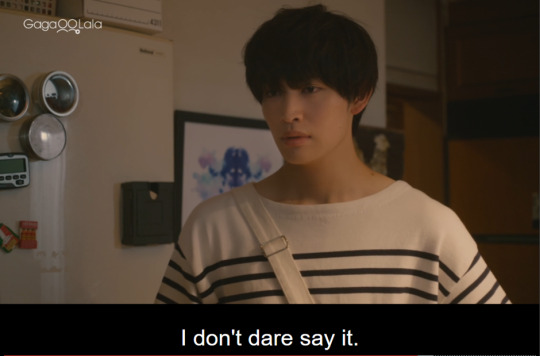
Y: どうせ口じゃ、うまく言えないから
Original: No matter what, I don’t dare say it
Mine: Since I can't get the words out of my mouth properly anyway
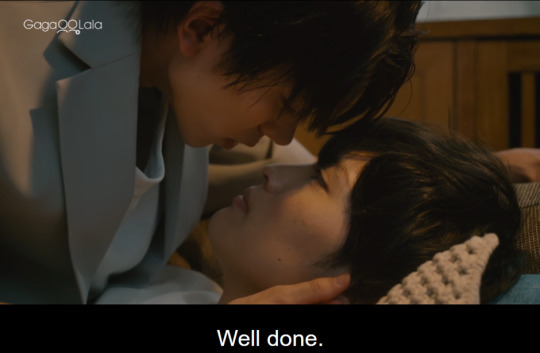
S: よくできました (yoku dekimashita)
This is a formal way of saying “well done”, and if you did well in your work/test in elementary school you’d get a stamp that says just this, or your teacher would draw you a flower. The more elaborate the flower, the better you did. This is the only time thus far that Segasaki has said anything formal to Yoh at all. The sudden shift, and the imagery this phrase evokes – a literal stamp of approval – emphasises not just Segasaki’s approval, but also his role in Yoh’s life (ie, his role as Yoh’s provider, or well, maybe keeper is more accurate. Honestly Dom makes the most sense, but I’m not qualified to talk about that so see @lutawolf posts for more!). We’ll talk more about how both Segasaki and Yoh acknowledge the power dynamic between them in the way the speak in the language analysis post (that will come after this, before Ep 4's).
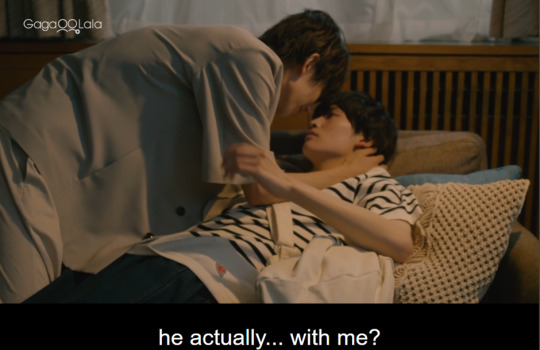
Y: この人、もしかして本当はめっちゃ俺のこと。。。?
Y: This person… could it be that he actually…really is… …me?
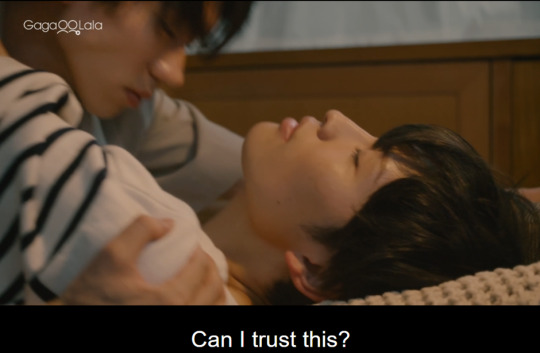
Y: 信じていい?
Y: Is it ok if I believe?
sue me, I think believe and trust carry different nuances.

S: よかったな* (yokatta *na)
S: シーツ買ったからいっぱいできんじゃん、大好きなセックス
S: まあ 残念ながら 相手は大嫌いな俺**ですけど
Original:
S: Great,
S: with more sheets, we can do it more often. Your beloved sex
S: Well, unfortunately the other person is someone you hate
Mine:
S: Isn't this nice*
S: Since you bought more sheets, we can do it a lot - the sex that you love so much
S: Well, unfortunately, your partner is me - who you hate **so much
*The use of "na" here is slightly different from the one earlier - here it is used more for emphasis, and the downward tone carries a hint of mockery.
Again, Segasaki uses the same "the me who you hate" phrasing as he did earlier, emphasizing to Yoh once again that Segasaki is the one Yoh hates. Except here, he also ends off the sentence with "ですけど (desukedo)", and the whole phrasing of this line too, from the word "unfortunately" onwards, just feels business-like. As before, the shift in style gives the statement more weight- Segasaki is really not letting Yoh get away with this line here, and Yoh feels this acutely. The sharpness of the line makes him turn away abruptly in shock and even some anger.
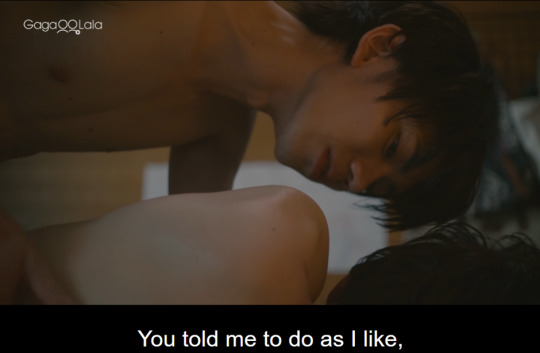
S: お前が好きにしていいって言うんだから
S: 好きにさせてもらうけど *な (na)?
S: お前 本当バーカ
Original:
S: You told me to do as I like,
S: then I’ll do what I want. Okay?
S: You really are… an idiot
Mine:
S: You said I could do as I wish so,
S: I'll gratefully do as I please... *yea?
S: You're...really an idiot
*The "na" used here is similar to the one Segasaki used when telling Yoh to meet back at 5, in that it assumes the listener will agree with the speaker. This time it's not so much used to soften an imperative, but rather, to soften the teasing of the preceeding line - "I'll gratefully do as I please".
The phrase used here is "~させてもらう (~sasete morau)". "Sasete" means "to do" something, with the permission of the other person, and "morau" means "to receive (with thanks/gratefulness)" so together this phrase means that you're going to "do something (with the permission of the other person)", and you are thankful to have received that permission. It's usually used for things like asking your boss "May I please go home early with your kind permission" sorta thing, or telling someone that you "ate a meal someone provided for you that you are grateful for".
So here, Segasaki is pretty much saying "I'll do as I please since you so kindly told me I could, didn't you?" which is why he smirks as he says it.
/////
And we're finally done with EP 3!! Finally! Now I can finally talk about their general speech styles and what it means when they choose to switch between them. Thanks for joining me!
Also, shout out to @eralkfang for tagging me in their meta post - I'm really glad these posts are helpful that way!!
#my personal weatherman#taikan yohou#体感予報#MPW subtitle corrections#mytranslations#this was the episode that made me start this series#some of the subs are wrong in crucial places#and that hurts me#sorry it's late#we'll catch up during this 2wk break before Ep 6#HOW IS THERE A 30 IMAGE LIMIT PER POST
135 notes
·
View notes
Note
I have to thank you for all your posts about My Personal Weatherman. It's so interesting to go in depth about the language!
In the Ep 5 subtitles, can i ask if everything is correct in the scene where Segasaki is drying Yoh's hair? (It seems so since you dont mention it)
I really like Segasaki comforting words and I love this scene so maybe there was a little something...
Thank you so much anyway 👋
Hi hi I'm glad you enjoy it! I didn't actually think too many people would be interested in this much nerdy detail, so I'm a little surprised at the attention but very happy to keep going!
For that scene, the subtitles are close enough 😅 Unfortunately because of tumblr's 30 image post limit (and let's be honest my own tendency to ramble), I have to try and limit the scenes I include in the posts. Essentially, if it isn't outright wrong, or doesn't add/subtract from what we already know about the character as the drama progresses, I might drop a scene just so I have space to talk about another. Also, if I didn't limit myself, I'd probably be redoing every other line (though many of those changes would just come down to personal preference rather than right/wrong 😂) and tbh that's just disrespectful to the original translator 😅 😅
That said, this is a new post, so here you go 😁😁
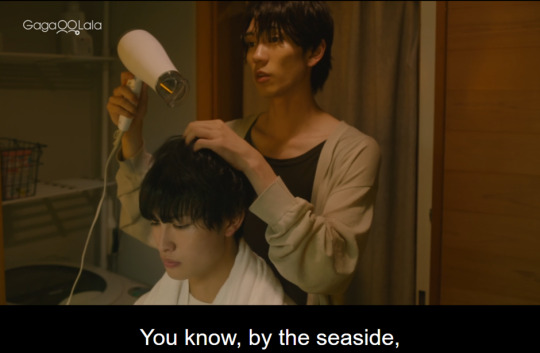
S: 海沿いって 昼と夜とで風向きが逆転するんだよ
S: で 風が切り替わるときに無風になるのを
S: 凪って言うんだけど
S: お前は今その凪な
S: また少ししたら別の風が吹いてくる
S: そういう状態
S: So, along the coast, the direction of the wind reverses from day to night, you know
S: And, when the winds change direction, a windless area of calm forms.
S: We call that “Nagi”, and well,
S: You are that Nagi now.
S: Just a little while more and another wind will come blowing
S: That's how it is.
It's clear just from his tone of voice how gentle Segasaki is being with Yoh here. Unlike his usual short statements, he uses filler words and softer end particles as he explains, and of course, no rough speech at all. The overall effect is that he sounds like he's simply sharing this information with Yoh, without trying to force his opinion on anything, and makes for a really sweet moment.
#my personal weatherman#taikan yohou#体感予報#MPW subtitle corrections#mytranslations#segasaki x yoh#my answers
82 notes
·
View notes
Text
My Personal Weatherman Language Masterlist
[Last Updated 23rd Oct]
Disclaimer: Everyone translates differently for different audiences. This is not meant to disrespect the official translation team in any way because they are subbing for a more general audience and have different pressures, so please don't come at me or them for our different priorities. That said, I'm happy to discuss MY translation choices so please feel free to drop in about any line.
Subtitle Corrections
Including nuances + cultural tidbits
EP 1 || EP 2 || EP 3 || EP 4 || EP 5 || EP 6 || EP 7 || EP 8
Segasaki x Yoh - Language Analysis
Series looking at how the dynamic between Segasaki and Yoh is reflected in the way they speak - specifically, in the way they address each other, and the style shifting, or speech level shifts that they both demonstrate with each other.
Part 1
- What are Speech Levels & Why Shift?
- Segasaki x Yoh: Vertical & Horizontal Distance
aka power dynamics expressed linguistically
Part 2
- Segasaki x Yoh: Shifts in Emotion and Acknowledging Roles
aka reading between (spoken) lines
Part 3 [In Progress]
- Segasaki x Yoh: In the Presence of "Polite Company"
aka Segasaki's "face off" with Man-san
Part 4 [In Progress]
- Segasaki x Yoh: Addressing One Another
aka a look into the various ways to say "you"
Cultural Tidbits
The Importance of Amae in My Personal Weatherman
- Cultural Differences: Independent vs Interdependent Self-Construal
- What is Amae?
- (Briefly - what is sunao, tatemae/honne?)
MPW Timeline (Best Guess)
#my personal weatherman#masterlist#taikan yohou#体感予報#segasaki x yoh#japanese language#sociolinguistics#mytranslations#mpw subtitle corrections#mpw language analysis
140 notes
·
View notes